the war in UKRAINE

hits close to home




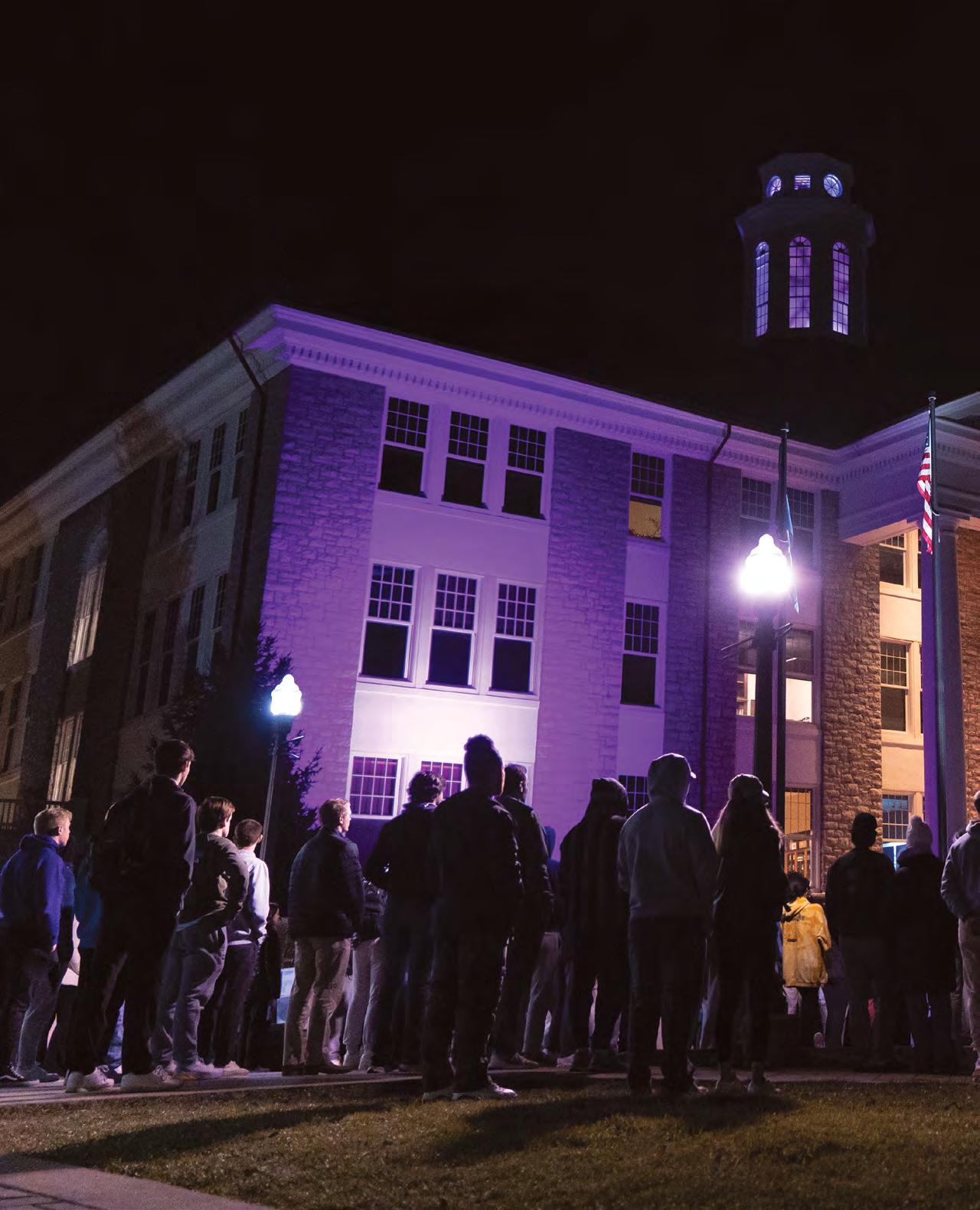
On Feb. 5, sophomores John “Luke” Fergusson, Nicholas Troutman and Joshua Mardis lost their lives in a car crash in West Virginia. The following night, approximately 2,000 members of the Madison community gathered for a candlelight vigil in front of Wilson Hall to remember the students and share happy memories.
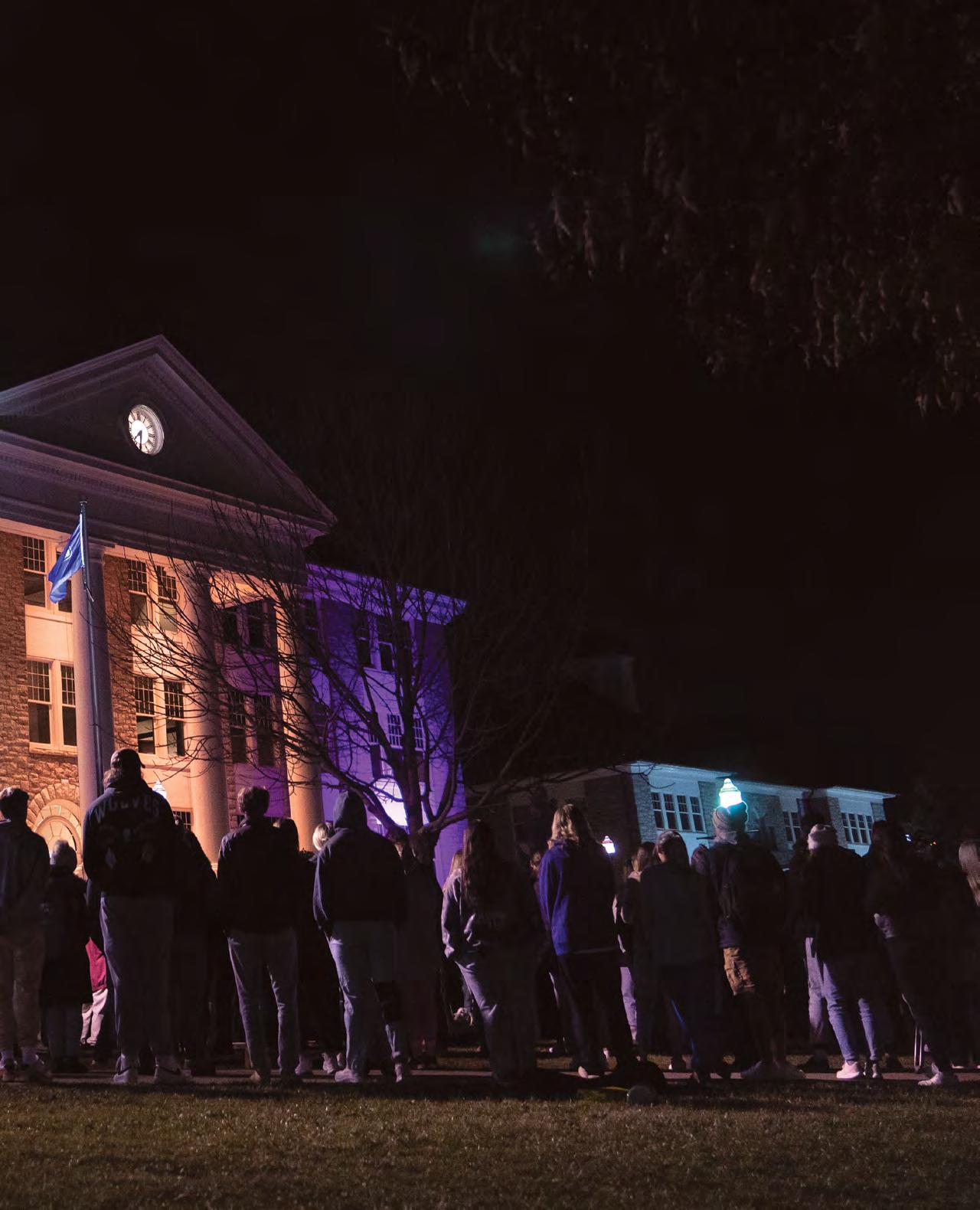
Don’t ghost Duke Dog...
1). SNAP original, high-res photos of JMU in landscape orientation.
https://j.mu/myinfo
I’ve been trying to reach you. Scan the code so you don’t get left out! - Duke Dog
2). SUBMIT your photo(s) June 15–July 31 online at https://j.mu/myphotos
3). WIN! Winning pics will be announced in August and featured in JMU’s 2024 wall calendar.

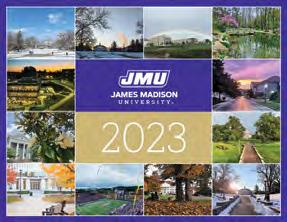
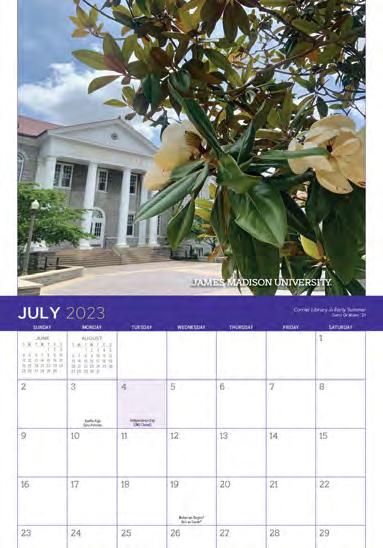
Reaccreditation visit results in zero recommendations
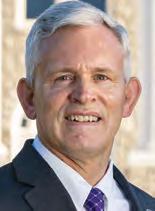
JMU hosted a visiting team from several states in early April to conduct the university’s decennial, on-site review for the Southern Association of Colleges and Schools Commission on Colleges. Every 10 years, the university goes through an extensive reaffirmation of accreditation as mandated by the federal government. One of the key aspects of these “reaffirmation visits” is that they are conducted by colleagues from peer institutions who bring their professional expertise and perspectives to bear in assessing the institution’s compliance with a host of standards covering a wide range of topics, including governance, academic programs, student services, financial and administrative management, distance education, and off-site programs.
SACSCOC is perceived to be the most rigorous and thorough of the regional accrediting bodies. The team on campus in April included senior leaders from some of the most respected institutions in the country. I am delighted to share that at the conclusion of their visit, they indicated they will have zero recommendations in their draft report. Recommendations flag areas in which the institution has failed to demonstrate compliance with various standards. The average number of recommendations for institutions within SACSCOC’s purview is between three and six. There is no more convincing evidence that JMU is well run than receiving zero recommendations from SACSCOC.
Shortly after I arrived at JMU 11 years ago, we had our previous decennial review — and again, the visiting team had zero recommendations! Consecutive reviews of such exceptional quality is a rare feat in higher education for a university of our size and complexity, and it reflects the quality of the work of many people. I want to give a special shoutout to Herb Amato, our SACSCOC liaison, as well as Tina Grace and Cindy Chiarello, who provided tremendous leadership during this extensive review process.
Why does this matter? It matters because we can demonstrate the quality of our institution to peers in the commonwealth and across the country. It matters because it’s proof that we deliver a high return to tuition and taxpayers, and to those who support the university philanthropically.
The visiting team was very complimentary of JMU’s people, campus and programs. We heard time and time again that this is a truly special place in American higher education. That quality is the result of the sustained effort of many people over an extended period of time. One of the keys to that success is our laser-like focus on assessment of outcomes. We track a lot of data in our strategic plan, and we use that information to make improvements in our programs and services.
Speaking of data, a critical and unique aspect of a SACSCOC review is the Quality Enhancement Plan, which is designed to focus on a crosscutting issue of strategic importance to the university. In our previous review, our QEP yielded the program known as Ethical Reasoning in Action, a set of reflective questions and programs still widely used across campus which have become a national model. This time around, our QEP is an Early Student Success System designed to improve student retention and close equity gaps. In recent years, and especially during the pandemic, colleges and universities nationally have encountered challenges in keeping many at-risk students enrolled — and JMU is no exception, even with our comparatively high retention and graduation rates.
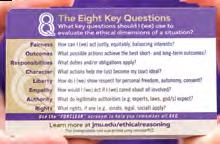
At JMU, we’re all about opening doors, but it’s not enough to open the admissions door — we also need to ensure that students make it through the door of graduation, so that they can enter the working world with a degree in hand. Taking advantage of sophisticated data that we have not previously been able to gather, JMU will identify instances in which students are not meeting their goals (especially early in their JMU careers) and connect them with people, offices and resources on campus, so that they are better empowered and more likely to reach their goals. We will identify barriers to early student success, including barriers that might disproportionately impact students from particular backgrounds or social circumstances, and work to remove such barriers. It’s an ambitious undertaking involving many units across campus, but it’s one more way in which JMU will enhance the quality of the student experience.
We are not a university that rests on its laurels. Innovation and improvement drive us forward every day. So, the next time someone asks you about the quality of JMU, you can accurately report that the institution is meeting and exceeding national benchmarks through an ironclad commitment to excellence.
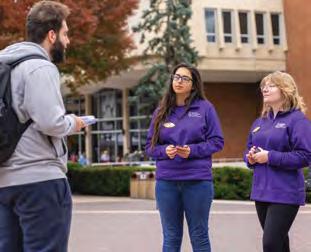 Jonathan R. Alger president, James Madison University
Jonathan R. Alger president, James Madison University
On a midwinter night, the JMU Family mourns the loss of three sophomores
BY OLIVIA SANTOS (’20)3
Another stellar decennial review from SACSCOC
6
7
8
The Madison community stands with the people of Ukraine
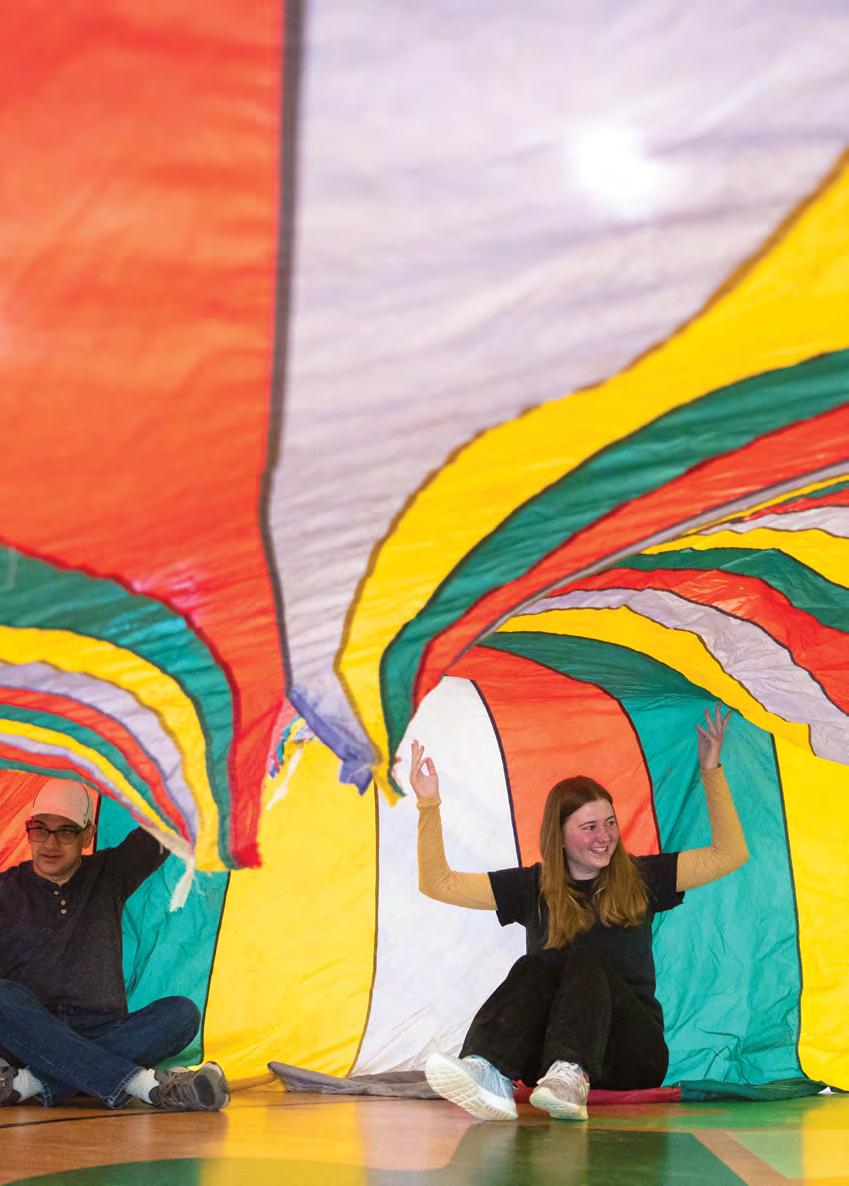 BY JIM HEFFERNAN ( ‘
‘ 17M)
BY JIM HEFFERNAN ( ‘
‘ 17M)
9 Talking Points Rankings and recognitions
10 Advancing Madison
Stewardship luncheon; Reddix family rallies around first-generation students with visionary gift; firstgen students get empowered; a son’s legacy; hands-on learning in the Dominican Republic
16
Celebrating 100-plus years of The Breeze as a fixture of student engagement and news; JMUPD hires mental health professionals; Black alumni set the bar high; accolades for art educator; Dr. Anthony Fauci reflects on pandemic decisions; poetry grant will create a “Furious Flower curriculum”
19 Faculty Focus
Spotlighting professors and administrators through the lenses of scholarship, awards and service
20 JMU Nation
Remembering coaching legend Lou Campanelli; five Dukes inducted into Athletics Hall of Fame; welcoming home the 2023 Sun Belt champion women’s basketball team
Dukes participate in an Alternative Spring Break trip to North Carolina. ASB trips expose students to social issues, and they contribute to weeklong projects with local nonprofit community partners. The alternative breaks are drug- and alcohol-free with an emphasis on group and individual reflection.
36 The power of music to overcome adversity: The Forbes Center hosted the Lviv National Philharmonic Orchestra of Ukraine in February.
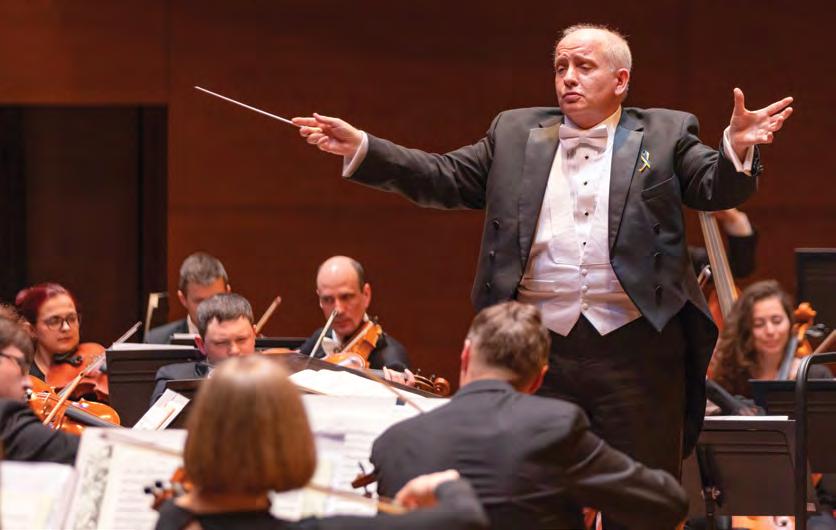
International Ph.D. student making her mark on Madison
BY JIM HEFFERNAN (‘ 96, ’17M)Faculty experts frame the conflict and its effects
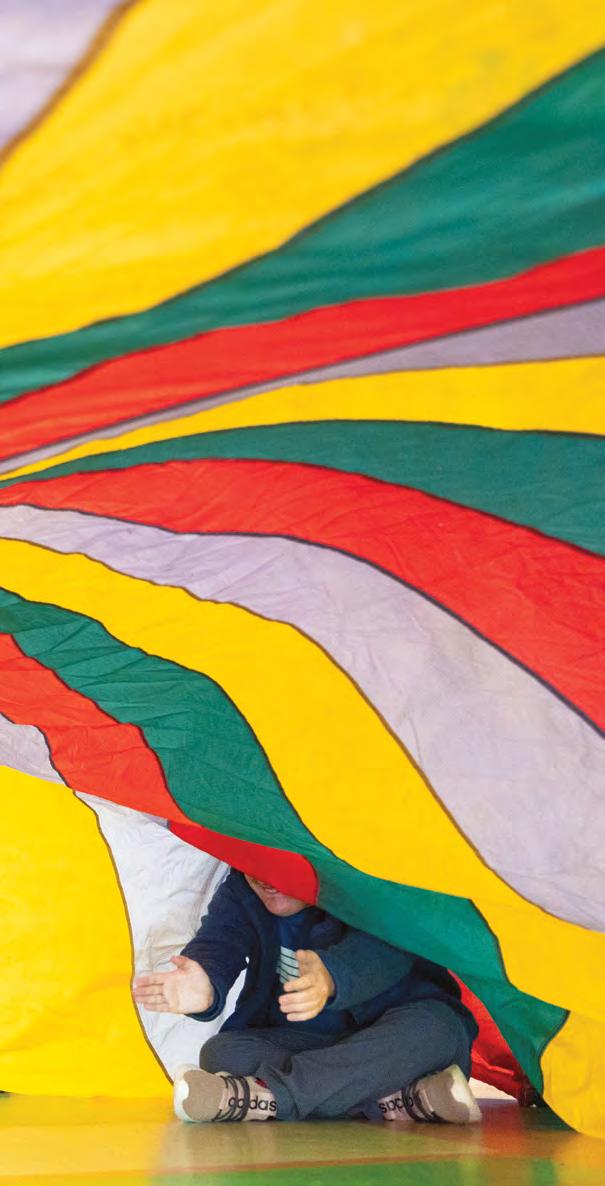 BY DANIEL BEERS AND JOHN HULSEY
BY DANIEL BEERS AND JOHN HULSEY
CISR and its alumni shed light on the use of conventional weapons in the war in Ukraine
BY AMY CROCKETT (‘ 10)Thousands of miles from home, Ukrainian and Russian Dukes weigh in on how the war has impacted them
BY SADIE ARAM (‘ 23)Lviv National Philharmonic Orchestra of Ukraine gives moving concert at Forbes
BY SARAH ECCLESTON (‘ 23)EU policy students examine the conflict from their perch in Florence, Italy
BY FEDERIGO ARGENTIERIProfessor’s climate change research in the Arctic Ocean put on hold
BY JIM HEFFERNAN (‘ 96, ’17M)Local community provides resources for refugees
BY JIM HEFFERNAN (‘ 96 ’17M)The Friendly City is rich in diversity
BY ALLYSON GRIFFIN (‘23)
Distinguished Alumni Award winners; a Madison love story; letter from JMUAA president; couple completes crosscountry trip in electric vehicle; book drive honors elementary school-shooting survivor Abby Zwerner (‘19, ‘20M); jeweler named to Forbes “30 Under 30” list; Mixed Media
Faculty Emeriti Association activities; celebrations (weddings, honors and future Dukes); delegates represent JMU at college president inaugurations; Staff Emeriti Association news; scholarship thank-you letters
Faculty members Daniel Beers and John Hulsey frame the ongoing war in Ukraine and its impact on Europe and beyond, beginning on Page 26.
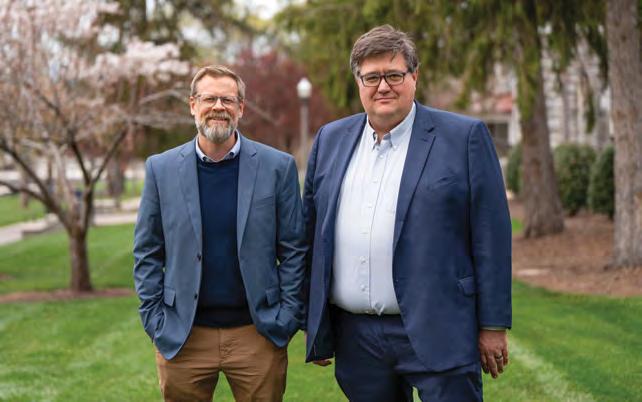
Daniel Beers is an associate professor in the Department of Justice Studies, where he teaches courses on global justice and humanitarian assistance. He is active in a number of local initiatives serving refugees in the Shenandoah Valley, including as a board member of the nonprofit Village to Village. In the 2023-24 academic year, he will be conducting research on the humanitarian response to the Russia-Ukraine war as a Fulbright scholar in Romania.
John Hulsey, professor of political science, teaches courses on comparative politics, post-conflict societies, European integration and empires. He leads a study abroad program to Austria, Bosnia and Croatia. Hulsey’s research focuses on the interaction between political institutions and voting behavior in ethnically divided societies with a focus on the Balkans, as well as broader work on political parties, state capture and the EU accession process. His work has appeared in Democratization, International Peacekeeping, Nationalism and Ethnic Politics, and Communist and Post-Communist Studies
Vol. 46, No.2
BOARD OF VISITORS 2022–23
Maribeth D. Herod (’82), Rector
Christopher Falcon (’03), Vice Rector
Richard “Dickie” Bell
Teresa Edwards (’80)
Jeffrey E. Grass (’92)
Matthew A. Gray-Keeling (’05)
Maria D. Jankowski
Deborah T. Johnson (’78)
John C. Lynch (’91)
Lara P. Major (’92, ’20P)
Suzanne Obenshain
John C. Rothenberger (’88)
Michael Stoltzfus
Craig B. Welburn (’96)
Jack White
Donna L. Harper (’77, ’81M, ’86Ed.S.), Secretary
PRESIDENT
Jonathan R. Alger
PRESIDENT’S CABINET
Jeff Bourne
Director of Athletics
Brian Charette
Special Assistant to the President, Strategic Planning and Engagement
Heather Coltman
Provost and Senior Vice President, Academic Affairs
Mike Davis
Chief of Staff
Arthur Dean I I ( 93 ’99M)
Associate Vice President, Diversity, Equity and Inclusion
Hollie Hall
Dean of Students
Donna Harper (’77,’81M,’86Ed.S.)
Vice President, Access and Enrollment Management
Jack Knight
Senior Assistant Attorney General and University Counsel
Allyson Griffin (’23), a design assistant in University Marketing and Branding, is a senior Graphic Design major. She is involved in many campus organizations, including the Marching Royal Dukes, Phi Kappa Phi and the National Society of Leadership and Success. Griffin hopes to pursue a career in graphic design with an emphasis on branding solutions, typographic treatments and overall layouts. She designed By the Numbers on Page 42.
Cameryn Norris (’22) is the public relations and visual resources specialist in the School of Art, Design and Art History. A native of Richmond, Virginia, Norris graduated in December with a bachelor of fine arts degree in Art, specializing in Printmaking. As an undergraduate, she completed several internships, including JMU X-Labs and the Virginia Museum of Fine Arts. Her feature on SADAH graduate Emily Warden (‘17) can be found on Page 50.
Caroline Serrano (’23), a Graphic Design major, is a design assistant in University Marketing and Branding. When she’s not in the office, you can find her next door at Hugo Kohl Jewelery. She enjoys spending time with family and friends, drawing inspiration from them for her designs. Serrano plans to pursue a career in web and print design. She designed Talking Points on Page 9 and The Breeze photo collage on Page 16.
Nick Langridge (’00,’07M, 14Ph.D )
Vice President, University Advancement
Brent Lewis
Associate Vice President, Diversity, Equity and Inclusion, Student Affairs
Tim Miller (’96, ’00M)
Vice President, Student Affairs
Rudy Molina Jr.
Vice Provost, Student Academic Success and Enrollment Management
Towana Moore
Vice President, Administration and Finance
Elizabeth Oldmixon
Vice Provost, Faculty and Curriculum
Chris Orem
Director, Institutional Research
Andy Perrine (’86)
Associate Vice President, University Marketing & Branding
Caitlyn Read (’10, ’18M)
Director, State Government Relations
Narketta Sparkman-Key
Associate Provost, Diversity, Equity and Inclusion, Academic Affairs
Anthony Tongen
Vice Provost, Research and Scholarship
Mary-Hope Vass (’22M)
Executive Director of Communications and University Spokesperson
VICE PROVOSTS
Linda Cabe Halpern University Programs
Rudy Molina Jr.
Student Academic Success and Enrollment Management
Elizabeth Oldmixon
Faculty and Curriculum
Anthony Tongen
Research and Scholarship
DEANS
Robert Aguirre
Arts and Letters
Bethany Blackstone
Honors
Michael Busing
Business
Rubén Graciani
Visual and Performing Arts
Robert Kolvoord
Integrated Science and Engineering
Mark L’ Esperance Education
Fletcher Linder University Studies
Sharon Lovell (’85) Health and Behavioral Studies
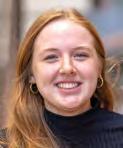
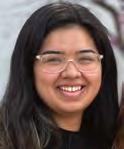
Bethany Nowviskie Libraries
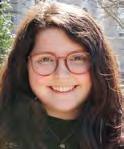
Samantha Prins
Science and Mathematics
Nick Swartz
Professional and Continuing Education (interim)
Linda Thomas The Graduate School
ALUMNI ASSOCIATION
OFFICER
Tripp Hughes (’09) President
PARENTS COUNCIL CHAIRS
Jeff (’90) and Beth Smith (’23P, ’26P)
This is a lovely magazine. I read about every article as soon as it comes. Wow, there are some great students and programs at JMU. GO DUKES!
Bonnie Nelson Mason (’61)
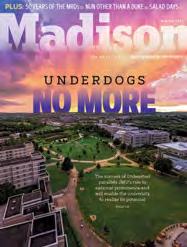
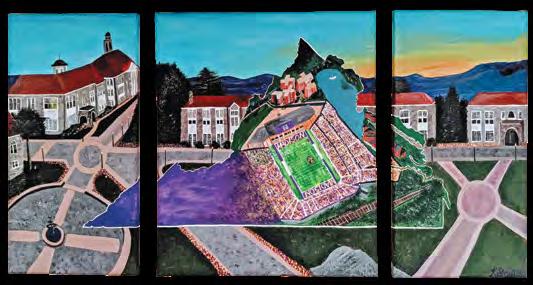
I’m an alumnus from 2006 (B.B.A., International Business) and paint for fun in my free time. I thought you might enjoy this painting I did in 2018!
Kimberly T. Shyu (’06)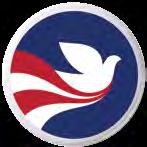
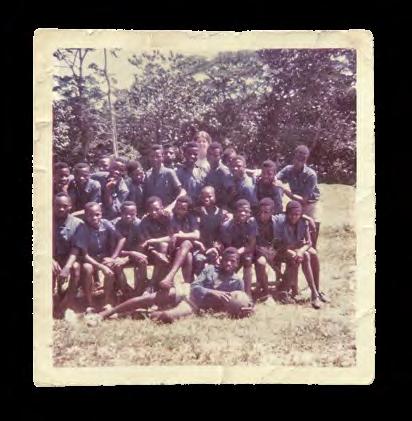
Madison has grown so much since I graduated! It was a pleasure to see another Peace Corps Volunteer, Tristan Kruse, featured in the Winter edition. While our experiences will have some differences, including technology, I’m sure we would share similar experiences and goals. Peace Corps was relatively new when I joined after graduation and I appreciated the support I received from many professors.
Louise Schullery Cox (’67)
Tristan Kruse (’22) was among the first Peace Corps volunteers to serve overseas after the COVID-19 pandemic. He will continue serving in Uganda until October 2024.
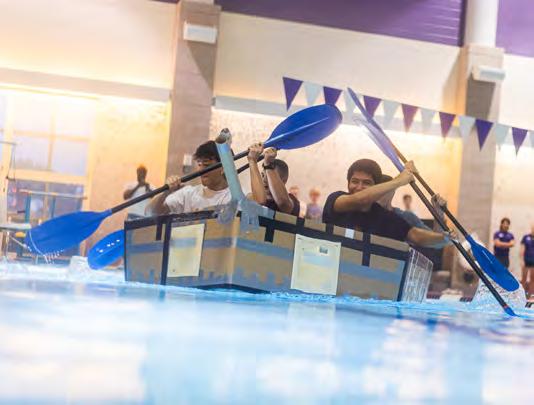
“Keep
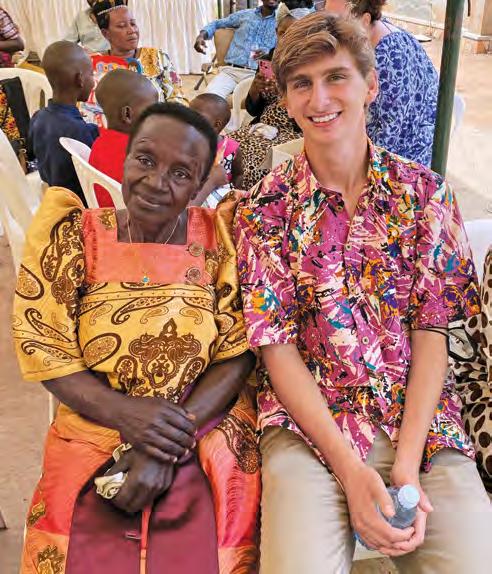
RICK JAMBORSKY (’85)
The Berlin Wall came down when I was in high school.
I remember watching the scene play out on television, with the city’s residents taking picks and sledgehammers to the concrete and barbed-wire partition that had divided them for decades, and uniting in celebration with their new neighbors and fellow citizens. It marked the beginning of the end of the Cold War. The Soviet Union, the vaunted communist regime that had stoked fear in the hearts of Americans for generations and the target of many of my father’s missions aboard a U.S. Navy destroyer in the North Atlantic and off the coast of Cuba, would soon dissolve, and the Iron Curtain in Eastern Europe would rise on a host of newly independent nations.
Among these fledgling former Soviet states was Ukraine, which shares a 1,300-mile border with Russia. It’s a country with a long history of invasion, division and foreign occupation. Ukraine was destroyed by the Mongols in the 13th century and later was part of the Austrian, Russian and Ottoman empires. Following World War I, the upstart Bolsheviks exerted control over the Ukrainian People’s Republic, bringing it under the flag of the Soviet Union. During WWII, the vast region was overrun by Nazi Germany’s push into Russia.
Ukraine’s more recent history is equally unsettled. In 2014, less than 20 years after the country adopted its constitution, then-President Viktor Yanukovych’s decision not to align with the European Union ignited a revolution that led to the formation of a new government. We all know what happened next: Russian President Vladimir Putin set out to bring Ukraine back into the fold, beginning with the Crimean Peninsula on the Black Sea. Then, in February 2022, Putin launched a full-scale invasion of Ukraine, sparking a war that continues to this day. Why do we care so much about a war halfway
around the world? Perhaps it’s because of the resolve Ukraine has shown in the face of Russian aggression and its desire to remain a free, democratic nation. As JMU professors Daniel Beers and John Hulsey write in this issue, regardless of the outcome of the war, the future of Ukraine will be with Europe, not Russia. Perhaps it’s because, as Beers and Hulsey also suggest, the current conflict could give rise to a broader regional war or even another Cold War if China chooses to side with Russia. Or perhaps it’s because of the more than 8 million Ukrainian refugees who have been displaced by the conflict, some of whom have landed here in the Friendly City. Perhaps it’s all of these things.
JMU stands with the people of Ukraine. They are in our hearts, on our campus and part of our community. In this issue, you’ll learn about alumni of JMU’s Center for International Stabilization and Recovery who are working to clear the war-torn nation of landmines and other unexploded ordnance, and stand ready to help with its post-war recovery (Page 32). You’ll hear from Ukrainian faculty members and Russian students on campus for whom the war is personal (Page 34). You’ll hear from members of the Lviv National Philharmonic Orchestra of Ukraine, who gave an inspiring concert at the Forbes Center for the Performing Arts in February (Page 36). You’ll study with a professor in our European Union Policy Studies master’s program who brings Ukraine into the classroom (Page 38). You’ll meet a professor and environmental scientist at JMU whose research in the Arctic Ocean has been put on hold because of the war (Page 40). And you’ll read about how Church World Service of Harrisonburg and a local nonprofit ministry, Village to Village, are helping resettle refugees, including Ukrainians, here in the Valley and put them on the path to self-sufficiency (Page 41).
Dukes help those in need in our communities and around the world. It’s in our DNA.
SPRING/SUMMER 2023
Vol. 46, No.2
EXECUTIVE EDITOR
Jim Heffernan (’96, ’17M)
EDITORS
Amy Crockett (’10)
Josette Keelor
CREATIVE DIRECTOR
Bill Thompson
ART DIRECTOR
Carolyn Windmiller (’81)
ADMINISTRATIVE ASSISTANT
Haley Garnett
DESIGN ASSISTANTS
Allyson Griffin (’23)
Mikey Zagalak
Caroline Serrano (’23)
EDITORIAL ASSISTANTS
Sadie Aram (’23)
Sarah Eccleston (’23)
PHOTO AND VIDEO PRODUCTION
Steve Aderton (’19)
Olivia Santos (’20)
Cody Troyer
Julia Weaver (’21)
ATHLETICS PHOTOGRAPHY
Cathy Kushner (’87)
CAMPUS CONTRIBUTORS
Alumni Relations
Athletics
Donor Relations
Parent Relations
University Marketing & Branding
FOR ADDRESS UPDATES:
Email: advancementgr@jmu.edu or call 1-855-568-4483
CONTACT THE MADISON STAFF:
Email: madisonmag@jmu.edu or call 540-568-2664
Madison magazine, JMU, 127 W. Bruce St., MSC 3610, Harrisonburg, VA 22807
For Class Notes, go to jmu.edu/alumni
Madison is an official publication of James Madison University and is produced by the Division of University Advancement for alumni, parents of JMU students, faculty, staff and friends of JMU.
Editorial office: JMU, 127 W. Bruce St., MSC 3610, Harrisonburg, VA 22807
NOTICE OF NONDISCRIMINATION AND EQUAL OPPORTUNITY:
Jim Heffernan (’96, ’17M) Executive Editor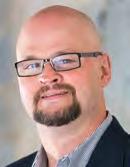
James Madison University does not discriminate on the basis of age, disability, race or color, height or weight, national or ethnic origin, political affiliation or belief, religion, sex, sexual orientation, gender identity or expression, veteran status, parental status (including pregnancy), marital status, family medical or genetic information in its employment, educational programs, activities and admissions. JMU complies with all applicable federal and state laws regarding nondiscrimination, affirmative action and anti-harassment. JMU prohibits sexual and gender-based harassment, including sexual assault, and other forms of interpersonal violence. The responsibility for overall coordination, monitoring and information dissemination about JMU’s program of equal opportunity, nondiscrimination, Title IX and affirmative action is assigned to the Office of Equal Opportunity & Title IX. Inquiries or complaints may be directed to the Office of Equal Opportunity & Title IX: Amy Sirocky-Meck, Title IX Coordinator, 540-568-5219, www.jmu.edu/oeo, oeo@jmu.edu
(REVISED JANUARY 2020)
Dukes help those in need in our communities and around the world. It’s in our DNA.
As loyal Madison readers, you are also brand ambassadors for James Madison University. This page features some of JMU’s recent rankings and recognitions. Use it to brag about JMU and help spread the word!
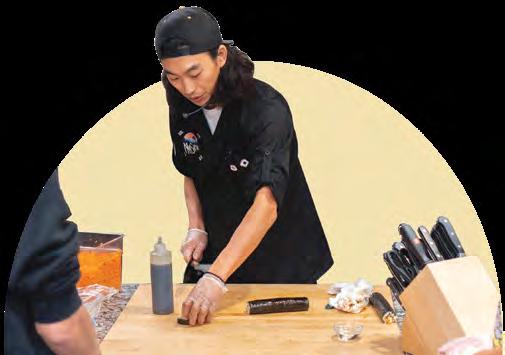
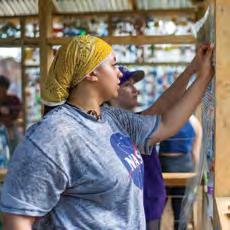
In February, the U.S. Department of State’s Bureau of Educational and Cultural Affairs named JMU a Fulbright Top Producing Institution for U.S. Students for the 2022-23 academic year. This recognition is given to U.S. colleges and universities that received the highest number of applicants selected for the Fulbright U.S. Student Program.
Eleven JMU students and alumni were offered entry to the program this year, and seven accepted. Grantees are studying in the Czech Republic, Germany, Mozambique, Spain and Taiwan.
The Fulbright Program was established more than 75 years ago to increase mutual understanding between the people of the U.S. and other countries. Fulbright alumni work to make a positive impact on their communities, sectors and the world, and have included 41 heads of state or government, 62 Nobel laureates, 89 Pulitzer Prize winners, 78 MacArthur Fellows, and countless leaders and change-makers who carry forward the Fulbright mission of enhancing mutual understanding.
The Fulbright competition is administered at JMU through the Office of Student Awards, Initiatives and Research.

For more information, visit https://fulbright program.org.
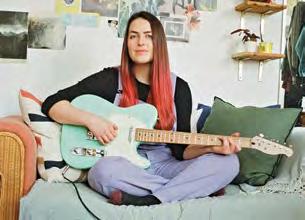

The organization used data around financial aid awards, the quality of education, faculty, campus resources and more.
40%
of students study abroad
400-600 students each year participate in Alternative Spring Break and weekend breaks.
For a complete list of all university social media links, please visit j.mu/socialmedia
JamesMadisonUniversity
@JamesMadisonUniversity
IMPACT³, JMU’s customized leadership development program for high-achieving leaders, won a national award from the American Association of State Colleges and Universities. The program was recognized with the 2022 AASCU Excellence and Innovation Award for Leadership Development and Diversity. The awards committee cited the program’s “outstanding results and potential to influence and serve as a model for other institutions.”
With a focus on crossdisciplinary approaches, IMPACT³ helps overcome silos that exist on campus and reinforce the importance of collaboration, one of JMU’s core values.
When IMPACT³ was founded in 2003, there was no other model in the U.S. like it — a yearlong, executive-level, cohort-based, leadership development program mixing academic instructional faculty and administrators.
James Madison University @JamesMadisonU @JMU Madison app jmu.edu/madisonmagazine“For years, it has served as a model for our campus community and the way we talk about leadership in higher education.”
— JONATHAN R. ALGER , president
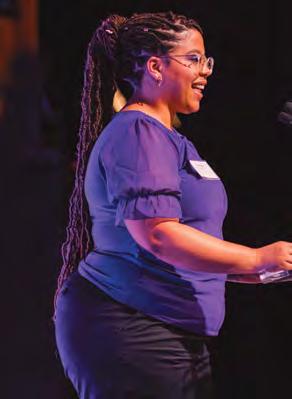
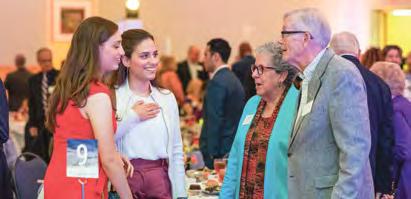
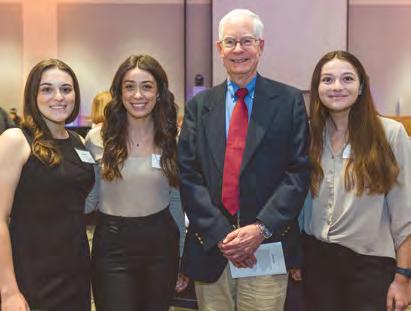
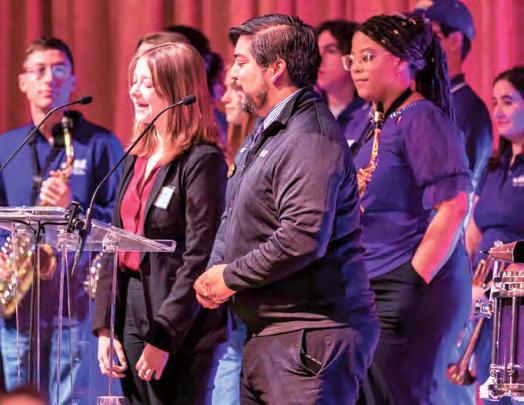
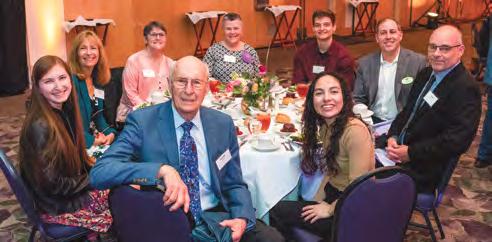
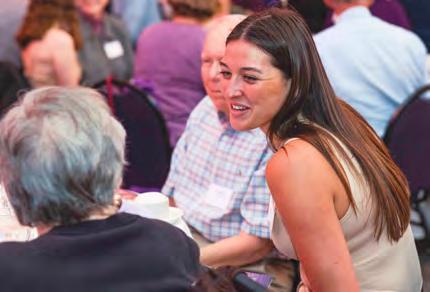
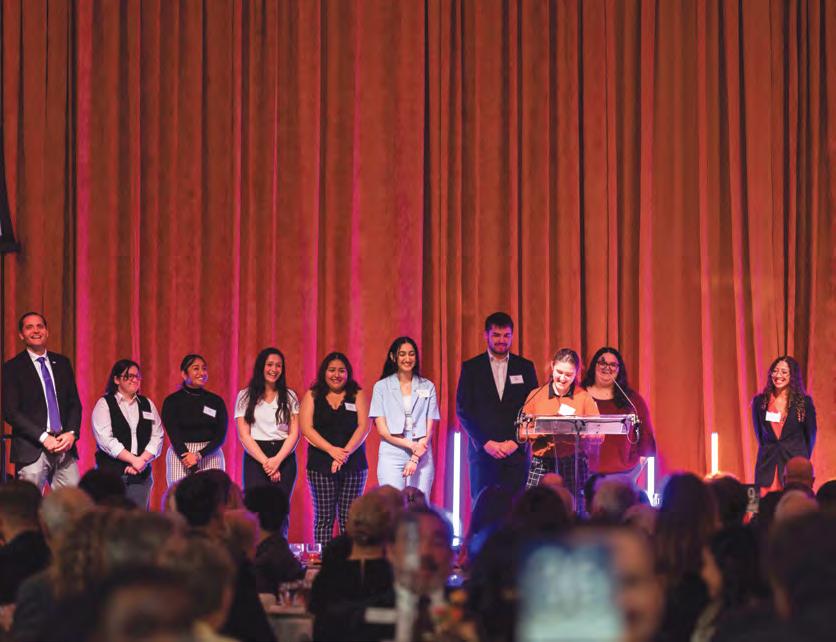
(Above): Turning down a full scholarship to Princeton, Deaquan Nichols (’23) said he chose JMU for the relationships with faculty mentors and individualized research opportunities.
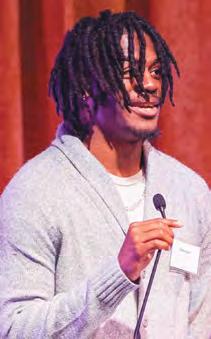
“Growing up I didn’t have much exposure to college and what it entailed. I just knew I wanted to be there.”
— JANAIYA HILL,(left) first-generation
student(Above): The first students from JMU’s groundbreaking Valley Scholars Program, including speaker Kaitlyn Good (’23), graduated in May, supported by 1,435 donors. (Above): Marking the 50th anniversary of the Marching Royal Dukes, drum major Katie Presutto (’23) and Assistant Band Director Nieves Villaseñor share highlights of JMU’s largest student organization. (Above): The volleyball team, including sophomore Annie Smith, was recognized for winning the school’s first Sun Belt championship. (Left): Yasmin and Juana Al Anbari meet professor emeritus Jim Benedict and his wife, Joyce.
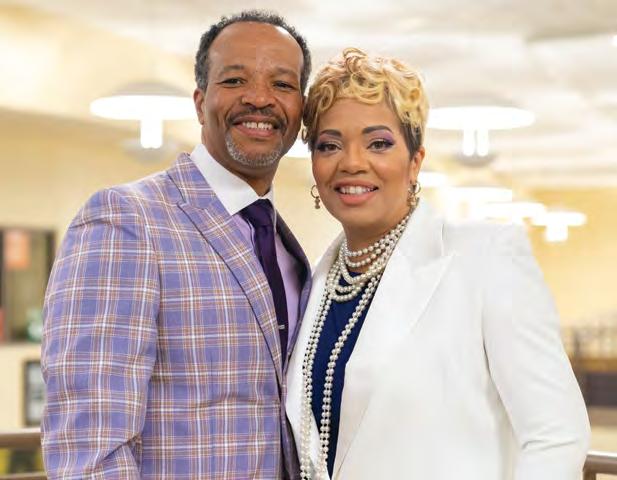
their
By Jamie MarshIn February, a diverse group of JMU luminaries gathered outside the new Reddix Center for First Generation Students Among them were dozens of enthusiastic former classmates of Pete (’88) and Angela (’90) Reddix, the visionary couple championing JMU as a home for first-generation and African American students.
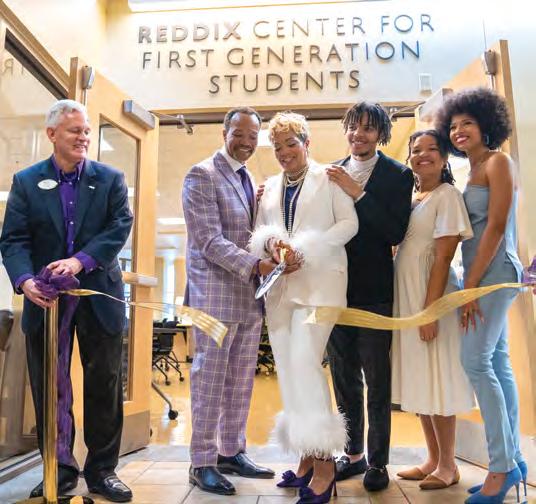
“I found my voice on these hills,” Angela told the crowd that she affectionately referred to as her village. “I came to JMU as timid Angie; I left determined Angela. I came as a whisper; I left as a roar.”
Today, Reddix is known for using that voice. She’s a best-selling author, TEDx speaker, social media influencer and award-winning entrepreneur holding a doctorate in Business Administration.
As the founder of ARDX, a Norfolk-based health management
and technology consulting firm, she’s secured more than $200 million in government contracts while advocating for patient equity and access.
Having met in The Union in 1986, Pete and Angela Reddix say JMU still feels like home. Now, they’re helping current students feel the same.
Now, Angela and Pete have returned to the campus where they first met to announce their six-figure investment in the lives of future Dukes. The gift names the Reddix Center and also establishes the Reddix Centennial Scholarship Endowment
After the ribbon-cutting, the Reddixes sat down with cameras rolling for an interview.
Jamie Marsh: President Jonathan R. Alger has challenged the university to become a recognized home for first-generation students, and the Reddix Center for First Generation Students is now the physical epicenter of that effort. What impact do you hope to make here?
Pete: We hope to leave a powerful mark on a university that has left such a powerful mark on our lives. May this center be a representation that, regardless of where you start, we can all reach impossible dreams.
Watch the Reddix interview and the center’s ribbon-cutting ceremony: https://j.mu/rdx
Angela: Sometimes a song can capture a sentiment for me. With this gift, I’m thinking of Beyonce’s lyrics: “I want to leave my footprints on the sands of time. Know there was something that, something that I left behind.” Every first-generation student who steps on the soil of James Madison University will know that I was here, too. I am leaving a footprint for them to follow. With this gift — both the center and the scholarship endowment — we are creating history, leaving footprints, changing lives.
Marsh: How would you describe the mark JMU left on you?
The Reddixes share
thoughts on first-generation survival, an important change they’d like to see on campus and the special magic that is JMU
Angela: I’ve said this is where I found my voice. Well, finding your voice, your confidence, is half the battle in life. My social skills, my interpersonal skills, my relationship-building skills, those are what eclipse everything else when I’m sitting in a boardroom. I’ve had quite a rich career where I was typically the youngest person, the only woman and definitely the only African American in most positions. I credit JMU for first giving me the opportunity to feel comfortable with whoever is at that table.
Pete: JMU is home. This is where we discovered ourselves. This is where we discovered another family. When we come back here, we feel 20 again. Every time.
Marsh: Pete, you were a firstgeneration student yourself. What was it like?
Pete: Coming from a big city full of diversity, JMU was a shock. My parents were postal employees who told me I was going to college. They cashed in U.S. Savings Bonds to help me, but no one in my family knew how to be a college student. My first memories are of a roommate who did not look like me and people walking around without shirts on. Where I was from, that was unheard of. I saw buffalo on a hill down the road in this green, green grass. OK, I thought, so there are apparently buffalo in Virginia. It felt like a foreign land. I stumbled, I fell, I changed my major, and it took a little longer than it should have because everything was so new to me.
Marsh: How did you find your footing? What is your advice for first-gen students going through the same thing?
Pete: Find your new family. Make friends. I had to find my new village. In the ’80s, we had the Student Union. That’s where folks who looked like me came to communicate and learn from each other. We had Forest Parker [former assistant director of Admissions] who was focused on Black recruitment and retention, and I was able to make friends and find mentorship. That’s where I met Angela, both of us going in and out of his office.
Angela: I was not first-gen, but I was very timid. I had been isolated in high school because I was the only African American in all of my classes. I was very much trying to
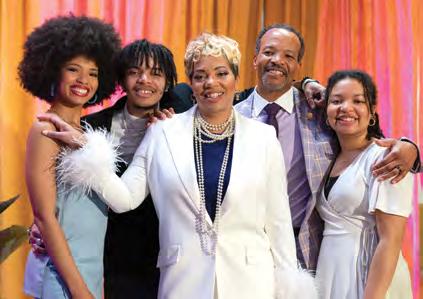
assimilate just to survive. But then I became involved with JMU’s Black Student Alliance The BSA was very positive, trying to make people feel like they mattered and feel they were seen. That’s when I started using my voice and realizing that others were listening. I became a leader, the BSA president and a kind of spokesperson for the African American students. I saw that I could get people to do things, and I was determined to not be silent any longer.
Marsh: Now you’re bringing that voice back to JMU. Why?
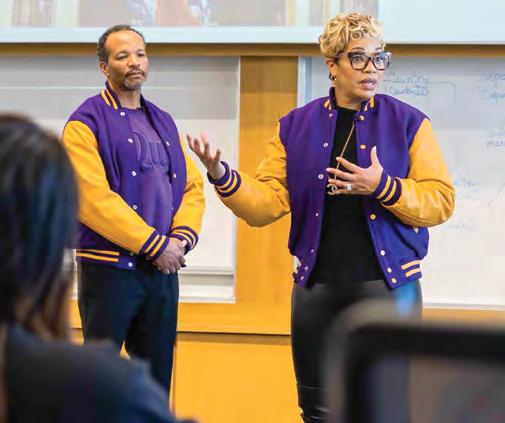
Angela: I’ve always been fond of JMU, and I’ve told the story
about JMU. This university is teaching people both in and outside of the classroom. I see individuals coming to [ARDX] who are afraid of networking and don’t have the ability to network. They fear innovation because they fear rejection. JMU helps young people understand that networking is just having a conversation, and innovation is just having an idea. Good professors recognize that it is about more than reading and books; it’s about helping the students learn to take risks, use their voices, problemsolve, analyze and assess data, and make new decisions.
Marsh: What are your hopes for the next generation of Dukes?
Pete: JMU is like home for me. And JMU should feel like home for everybody. I’d like to come back here and see more people who look like me in different departments, at different levels of the administration and everyday students out there on the Quad. Everywhere. As JMU continues working on diversity, I’d like to see more African American students on this campus, feeling that they belong and feeling encouraged to find their voices.
Angela: To all my fellow Dukes out there — I want to challenge you to leave your footprints here, too. We all come from something magical. But the JMU magic that we all love can only be as bright and fantastic as we collectively make it. Show up in some way. Bring your time, your talent, your treasure. Let’s leave footprints to show we were here.
“JMU is home. This is where we discovered ourselves. This is where we discovered another family.”
— PETE REDDIX (’88)(Above): The Reddixes speak to classes in the College of Business. (Right): Reddix family (L-R) Anyssa, Ahmon, Angela, Pete, Ayla
At JMU, it’s no accident that firstgeneration students get connected.
“The idea that we’re going to support you, we’re going to be helpful and encouraging — those components naturally exist all across this campus,” said Shaun Mooney, executive director of the new Reddix Center for First Generation Students. “The key to our success for a lot of first-generation students is to intentionally connect them to resources and programs here that can benefit them that they may not already know about, and there are a lot of people here — faculty, staff and students — who truly want the best for students.”
Even JMU’s definition of a first-generation student goes beyond the traditional one.
“The technical definition of first-generation is that your parents or guardians did not graduate from a four-year institution,” Mooney said. “However, we at the Reddix Center welcome any student with limited exposure to or knowledge of the traditional college experience. In other words, we know that we have 12% of our population that meets the standard definition, and then there’s another percentage of students here who just need the community to hear them when they say, ‘How does this place work?’ and ‘What are the things I need to know?’ — and we’re here for those students, too.”
Pointing first-generation students to careerplanning courses is often a great step in helping them connect their own dots. Another example
of assistance involves connecting first-generation students with JMU’s plethora of excellent mentoring programs, including at the University Recreation Center, Office of Orientation and Transition, and the Madison Hispanic Caucus.
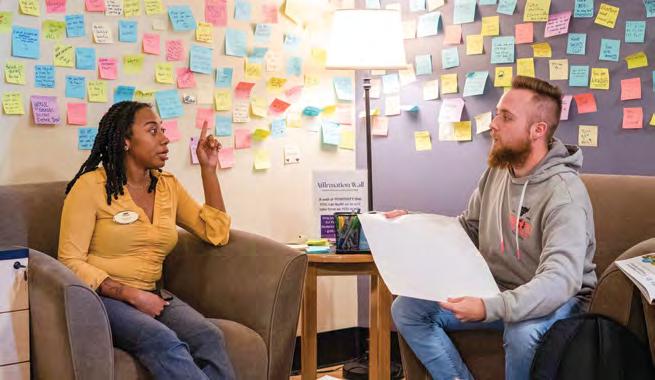
When it comes to caring for first-generation students, flexibility is paramount.
“First-generation students are not monolithic,” Mooney said. “It is not a one-size-fitsall population here, and to do this well and right, we have to be willing to say, ‘We’re serving a microcosm of the entire student body here, so what are these first-generation students’ most specific, individualized needs?’”
Reddix Center programming includes workshops run in concert with the University Career Center and a partnership with TORCH, the first-generation student group that stands for Together Obtaining Resources for College Help.
“For me,” Mooney said, “I’m trying to look at each one of our students and say, ‘I recognize that you’re first-gen, and I also think of you as a human being with lots of interests, so let’s explore all of that and then we can better see what we have here at JMU for you.’”
For more of this story, go to https://j.mu/reddix
After their son’s tragic passing in 1997, JMU parents Jane and Martin Davis extended his legacy through scholarships. Now, more than 25 recipients of the Jonathan D. Davis (’81, ’85M) Scholarship are mental health care providers trained in suicide prevention.
On Feb. 3, Jane Davis visited campus to meet Eileen Clinton (’24M) and Jinok Lim (’23M), the latest beneficiaries of the scholarship. Every year, it is awarded to degree-seeking graduate students enrolled in JMU’s Department of Graduate Psychology and Counseling who have a particular interest in suicide prevention or Post-Traumatic Stress Disorder.
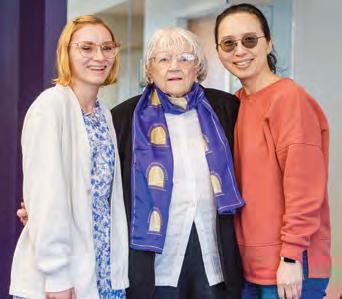
“I became interested in counseling when close friends of mine from the LGBTQ community expressed suicidal ideation,” Clinton said. “I saw how hard it can be, sometimes even harder in rural areas like this, and I feel compelled to help.”
Lim, a doctoral student, shares Clinton’s passion for marginalized populations. “I focus primarily on immigrants because I see the need and can relate to them. I am from Korea and see Korean people in the U.S. with mental health issues, but there are few Korean counselors, or even Asian counselors, who understand the culture.”
Read more about Davis and his parents’ gift: https://j.mu/davis
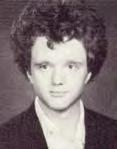
find seamless connections to what they need
The Reddix Center is a safe space for learning about JMU resources.
“The key to our success ... is to intentionally connect them to resources and programs here that can benefit them.”
— SHAUN MOONEY, executive director
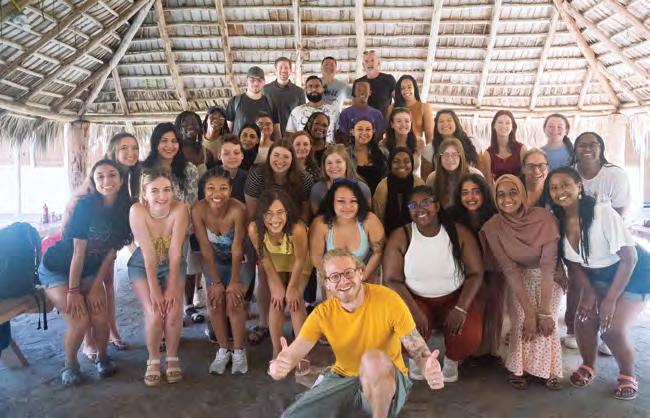
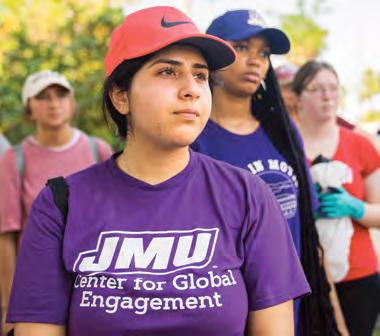
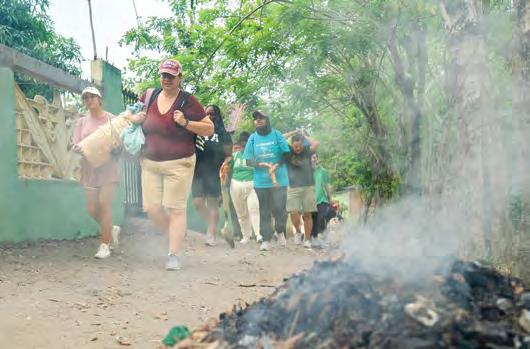
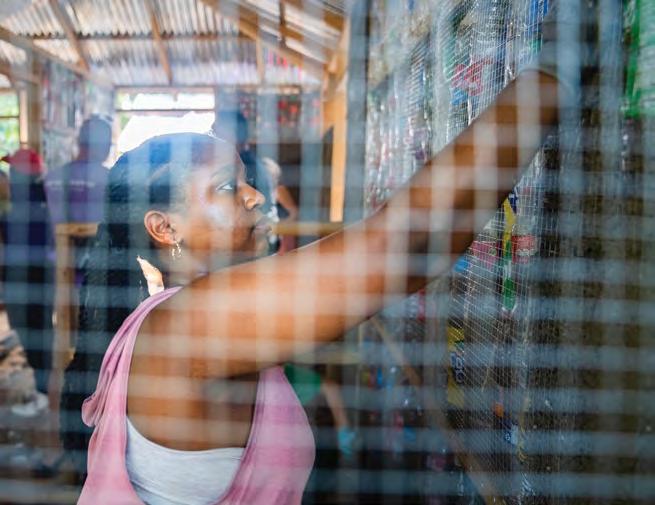
The Honors College, Valley Scholars and Centennial Scholars sent 29 students to the Dominican Republic March 11-18. About half of the group were first-generation students, many of whom had never traveled outside of the U.S. The trip, led by Honors College Assistant Dean Felix Wang and Associate Dean Fawn-Amber Montoya, was an extension of two Honors seminars offered in the spring, Global Citizenship and Latinx Voices.
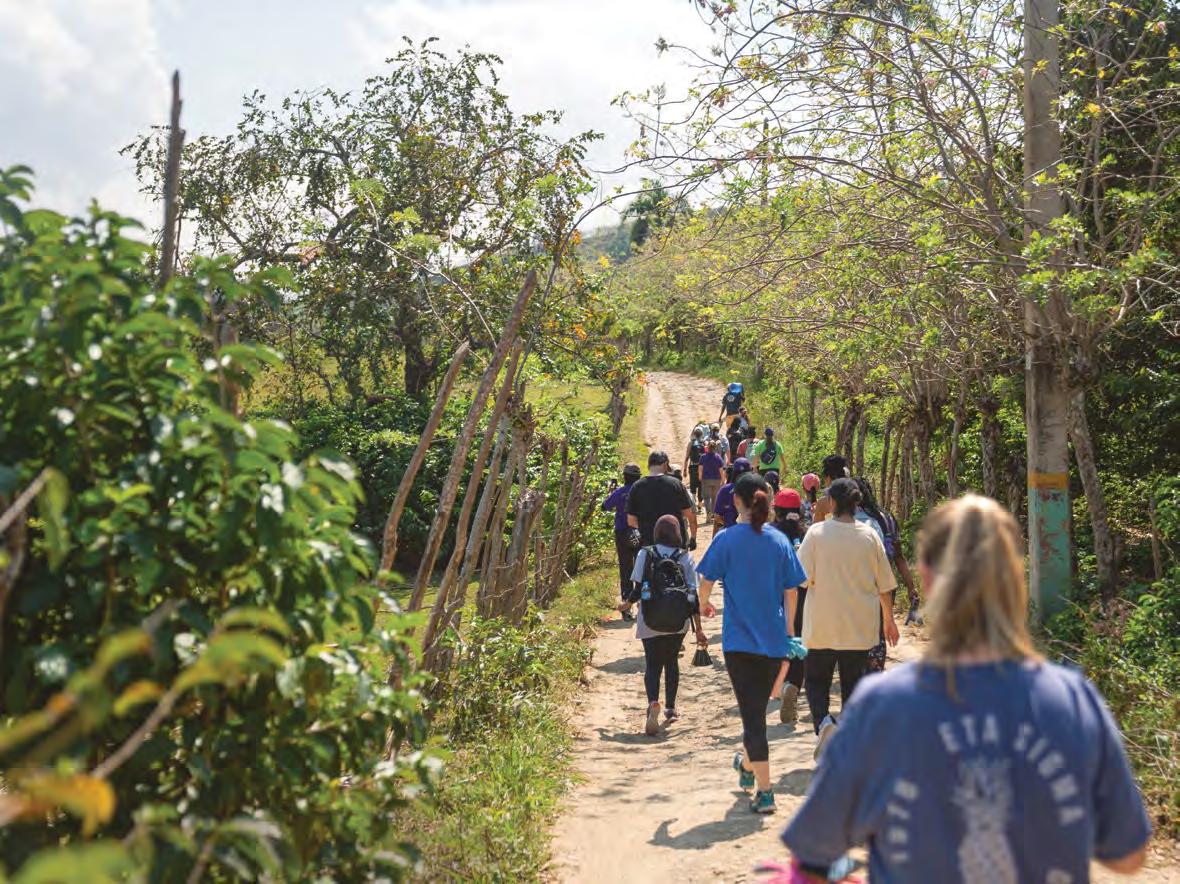
For more on the trip, including a video, download the Madison app.

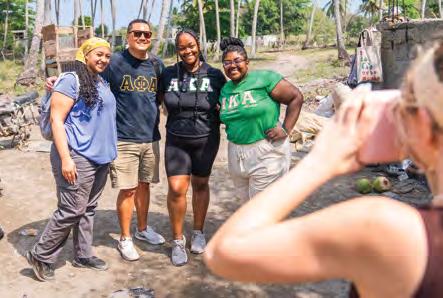

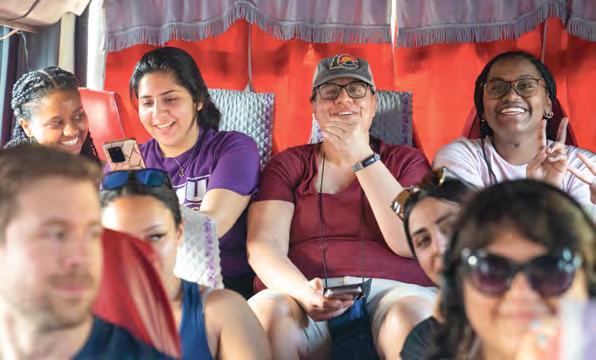
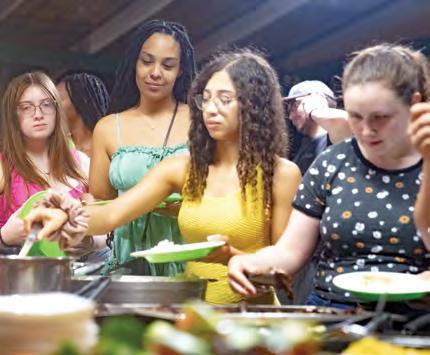
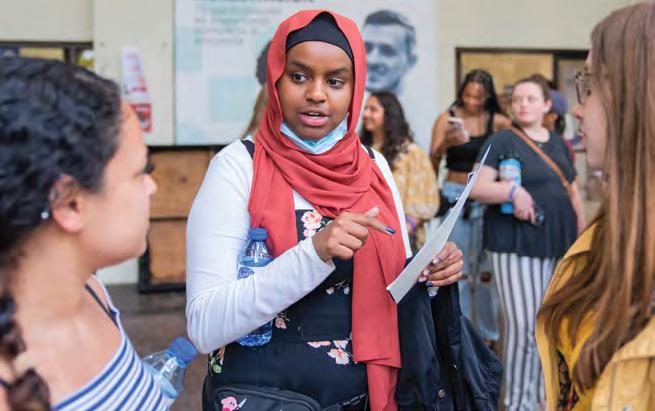
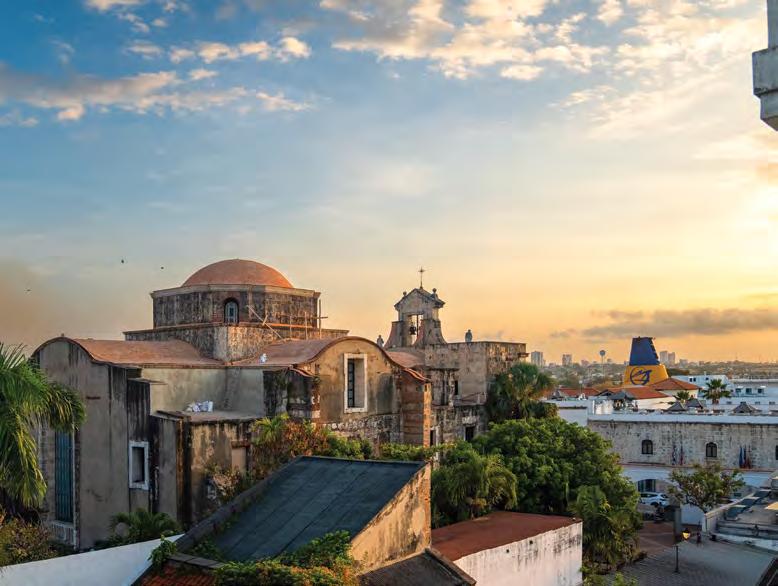

“It was really amazing to be with such a diverse group. It just felt so empowering.”
— SHUKRANA SHUKRULLA, student
The Breeze celebrates 100 years of JMU history
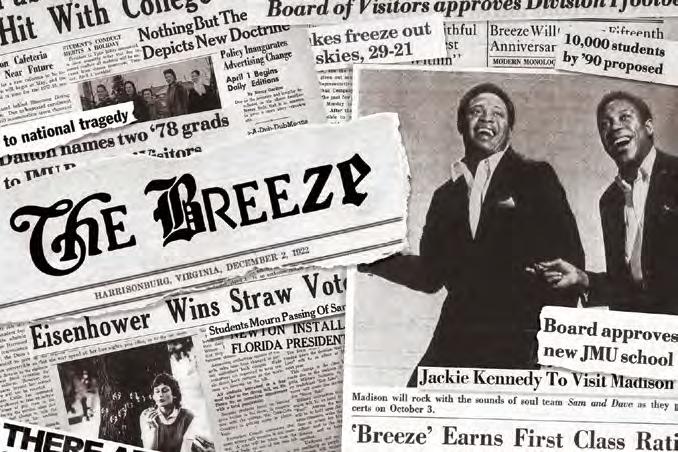
For more, download the Madison app at https:// j.mu/madapp.
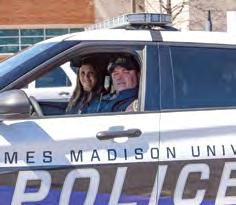
With the help of a $350,000 grant from the Department of Justice, the JMU Police Department initiated a new program this semester to incorporate mental health professionals as co-responders to emergency calls.
The department hired mental health professionals to work alongside law-enforcement officers as they respond to calls involving
individuals undergoing mental health crises. “Effective mental health response requires assistance from proven professionals,” said Anthony Matos, chief of police. “This program will ... address the immediate needs of an individual in crisis, and then open new avenues to follow up and provide wrap-around services.”
Grant funding runs through August 2024.
— Ginny CramerT“Some of the people I met there, I may not talk to them all the time, but there’s a bond that never ceases to exist.”
— COURTNEY RUKAN (‘10), The Washington PostA JMU police officer and counselor team up on the first day of the program launch.
Gilbert Bland (’77) and Angela D. Reddix (’90) were among a group of 17 inaugural Virginia Black Business Leaders Award winners. The list, chosen by Virginia Business and published in its February issue in honor of Black History Month, recognized some of the state’s most accomplished Black executives.
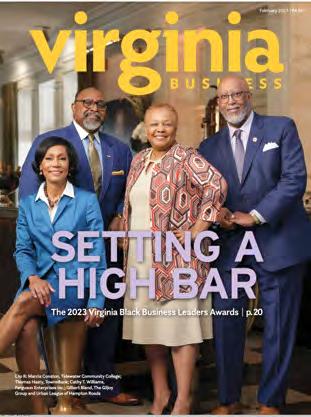
Bland, president and CEO of the Urban League of Hampton Roads, was one of four members of the publication’s first Black Business Leaders Hall of Fame class.
A Madison College graduate who majored in Accounting and Economics, Bland got his start in commercial banking and was a vice president at the largest Black-owned bank in the country. In the 1980s, he became an entrepreneur, founding The GilJoy Group, which operated more than 70 restaurants for three decades.
Bland has served on boards of organizations ranging from Sentara Healthcare and the Virginia Chamber of Commerce to the Virginia Museum of Fine Arts and the Virginia African American Advisory Board. When the COVID-19 pandemic took hold in Virginia, he encouraged testing of underserved communities around the state, including Harrisonburg, as a member of Sentara’s Health Equities Workgroup. He’s also a former chairman of the State Council of Higher Education for Virginia and a former member of the JMU Foundation Board of Trustees.
At Madison, he was a member of Omicron Delta Epsilon; ran track; and helped establish the Black Student Alliance.
Reddix, who majored in Marketing, is founder, president and CEO of ARDX, an award-winning health care management and information technology consulting firm dedicated to improving the lives of our nation’s most vulnerable populations.
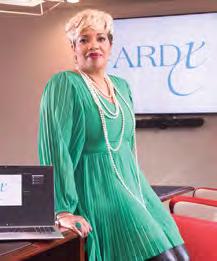
She is also the founder of the Norfolk, Virginia-based nonprofit, Envision Lead Grow, which helps aspiring girls — especially those of color — gain the skills and dedication needed to accomplish their dreams through entrepreneurship.
During the COVID-19 crisis, Reddix supported female entrepreneurs through The Reddix Rules Fund. This grant assisted small, women-owned businesses that were not fortunate enough to receive benefits from the Payroll Protection Plan and denied selfemployment benefits.
Her new book is titled She’s Got the Power: Women Building Wealth Through Financial Literacy and Sisterhood
Reddix is a former member of the Women for Madison Executive Advisory Council and spoke at the 2019 Women Who Amaze Summit. She was also a guest panelist for a February 2021 Madison Vision Series event featuring successful Black JMU alumni.
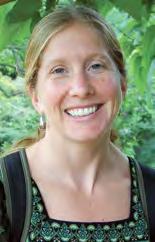
The Virginia Art Education Association named Karin Tollefson-Hall, a professor of art education, its art educator of the year.
“Karin is as remarkable an art educator as any I have worked with,” said Roger Tomhave, professor emeritus of art education. “She has taken the best of our storied past, taken on the most challenging issues of our current and post-pandemic art teacher training, and taken JMU art education into a bright future with calm, knowledgeable and wise decisionmaking. I consider her among the best that our profession has to offer.”
Tollefson-Hall was recognized for her willingness to fill positions or volunteer wherever help was needed. Among her outstanding accomplishments were mentoring the 2016 outstanding national student chapter and stepping up to fill in the many chair positions for the 2019 VAEA conference at Hotel Madison and Shenandoah Valley Conference Center.
Tollefson-Hall said being an art educator can be a lonely position because most schools, especially at the K-12 level, only have one art teacher. VAEA conferences, she said, enable art educators to connect with others in the field, including former students.
Since 2009, Tollefson-Hall has enjoyed watching her students blossom as art educators. “My job and my passion is to prepare individuals to be highly qualified visual art teachers,” Tollefson-Hall said. “I am honored to spend my time doing all that I can to prepare future teachers to be as successful as possible in their K-12 art classrooms as they influence the lives of children across our state every day.”
— Madelyn Saadah“I consider her among the best that our profession has to offer.”
— ROGER TOMHAVE , professor emeritus of art education
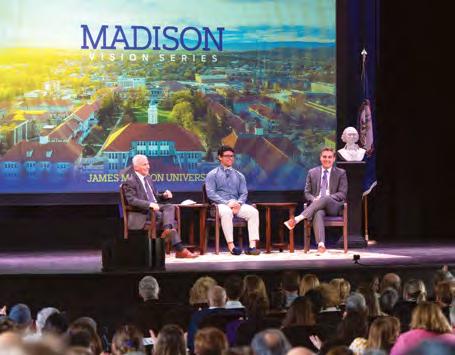
More than three years after the start of the COVID-19 pandemic, Dr. Anthony Fauci, one of the country’s leading experts on infectious diseases, stands by the U.S. government’s decision to shut down schools, businesses and institutions in the hope of suppressing the spread of illness before it overwhelmed the hospital system.
Watching how Italy’s hospitals were on the verge of being overrun by an influx of COVID19 patients, U.S. officials weighed the risks of our hospitals seeing the same outcome and, in a
worst-case scenario, having to choose between which patients live and which ones die.
“That is something you never, ever want to be in a position to have to do as a physician, and that was going on in Europe,” Fauci said during a town hall session with JMU alumnus and CNN weekend anchor Jim Acosta (’93) at Wilson Hall.
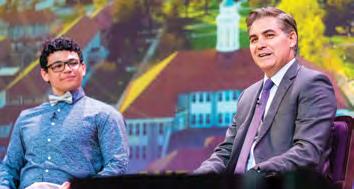
Recalling those early days of 2020, Fauci said it wasn’t easy to be the one to encourage former President Donald Trump to shut down schools and businesses, while instructing Americans to stay home for 15 days and knowing that another 30 days would likely follow. But it was necessary.
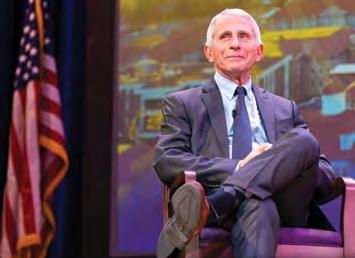
“There were economic consequences of that,” he said. “You don’t want to keep kids out of school, but you have to make a balance. … The initial decision, by anybody’s reckoning, was the right decision. Otherwise we would have had overrunning of our hospital system. … And to his credit, we convinced the president, and he agreed that that’s what we were going to do.”
During the nearly 90-minute session, Acosta and Hugh McFarlane, an Honors student in the College of Health and Behavioral Studies who plans to pursue a career in medicine, questioned Fauci about his nearly 40 years as director of the National Institute of Allergy and Infectious Diseases, including his role as key adviser to seven U.S. presidents on global HIV/AIDS issues, and initiatives to bolster public health preparedness against emerging infectious disease threats, such as Zika, Ebola, pandemic influenza and various coronaviruses.
The success story of COVID-19, Fauci said, was that the U.S. government was able to invest in the biomedical research to create a vaccine that exceeded any previous expectation of being developed, tested and released to the public in about 11 months, when typically it would have taken seven years.
One of the tragedies of COVID-19, he said, is the public health response, which has led to widespread false information online and by word-of-mouth.
“Disinformation and misinformation is the bona fide enemy of public health,” Fauci said. “We should embrace differences in opinion. … There are better angels in each of us.”
— Josette KeelorFor more of this town hall event, visit https://j.mu/fauci
The Furious Flower Poetry Center has received a $50,000 Poetry Foundation Equity in Verse grant to create and distribute educational curricula across the country.
The grant, spearheaded by the Furious Flower Poetry Center Advisory Board, will fund a group-designed syllabus with lesson plans on teaching Black poetry.
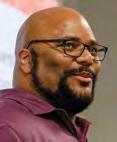
McKinley E. Melton, advi -
sory board chair, said the goal is to ensure that as many students as possible are engaged to some extent with traditions of Black poetry. “Ultimately,
having multiple conversations around Black poetry happening in so many spaces simultaneously provides the opportunity for shared community around the writers, voices and works that Furious Flower has long been dedicated to celebrating,” he said.
Megan N. Medeiros (’17, ’21M)
“Disinformation and misinformation is the bona fide enemy of public health.”
— DR. ANTHONY FAUCIMcKinley E. Melton, FFPC board chair
Black poetry center receives foundation grant for $50K
Alexander, associate professor of political science and co-director of ICAD, was selected in August 2022 as the new chair of the Commonwealth of Virginia’s Plastic Waste Prevention Advisory Council. The policy advisory council, created by the Virginia General Assembly, “advises the Governor on policy and funding priorities to eliminate plastic waste impacting native species and polluting the Commonwealth’s environment, and to contribute to achieving plastics-packaging, circulareconomy industry standards.”
Alexander was tasked with curating six months of the council’s authorization to compile a comprehensive approach to circular economy industry standards. “Circular-economy transitions happen around the globe as one of many attempts to reconcile unsustainable practices with limits to growth of our planet, and serving on this council has been an important way to see the potential for such shifts in Virginia,” Alexander said.

Brinen, assistant professor of architectural design, was awarded the 2023 Beck Fellowship by the College of Visual and Performing Arts, which recognizes a SADAH faculty member who advances the visual arts at JMU and in the Harrisonburg community, focuses on student success and embraces new technologies in the classroom.
Students enrolled in Brinen’s Architectural Design-Build Studio in 2022 developed a multifunctional, bicycle storage and repair station for the children in Occupational Therapy Clinical Education Services. Harrisonburg Public Works donated ash wood as the main building material to increase awareness of the harmful, emerald ash borer beetle, which kills the ash tree species in Virginia.
“What if those trees didn’t disappear and could become valuable resources for public projects that need support?” Brinen said. “[Our ethos in architecture design] is for stu dents to take something ordi nary and elevate it to something extraordinary.”
Mayfield, associate professor of computer science, was awarded two grants by the National Science Foundation for projects on fostering student engagement and profes


Reider, assistant professor of biology, received a $470,000 grant from the National Science Foundation to examine the role llama-like vicuña have in kickstart ing new life in barren, nutrientstarved landscapes. With glaciers melting away faster every year in the Peruvian Andes, family groups of vicuña are routinely finding new areas to roam, leaving piles of nutrient-dense dung.
“The work is about understanding how the dung piles alter nutrient levels and biodiversity, and how quickly the area can respond to gla cier loss,” she said.
sional development for high school educators.
The NSF granted $300,000 for the development of the project, “Exploring the Impact of Process Oriented Guided Inquiry Learning on Student Engagement and Conceptual Understanding.” The program is designed to study engagement and understand the effects of certain teaching strategies on student engagement using a student-focused

In February, McCarthy, associate professor of WRTC, spoke to writer Beth McMurtrie of The Chronicle of Higher Education on “Teaching in an Age of ‘Militant Apathy.’” Coined by a colleague, “militant apathy” occurs when students seem almost defiant in their
Reider and her students will first visit the Peruvian Andes in May, working as high as 17,700 feet.
Reider believes vicuña that travel up and down the Andes mountains are speeding up primary succession.
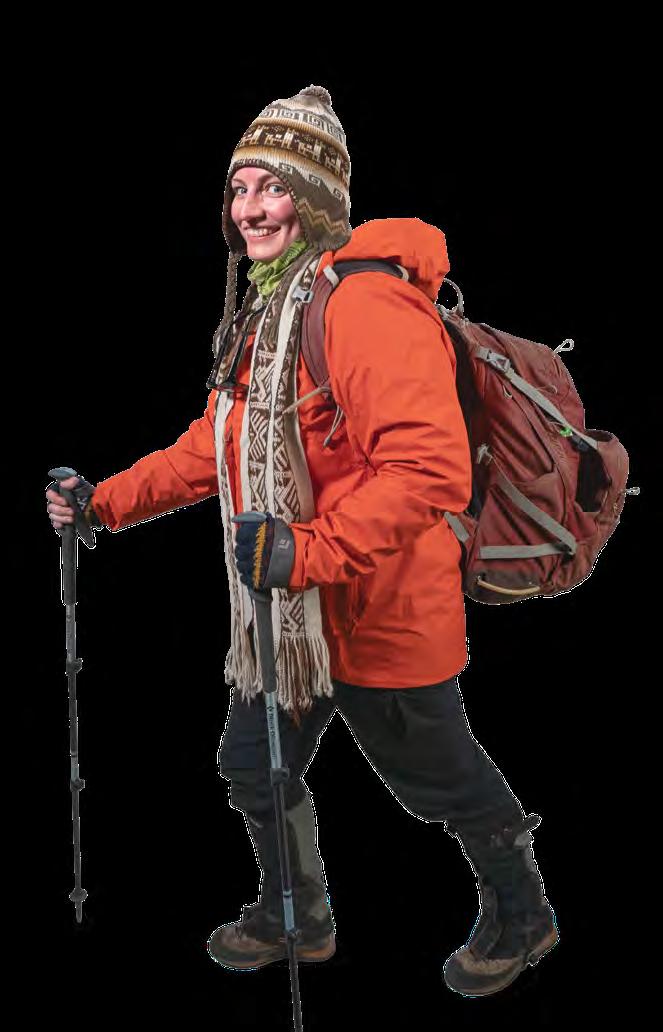
Former men’s basketball coach Lou Campanelli, one of the most influential figures in JMU Athletics , passed away Jan. 31 at the age of 84. He orchestrated the growth of men’s basketball from a nonscholarship program to one that won three consecutive NCAA Tournament first-round games from 1981 to 1983.
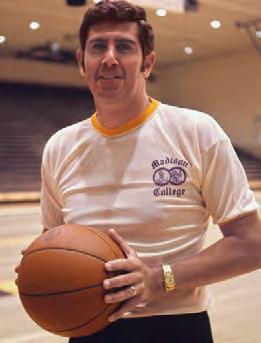
Over 13 seasons spanning 1972 -1985, Campanelli’s teams went 238118 (.669) and had a winning season every year but his last, 1984-85, when they finished 14-14. Overall, his teams qualified for two NCAA Division II Championships and three NCAA Division I Championships, finishing either first or second in their conference six times.
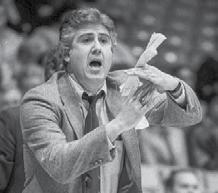
His success was immediate. Campanelli led his second JMU team to NCAA Division II Tournament play, his third won the state smallcollege title, and his fourth returned to NCAA Division II postseason play.
In 1976-77, JMU moved to Division I, where Campanelli’s first four teams won 71 games, and his next three (1981 to 1983)
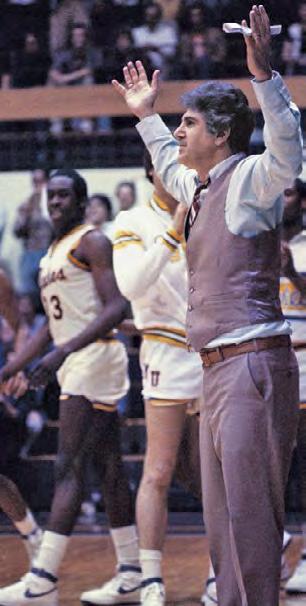
advanced to the second round of NCAA play. The 1981 Dukes beat Georgetown, the 1982 team took down Ohio State and the 1983 team beat West Virginia in the NCAA Tournament. The 24-6 1982 team held a lead late before falling 52-50 to eventual national champion North Carolina, a team that included future first-round NBA draft selections Michael Jordan, James Worthy and Sam Perkins. Jordan was held to six points.
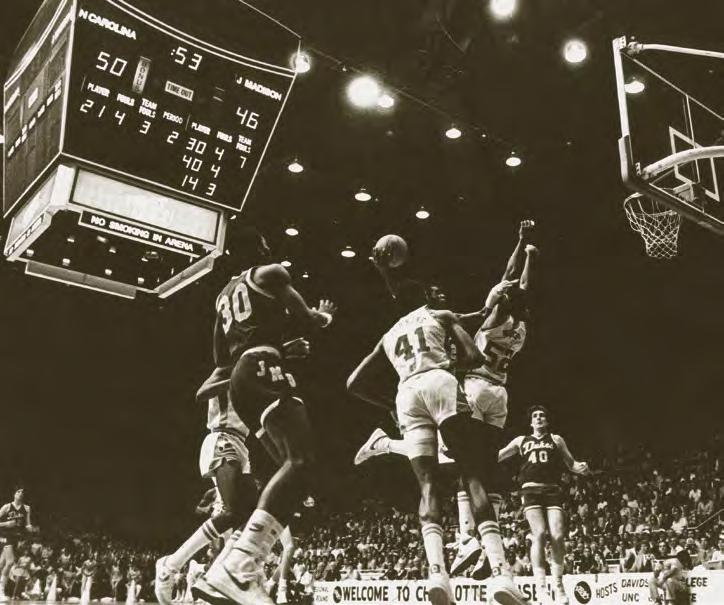
In addition to Campanelli’s JMU Hall of Fame induction in 1999, the 1981-82 squad was inducted as a team in 2018 for its achievements and overall impact, forever altering the trajectory of JMU Athletics. Six of his players also earned induction.
In 2015, Campanelli authored the book Dare to Dream: How James Madison University Became Coed and Shocked the Basketball World. The Campanelli Club in the Atlantic Union Bank Center was anonymously named in his honor by a donor.
Lou Campanelli led the Dukes to 12 consecutive winning seasons and three straight NCAA Tournament appearances.
Five elite student-athletes and one administrator constitute the Hall of Fame Class of 2023, the 35th class to be inducted in department history. The induction ceremony will be held Sept. 1 in the Festival Conference and Student Center
CASEY ANCARROW (’13) lacrosse attacker (2009-13)



Ancarrow was a key figure on the front line, guiding the Dukes to a pair of conference championships and NCAA appearances in lacrosse. Overall, the Dukes went 54-20 during her four seasons, including a 25-3 mark in the Colonial Athletic Association. She was a two-time Tewaaraton Award nominee in 2011 and 2013, a three-time Intercollegiate Women’s Lacrosse Coaches Association AllAmerican from 2011 to 2013, and wrapped up her collegiate career by playing in the NorthSouth Senior All-Star Game in 2013. Ancarrow was twice honored as CAA Player of the Year and was a four-time All-CAA honoree, including First Team in 2011-13. She was also CAA and Virginia Sports Information Directors state Rookie of the Year in 2010.
KIM ARGY ESTES (’06) women’s soccer forward (2002-05)
Argy was a three-time First Team All-Conference forward for the Dukes, leading JMU women’s soccer to a 43-26-10 overall record, a 2002 CAA Championship and two NCAA appearances (2002, 2004). As a senior in 2005, she was named to the National Soccer Coaches Association of America Scholar All-America Team as well as the NSCAA MidAtlantic All-Region First Team. That was her second All-Region selection, as she was honored in 2002 as a freshman and 2005 as a senior. As a freshman, she was also a Soccer Buzz Freshman All-American and CAA Rookie of the Year. Argy also collected three Virginia Sports Information Directors All-State honors. Argy ranks fifth in program history with 34 career goals and seventh with 78 career points. She still holds freshman class records for game-winning goals and games played.

TOM KUSTER (’95)
Beloved for his kind demeanor and genuine care for studentathletes, Kuster was hired to the JMU sports medicine team in 1999 and was elevated to assistant athletic director to lead the unit in

2006. During his 16 years of leadership, he revolutionized JMU’s approach to studentathlete care, transforming it into a nationwide model. Kuster was named associate athletic director for integrated health and sport performance in 2016 upon combining JMU’s key health areas into one cohesive unit. Through this collaboration of sports medicine, strength and conditioning, nutrition, sport psychology, and mental health, JMU has been able to better care for the individual health circumstances of each student-athlete. Kuster oversaw a staff of nearly 25 sports medicine and sport performance professionals. While coordinating the department’s COVID-19 pandemic response during the summer of 2020, Kuster was diagnosed with cancer and passed away in May 2022. He was the recipient of the CAA’s prestigious Randolph Inspiration Award in 2021 and was inducted into the Virginia Athletic Trainers’ Association Hall of Fame in January 2022.
A versatile and consistent figure on the diamond, Metheny played more games than any Duke in program history as a four-year starter and was a two-way player as an infielder and pitcher. He was a three-time All-CAA selection from 2001 to 2003 and was named to the Colonial Athletic Association All-Tournament Team in 2002. Metheny owns individual program career records for at-bats (896), runs scored (224), total bases (471), RBIs (199) and plate appearances (1,038). He also ranks second in career hits (312), fourth in doubles (60), third in steals (94), eighth in walks (121) and eighth in assists (473). Metheny was also successful as a pitcher, particularly as a freshman, when he posted six saves, a 1.33 ERA and a .200 opponent batting average, each of which ranks in the top 10 in JMU single-season history. Overall, he made 27 pitching appearances with a 3-2 record and seven saves in 39 2/3 innings. Metheny’s career numbers also rank among the CAA’s best, placing fifth in at-bats, third in runs scored, third in hits, eighth in total bases, 10th in RBIs and seventh in steals.
JUSTIN RASCATI (’06) football quarterback (2004-06)

Rascati became a three-year starter for the Dukes, guiding the program to its first national championship in 2004. Noted for his passing efficiency, adept running ability and all-around game management, Rascati owns the most wins as a starting quarterback in program history with 29, including two trips to the NCAA I-AA playoffs. The 2004 championship run saw JMU become the only team in NCAA history to capture a national title without a home playoff game, as Rascati outdueled three of the top quarterbacks in the nation. He orchestrated an epic, game-winning drive against the No. 2 seed, Furman, in the quarterfinals, followed by besting No. 3 William & Mary’s Walter Payton Award-winning quarterback in the semifinals. Rascati ranks fourth in program history with 5,912 passing yards, third with 51 touchdowns, second with 487 completions and fourth with 728 pass attempts. He also ranks fifth in career total offense with 7,111 total yards from scrimmage.
A four-time collegiate AllAmerican, Wukie is one of two athletes in JMU history to appear in multiple Olympics. He earned a silver medal at the 2012 London Games as part of the USA three-man team and individually reached the round of 32 with a 17th-place finish. He then individually placed ninth at the 2020 Tokyo Games and was part of a seventh-place team finish. Wukie’s collegiate career spanned JMU’s transition from a varsity program to a club sport, helping lead the team to a national championship in its final varsity season in 2007 and placing second individually. In 2007, he was also named to the U.S. Archery team and competed at the World University Games in Slovakia. Wukie took the 2008 season off to train with the resident athlete program at the U.S. Olympic Training Center, before returning to JMU in 2009 to place first individually and lead the team to a first-place finish at the national championships. He also placed 11th at the 2005 national championships as a freshman, and third in 2006 as a sophomore, giving him three total top-three collegiate finishes.
Welcoming home the Sun Belt champs
As a freshman during the 2019-20 season, Kiki Jefferson made a promise to upperclassmen Lexie Barrier and Kayla Cooper-Williams heading into the Colonial Athletic Association Tournament. “She came up to myself and the rest of the seniors and said, ‘I promise you, I’m going to make sure you get a ring,’” Cooper-Williams recalled.
The Dukes were coming off a 2018-19 season in which they went 25-4, including 17-1 in league play, before injuries dashed their conference title and NCAA tournament hopes. The team regrouped for the Women’s National Invitation Tournament semifinals, but it was not the path they anticipated.
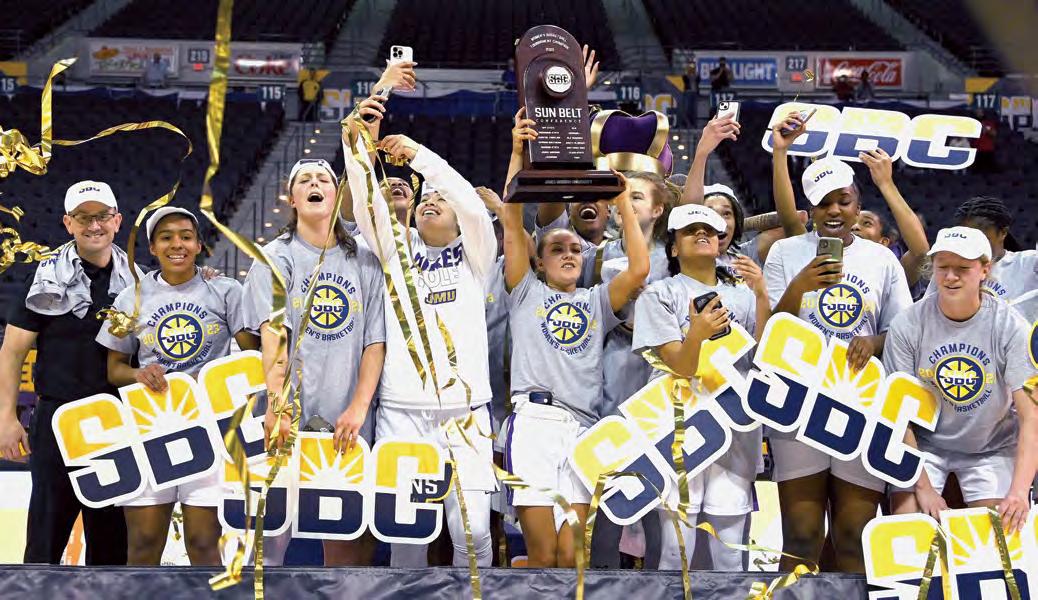 BY KEVIN WARNER (’02)
BY KEVIN WARNER (’02)
The next year, with Jefferson part of the program, the Dukes again were 25-4 heading into the CAA Tournament and up for NCAA consideration. Then the COVID-19 pandemic struck as the team was in North Carolina for the CAA Championship. They never took the court again that season, and the playing careers for Barrier and Cooper-Williams came to a close.
For JMU women’s basketball , it was a long journey back to being top dog.
COVID-19 protocols caused interruptions during the 2020-21 season, which ended with an overtime loss in the CAA semifinals and a 14-10 record. JMU women’s basketball did not play in the postseason for the first time since 2005. The Dukes opened the 2021-22 season

with a convincing win over Virginia in their first home game without COVID19 attendance restrictions. Three days earlier, JMU Athletics had accepted an invitation to join the Sun Belt Conference, but following the Virginia win, it was announced that the CAA would uphold a rule banning JMU from all postseason tournaments. The team never truly rebounded and finished with its first losing record since 2003-04.
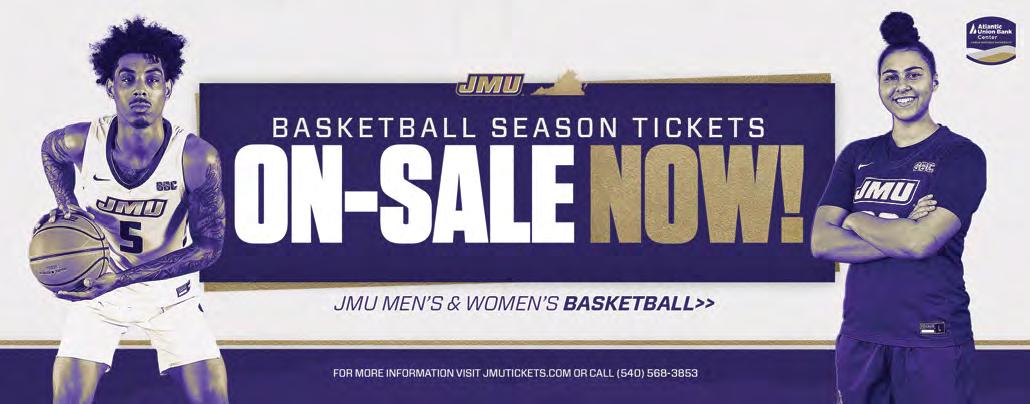
Jefferson had one final year to put the adversity behind her.
“To have a four-year career never missing a game and for three of those years to be the focal point of everything for us, having that weight on your shoulders can drain you,” head coach Sean O’Regan said. “She deserves to have that Player-of-theYear, MVP and win-a-championship type of season. If you were writing a story, that would be the perfect way to end your career. It’s hard for me to put into words just how much she means to me and to the program.”
Jefferson’s storybook finish became a reality when the Dukes defeated Texas State 81-51 in the Sun Belt Conference Championship on March 6 behind Jefferson’s tournament MVP performance. She scored 56 points in three games, with 16 rebounds, and made 19-of-35 field-goal attempts, including a confident 9-for-12 from the 3-point arc. Before the tournament, she was named Sun Belt Player of the Year.
“When COVID hit, it could have meant ‘OK, I’m done,’ or when we had to sit out of the tournament, ‘throw in the towel,’” Jefferson said. “But with the love I have for the game and for Coach O, it was just the next step in the journey. When adversity hits, ‘How strong are you to keep fighting?,’ and that’s what we did together.” O’Regan acknowledged that the Sun Belt provided a “breath of fresh air.” Facing a slate of unknowns and with JMU an unknown itself to the rest of the league, the team was picked sixth in the conference preseason poll. That wasn’t going to cut it for one of the top-five winningest women’s basketball programs in NCAA history, and the Dukes used it as motivation.
Jefferson’s growth was key in allowing the Dukes to regain a championship mindset. “Where I’ve really seen her growth is her leadership ability. She set the standard of what this year was going to look like and how we were going to get here,” Barrier said.
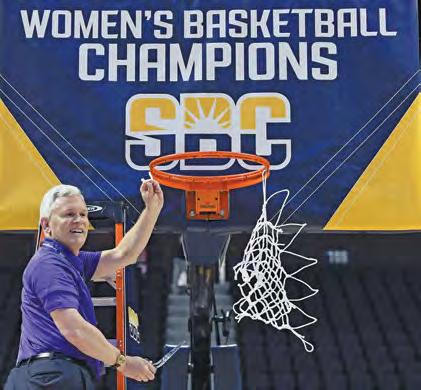
O’Regan also identified junior Kobe King-Hawea’s emergence into the starting lineup on Feb. 2. She complemented Jefferson and junior Jamia Hazell to give the Dukes three inside-out scorers on the floor to go along with graduate transfer Caroline Germond’s floor leadership at point guard and junior Kzeniia Kozlova’s presence in the paint. Barrier called Germond the key to JMU’s championship mindset day in and day out.
The X-factor off the bench was Peyton McDaniel. Her sharp shooting led to several wins, most significantly in the Sun Belt title game when she torched the Bobcats for 30 points, including 7-for-7 on 3-pointers, to earn All-Tournament honors. O’Regan, Barrier, Cooper-Williams and Jefferson identified the same element that allowed JMU to come out on top. For Barrier, it’s why she returned to JMU after brief coaching stints at North Carolina State and Marshall University. “What makes JMU women’s basketball special is the family atmosphere,” Barrier said. “When people leave this program, they come back. Or when they’re here, they don’t want to leave. For all of us, this is our home away from home.”
In the summer of 2018, Tatjana Titareva was presenting a paper on the internationalization of higher education in Europe at a conference in Valencia, Spain. Her colleague didn’t want to attend the official dinner and handed Titareva his ticket. As she entered the futuristic City of Arts and Sciences complex on the outskirts of Valencia and approached one of the tables, she noticed four people smiling at her.
“Where I come from, it’s considered a little funny for people to smile at you when they don’t know you,” said Titareva, then an international project manager and lecturer, and the head of an IT department and undergraduate program in a business school in Latvia. “But they acted like they knew me. They were asking, ‘How are you?’ I knew I should be polite and respond.”
The greeting was the start of a three-hour conversation with JMU staff members, with both sides exchanging facts and stories about the differences in education in the U.S. and Europe. Near midnight, one of the JMU delegates who was also a doctoral student in Strategic Leadership Studies, mentioned that they would like to have a person with Titareva’s background and experience in the program.
A mid-career professional with an undergraduate degree in Business Administration and two master’s degrees — one in Public Administration and the other in Political Science — Titareva politely took their contact information but had no plans to follow up. However, six months later, when she mentioned the conversation to a German colleague, he said, “You are a FOOL if you do not consider pursuing an opportunity in an American university!”
Titareva was intrigued by the prospect of pursuing a doctorate full-time in the U.S. She got in touch with a JMU representative who gave her the name of a contact in Spain. The person responded immediately and connected her to the faculty of JMU’s Strategic Leadership Studies program. The team members made themselves available to her throughout the application process and
BY JIM HEFFERNAN (’96, ’17M)helped to overcome challenges before and after landing in Harrisonburg in the summer of 2020.
Two and a half years later, despite having to adjust to a new country and a host institution with a unique culture amid a global pandemic, Titareva, 37, is making her mark on Madison.
Her research area, and the subject of her dissertation, is artificial intelligence in higher education administration. Titareva has written extensively on the topic and co-authored a paper with her faculty adviser, Benjamin Selznick, that introduces a framework for ethical discourse on the subject. It concludes that while AI technologies present opportunities for advancement in learning quality, administrative decision-making and optimizing infrastructure, higher ed remains, at its core, a human endeavor, and administrators must drive decisions about AI technologies rather than allow AI technologies to drive the decisions of administrators.
“Let’s get the various stakeholders — leadership, faculty, students, their parents — together around the table and start discussing this now,” Titareva said. “It’s important that we put in place policies and ethical standards for these technologies before they become widespread in higher education.”
Last summer, Titareva furthered her research during an externship in Paris with the Organization for Economic Co-operation and Development, whose goal is to shape policies that promote prosperity, equality, opportunity and well-being among its member nations around the world. Her OECD colleagues were mostly doctorates from Yale, Princeton, the London School of Economics, Cambridge and other prestigious schools in the U.S., U.K. and France.
“To work there with them was one of the main reasons I wanted to get a Ph.D.,” she said. “This is the level I’ve been striving for for years!”
Margaret Sloan, director of the School of Strategic Leadership Studies, said Titareva’s externship “demonstrates SSLS’s rising prominence among national and international organizational leaders and exemplifies our small program-high impact approach.”
“Collaborating on an article and advising on her dissertation have also helped me to more fully understand some of the distinctive dimensions of using artificial intelligence in higher education.”
— BENJAMIN SELZNICK , associate professor, School of Strategic Leadership Studies
During her time at JMU, Titareva has also presented with the Center for Faculty Innovation on issues of diversity, equity and inclusion, and worked with JMU X-Labs, the Gilliam Center for Entrepreneurship, Women for Madison and the university’s Quality Enhancement Plan working group. In 2022, she was named a Stanford University Innovation Fellow
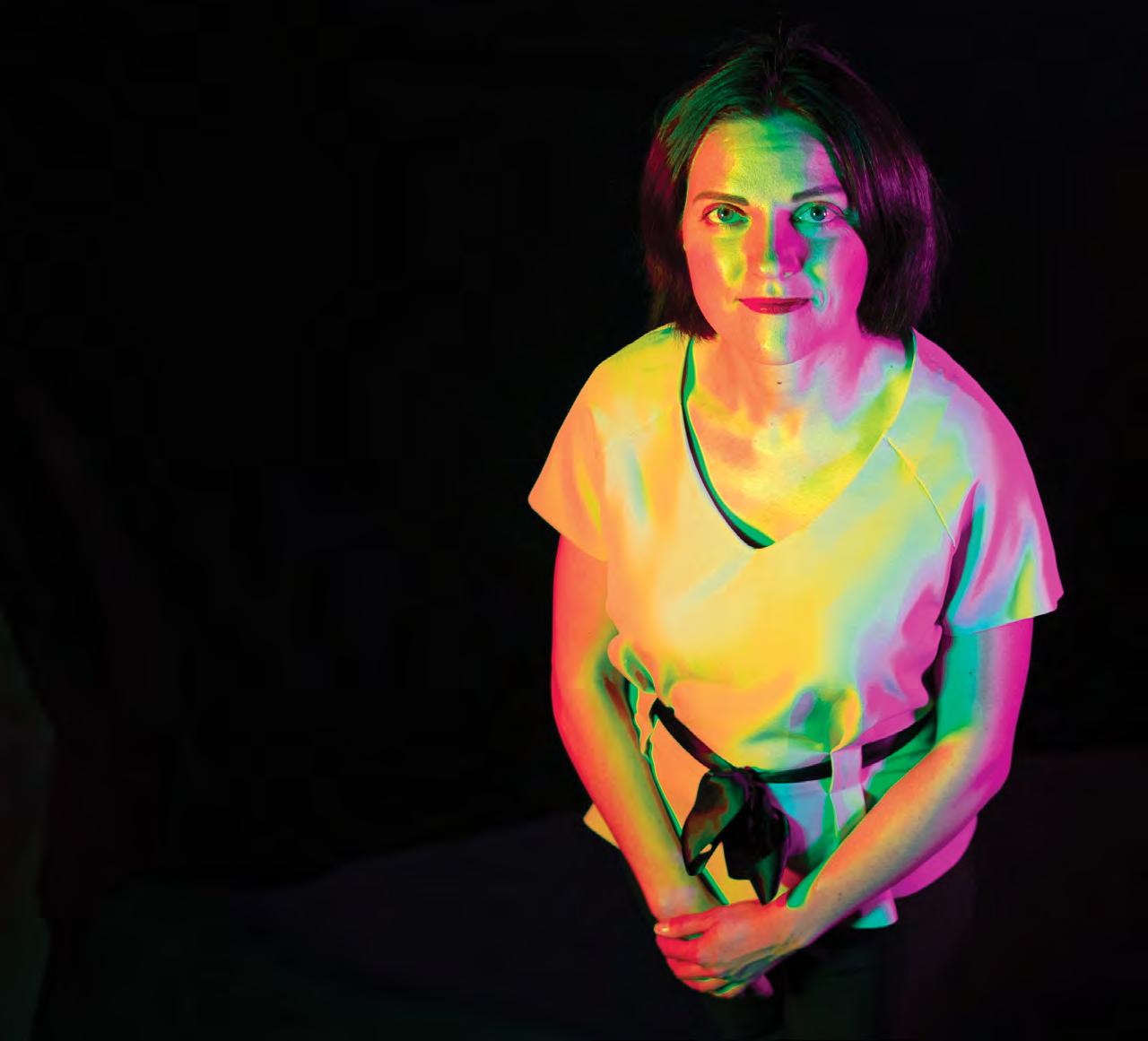
For Titareva, a doctorate isn’t just about the three letters after your name but the skills that you develop. “You have to think differently. You have to understand macro trends — global processes, climate change, political interests — and how they relate to your field of study. These are 21st-century leadership skills.”

Selznick, who studies how colleges and universities develop student innovators in higher education, said working with Titareva has been rewarding.
“Her global experiences and professional background provide a unique foundation for developing new ideas and considering research from a multidisciplinary perspective,” Selznick said. “Collaborating on an article and advising on her dissertation have also helped me to more fully understand some of the distinctive dimensions of using artificial intelligence in higher education, a topic that will only become increasingly more important in the coming decade.”
 BY DANIEL BEERS AND JOHN HULSEY
BY DANIEL BEERS AND JOHN HULSEY
In the late 1980s and early 1990s, a wave of revolutionary movements swept communist dictators from power across Eastern Europe and the former Soviet Union. One of the most politically significant events of the 20th century, the fall of communism brought an end to the decades-long Cold War and unleashed dramatic political and economic changes within the countries of the former Eastern bloc. No longer dominated by party apparatchiks in Moscow, the newly emancipated countries of the post-communist region rapidly dismantled the single-party states and centrally planned economies of the communist era and forged new identities as independent nations.
Where Russian influence was most tenuous and contested during the communist period — namely, in the satellite states of Eastern Europe (Bulgaria, Czechoslovakia, East Germany, Hungary, Poland and Romania) and the Baltic republics (Estonia, Latvia and Lithuania) — the transition was marked by a decisive turn toward the West. New leaders quickly adopted democratic constitutions and free-market economic policies, and reoriented diplomatic alliances and trade relations to draw closer to Europe. Formal membership in NATO and the EU soon followed as emphatic declarations of the “Europeanization” of a large swath of the post-communist world.
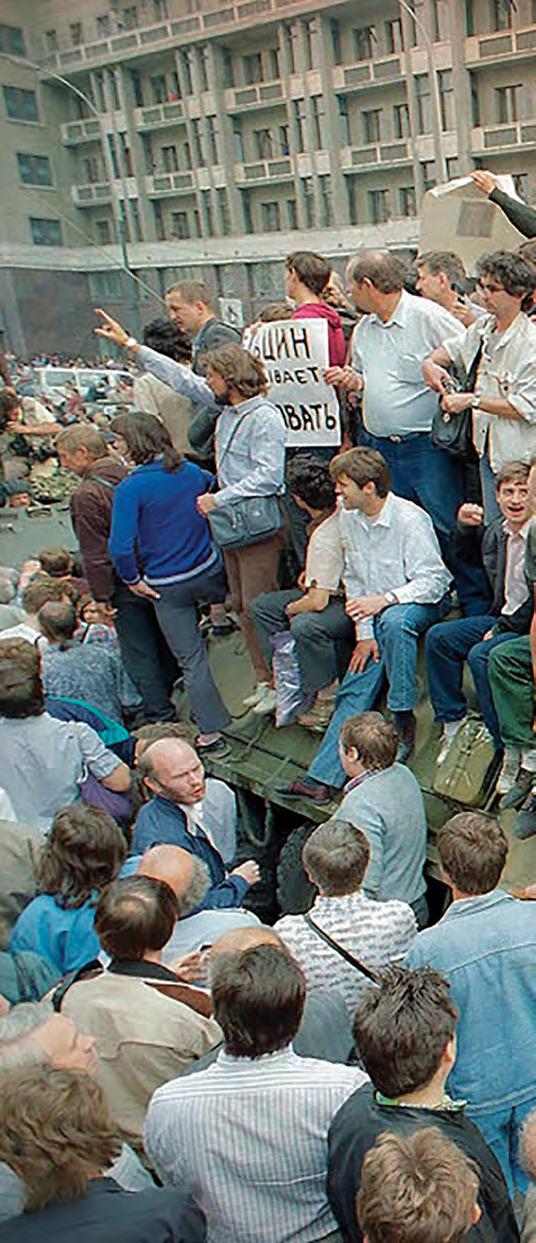
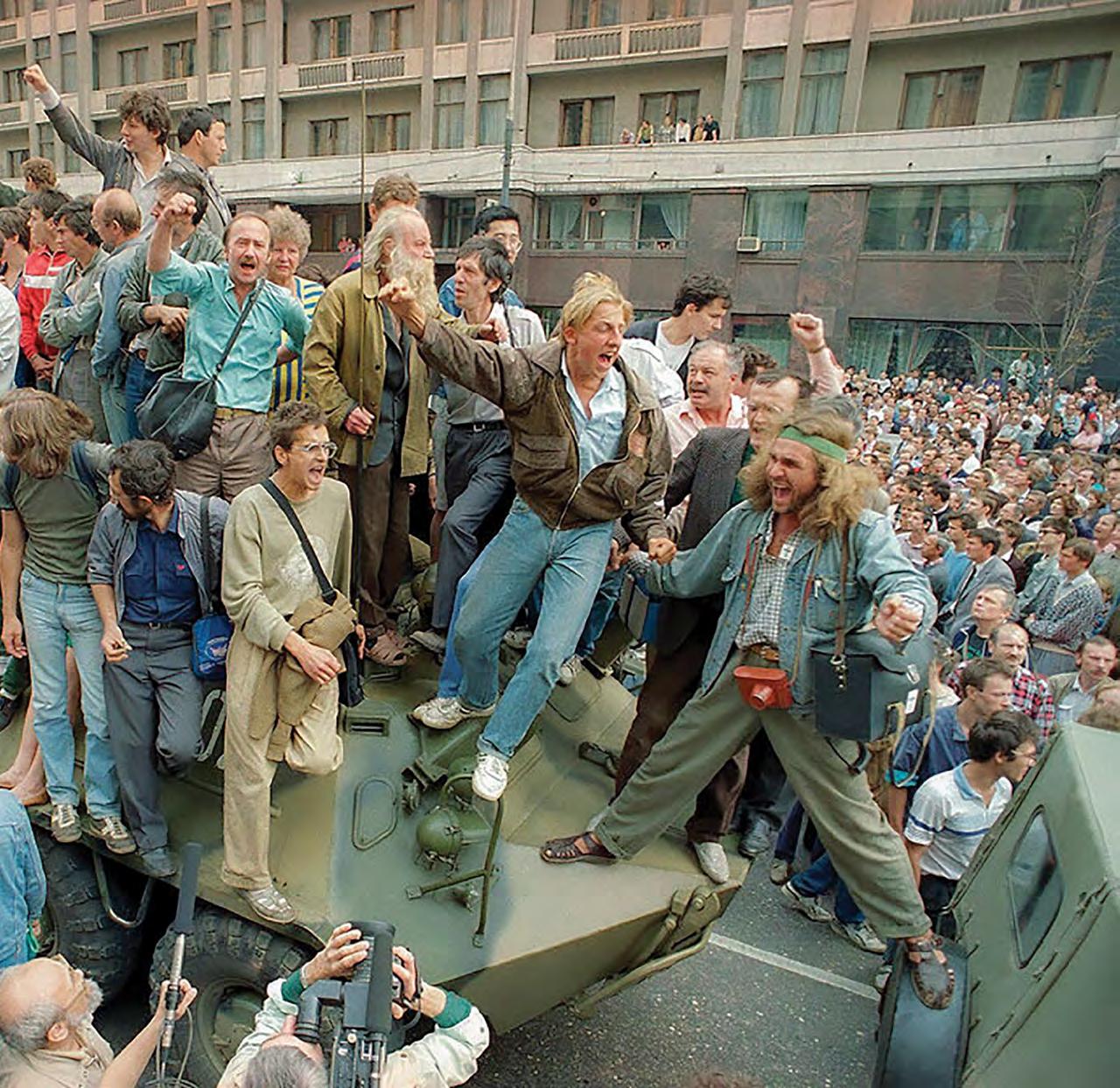
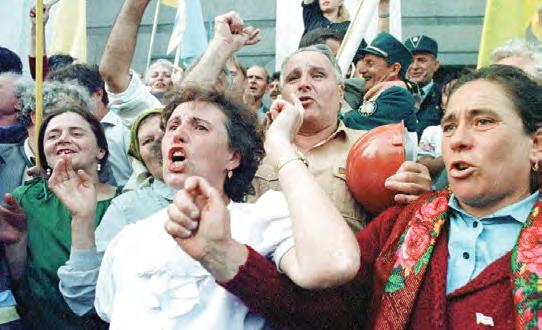
Other post-communist states that were more deeply enmeshed in the Soviet system followed more complex paths as independent nations. In the former Soviet republics of Armenia, Azerbaijan, Belarus, Georgia, Moldova, Ukraine and the states of Central Asia, the post-communist period has been marked by troubled political and economic transitions and persistent Russian influence. While each nation has followed its own unique route, the countries closest to Russia’s orbit have been undeniably shaped by the gravitational pull of the former imperial power.
Of all the former communist countries, Ukraine has arguably occupied the most intensely contested position between East and West. As its Western neighbors democratized and joined the EU, Ukraine also strengthened its economic ties to Europe and, in fits and starts, laid the political groundwork for possible EU membership. At the same time, Ukraine remained firmly within the sphere of influence of Russia — a major world power with a 1,300-mile shared border and a growing resolve to reassert its influence in the Russian-speaking world (what the Kremlin refers to as Russkiy mir). In many ways, Ukrainian politics since the fall of communism have been dominated by the question of the country’s position between Russia and the West. Indeed, the most important inflection points in Ukraine’s recent history — from the Orange Revolution of 2004, to the Euromaidan Revolution of 2013-14, to the Russian full-scale invasion in 2022 — have all centered on whether Ukraine would move closer to Europe or ally itself more firmly with Russia.
The Euromaidan Revolution proved to be a decisive moment for Ukraine. The crisis was precipitated by Ukraine’s former pro-Russia president, Viktor Yanukovych, who abruptly reversed course on a trade deal with Europe, refusing to sign an association agreement with the EU due to Russian opposition. In response to the decision, massive street protests
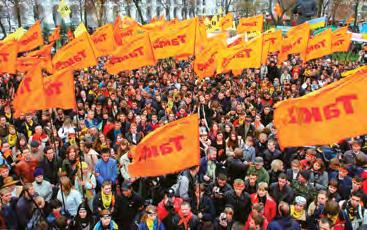
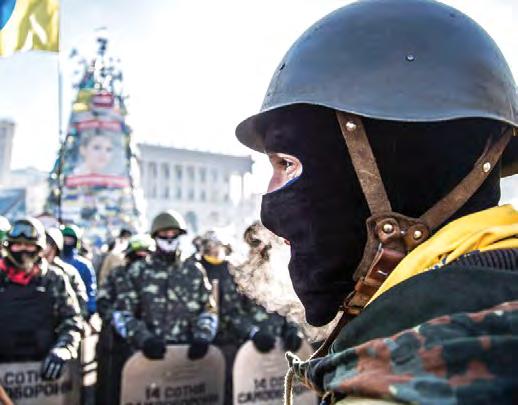
erupted in the central square of Kyiv, known as Maidan Nezalezhnosti. When Ukrainian riot police attempted to forcefully suppress the demonstrations, protestors took up arms, leading to a violent three-month standoff between civilian protesters and government forces in the heart of the Ukrainian capital. The Euromaidan Revolution culminated in Yanukovych abandoning his post and fleeing to Russia.
Russia responded by swiftly invading and annexing the Crimean peninsula in southern Ukraine, home to Russia’s most important Black Sea naval base. Russia also lent support to a burgeoning separatist movement in the Donbas region of eastern Ukraine, where armed paramilitary groups opposed to the Euromaidan Revolution seized control of government buildings and declared the Donetsk and Luhansk
People’s Republics as independent states. While fighting between the separatists and the Ukrainian government was reduced by the Minsk II agreement in early 2015, the fundamental question of the direction of Ukraine was not resolved, and fighting in the Donbas continued for the next eight years. During that time, Ukrainian national identity and political opposition to Russia increased steadily among the
Ukrainian population. Ukraine became stronger and more closely aligned with EU and NATO countries, while Russia’s vision of its role in world politics grew increasingly incompatible with an independent, Western-oriented Ukraine.
On Feb. 24, 2022, Russian President Vladimir Putin sought to resolve this dispute in

his favor by initiating an all-out conventional military attack on Ukraine. Given the scale and nature of the assault, including a major offensive aimed at capturing Kyiv, the initial goal of the invasion appeared to be outright regime change. If Russia could not persuade Ukraine to move Eastward through economic incentives, political meddling or an armed separatist movement, it would invade and occupy the country directly.
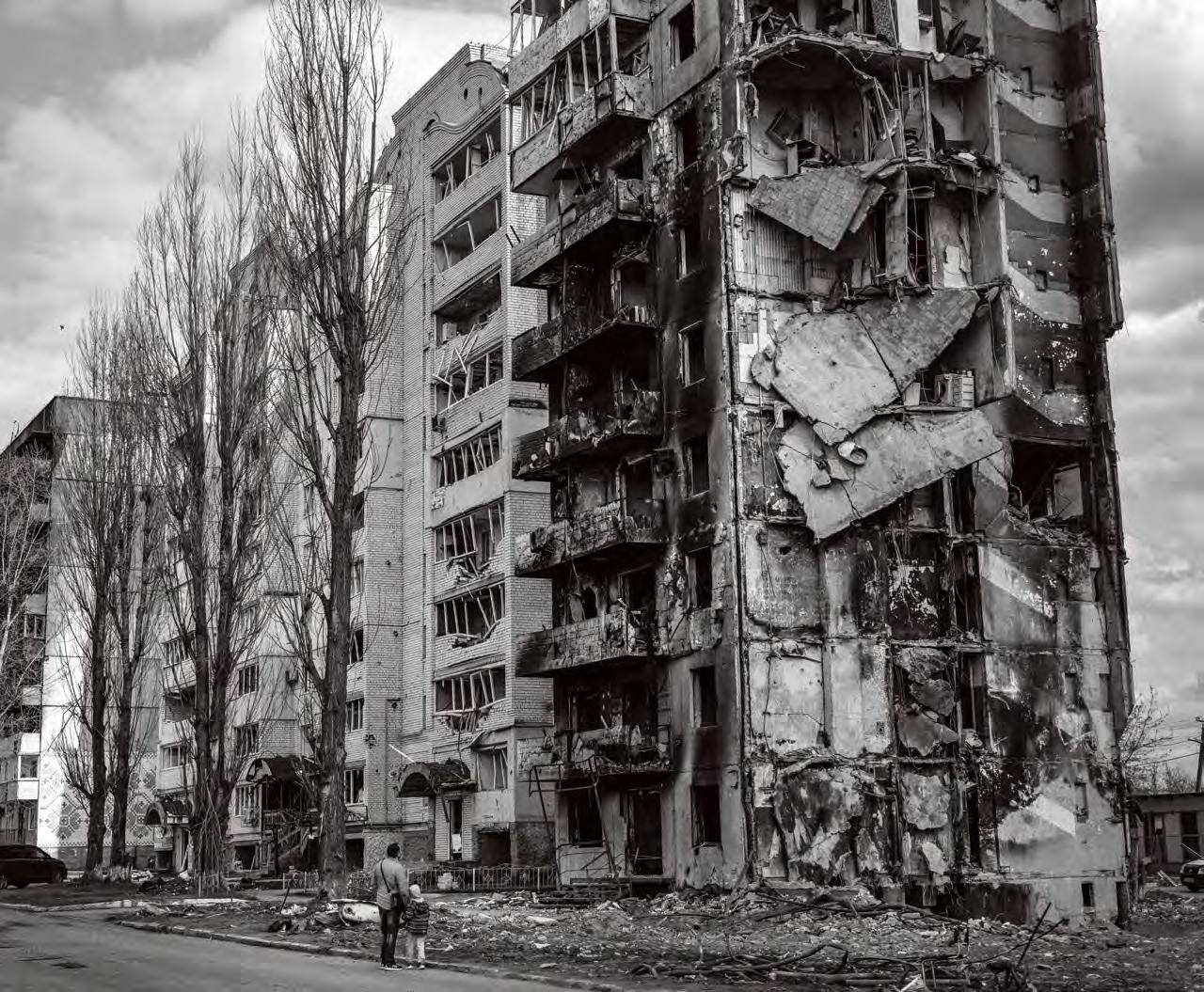
Rather than achieving a rapid fait accompli, the invasion has been thwarted by Ukrainian defense forces that repelled Russian troops from Kyiv and regained most of the territory captured by Russia in the early days of the war. Far from being supplanted by a crony pro-Russian government, Ukrainian President Volodymyr Zelenskyy has risen to international fame as a hero of the resistance.
Political leaders and everyday citizens around the world have rallied to support Ukraine, offering more than $100 billion in military, financial and humanitarian aid, and governments rapidly imposed major economic sanctions against Russia in an effort to undermine its ability to pay for and supply the war effort.
Analysts have put forward a variety of explanations for the underlying calculusa-
Read how the RussiaUkraine war extended a couple’s stay with family members in Harrisonburg. Scan to download the Madison app.

behind the Russian invasion of Ukraine. Some highlight Putin’s desire to recoup control over territories lost during the breakup of the Soviet Union and restore Russian power and prestige on the world stage. Others point to the perceived threat of growing Western influence in the postSoviet region, particularly in the form of Western alliances like NATO and the EU. According to this perspective, the invasion of Ukraine may be understood as a “defensive” response to Western overreach, rather than a war of aggression. Still others paint the invasion as a strategic miscalculation. After waging a series of more limited military operations in neighboring territories with relative impunity — including the Russian occupation of Crimea and the separatist war in the Donbas — many analysts believe that Putin misjudged the potential costs of the invasion. Simply put, the Kremlin overestimated Russia’s military prowess and underestimated the ability of Ukraine
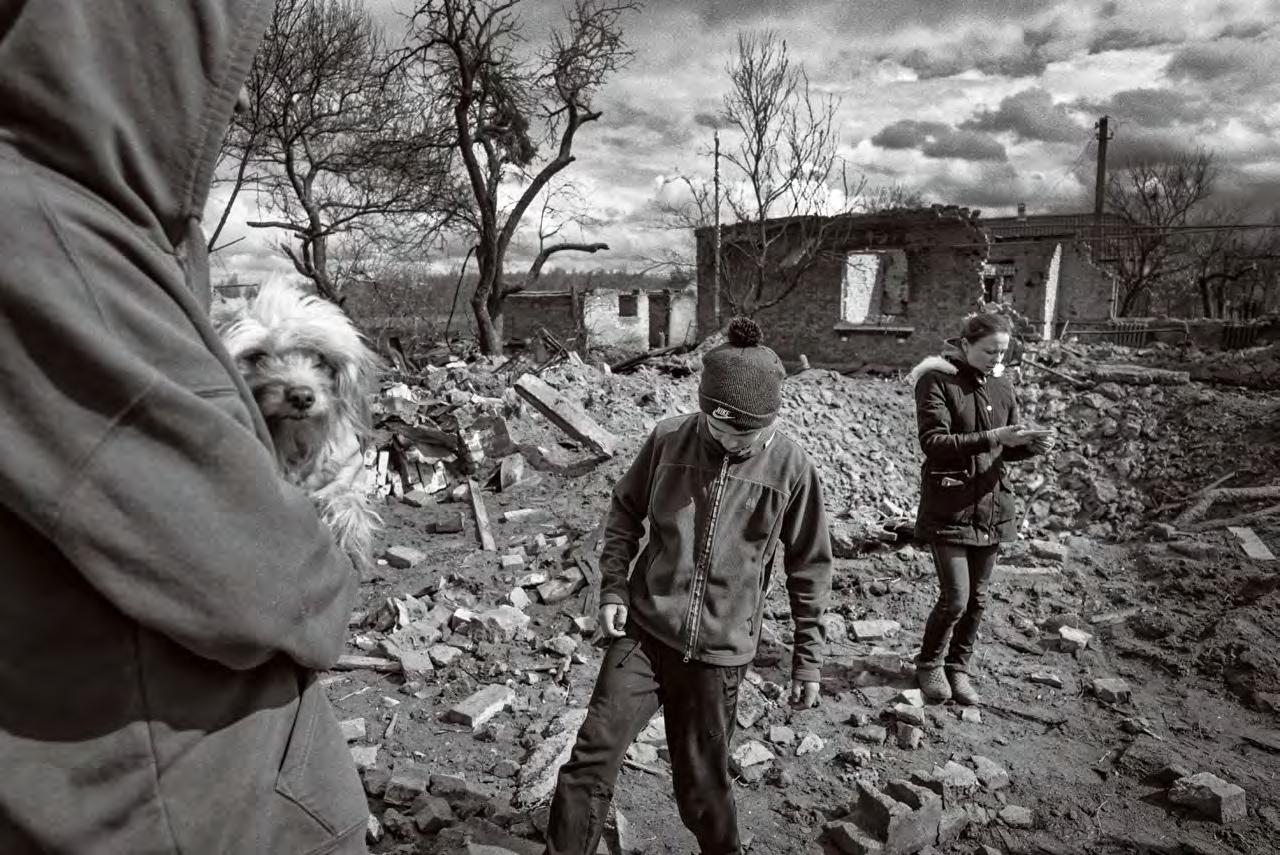
to fight back, as well as the willingness of Western powers to support and sustain the Ukrainian resistance.
Whatever the true motives behind the invasion, nearly all observers agree that the decision to wage war in Ukraine has resulted in significant strategic losses for Russia. Rather than restoring Russia’s standing in the world, the war has jeopardized relations with other world powers and exposed the internal weaknesses of Putin’s corrupt autocratic regime. The once-feared Russian military has suffered humiliating losses on the battlefield. Fraying Western alliances like NATO and the EU have grown stronger and more united in the face of a common threat. And the conflict has damaged Russia’s global reputation on a scale not seen since the dissolution of the Soviet Union.
Most importantly, the war has galvanized public opinion in Ukraine against Russian intervention and in favor of a politically independent, culturally distinct Ukrainian nation. Despite the deep historical connections between Russia and Ukraine, the Russian invasion has foreclosed the possibility of a future alliance between the countries. Once a nation adrift between East and West, Ukraine is no longer stuck in the middle. The future of Ukraine will be with Europe, not Russkiy mir
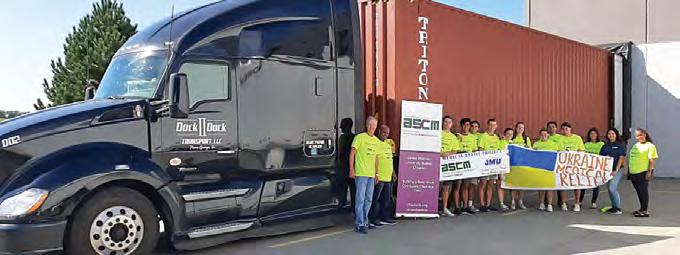
Despite the strategic and diplomatic successes of the Ukrainian war effort, the humanitarian consequences of the conflict have been dire. The United Nations High Commissioner for Refugees reports more than 8 million Ukrainian refugees scattered across Europe, and another 5 million forcibly displaced inside Ukraine — making this Europe’s largest and swiftest refugee crisis since World War II. Across the Atlantic, approximately 110,000 Ukrainians have been granted temporary humanitarian parole in the United States through the Uniting for Ukraine program, and more than 150,000 additional Ukrainians have entered the U.S. through other immigration channels since the war began. While many Ukrainians initially left home with the intention of returning as soon as it was safe, the increasingly protracted conflict put their plans — and their lives — on hold. The longer the war drags on, the harder it will be for those displaced by the conflict to uproot themselves again and restart their lives in Ukraine.
Inside Ukraine, the humanitarian suffering caused by the war is difficult to comprehend. Intense fighting and indiscriminate aerial bombing campaigns have killed and injured thousands, caused widespread destruction to buildings and basic infrastructure, and created major shortages and disruptions in access to food, fuel, heat, electricity and clean water. Current data from the U.N. indicates that approximately 18 million Ukrainians — close to half of the pre-war population of Ukraine — are in immediate need of humanitarian assistance. Among the most vulnerable are children, the elderly and disabled, and those trapped in Russian-occupied territories or in communities encircled by fighting on the frontlines.
Beyond the immediate dangers and disruptions to daily life, the war will exact a heavy toll on the future of Ukraine. Rebuilding the cities and towns and basic infrastructure destroyed in the conflict will take years, if not decades, and require a massive outlay of resources far beyond the capacity of the Ukrainian state. As part of their military strategy, Russian and Ukrainian forces have littered the country’s fields and forests with landmines to slow the advance of enemy troops. These munitions, and other unexploded ordnance left over from the war, will
remain a danger to Ukrainian civilians for years to come. Moreover, the psychological toll of lost loved ones, families separated by the conflict and the daily traumas of war will continue to haunt survivors long after the fighting has ceased. Regardless of how the current conflict ends, the challenges of rebuilding Ukraine and healing the wounds of war cannot be overstated.
Ultimately, the future of Ukraine will depend heavily on the course of the conflict from this point forward and especially on how the war ends. More than one year after Russia’s fullscale invasion, a decisive military victory for either side is difficult to imagine. Rather, it appears more likely that the war will continue for some time, with possible outcomes ranging from the restoration of Ukraine’s pre2014 borders, to a negotiated settlement, to a broader regional war. The fundamental tasks of any settlement will be to guarantee that no side views restarting the war as a useful path to pursuing their interests, while crafting a political accord that includes all Ukrainians. This latter task will be made more difficult by the need to incorporate people and territories who have opposed the Ukrainian state during the war, as well as extremists who have been radicalized and emboldened by the conflict. What is more certain is that the war’s legacies will be long-lasting and multifaceted. Soldiers will come away with changed attitudes toward their country, their compatriots and their opponents, and will carry physical and mental scars. The structures that make daily life possible, from physical infrastructure to human relationships, are being destroyed by and adapted to the intense realities of war. Families torn apart temporarily or permanently by displacement and death will forever be shaped by the experience. The necessities of fighting and survival will create impulses for solidarity and division, strengthening some bonds and organizations while weakening others in ways that will persist long after the fighting is over. Even as we look forward to the end of war, we must prepare ourselves for the years of work it will take to build lasting peace and prosperity in post-war Ukraine.
Ukraine is no longer stuck in the middle. The future of Ukraine will be with Europe, not Russkiy mir.
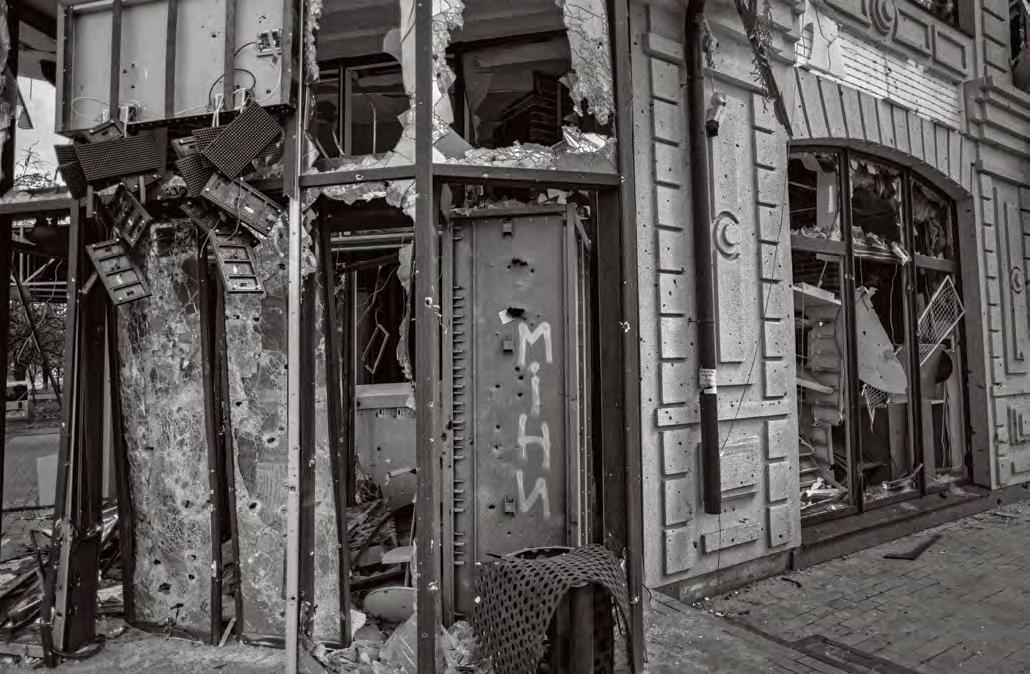 By Amy Crockett (’10)
By Amy Crockett (’10)
OOn South Main Street in Harrisonburg, just down the road from the Quad, sits an unassuming, colonial house shaded by magnolia trees that is home to one of JMU’s hidden gems, the Center for International Stabilization and Recovery. A student zooming past on an electric scooter might overlook the CISR offices inside Funkhouser House, yet nearly 400 student assistants have contributed to the nonprofit’s post-conflict recovery efforts since its founding in 1996, many of whom went on to careers in humanitarian mine action.
Alex Pate (’16, ’19M) first stepped through the doors of CISR in 2017 as a graduate assistant. Learning the administrative and reporting requirements of U.S. federal grants, meeting leaders in the field and traveling to the U.K. for a CISR-sponsored externship primed Pate for her current role in grants management at Mines Advisory Group, a landmine relief organization.
Russia’s full-scale invasion of Ukraine in 2022 introduced new complexities to Pate’s portfolio of projects and demanded swift action to prevent further atrocities related to explosive remnants of war. MAG
had secured $8 million to clear landmines and unexploded bombs in Ukraine. “I had to jump in feet first, shifting focus to the otherwise quiet Europe region to get the new grant developed, submitted, approved and signed,” Pate said. “The grant requirements were constantly evolving … I am always standing by to respond to needs, questions and to be contactable by the MAG Ukraine team and our partners.”
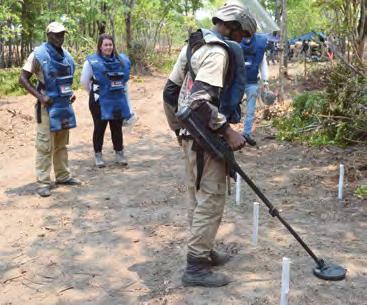
With Ukraine now considered the most conventional weapons-contaminated country in the world, CISR honed in on the crisis by covering the war in its Fall 2022 issue of The Journal of Conventional Weapons Destruction. In choosing the cover photo, Heather Holsinger, CISR communications and publications manager, said the flag of Ukraine flying amid bombed buildings signifies the perseverance of its citizens.
Mines Advisory Group photojournalist Sean Sutton’s striking black-and-white photo essay, “Ukraine: Through the Eyes of the People,” graces the opening pages of The Journal. Taken in April 2022, the photographs depict the profound personal accounts of civilians as war rages around them in Andriivka, Bodoryanka,
Irpin, Kyiv, Lviv, Ozera and Peremoha. “It shows the inhumanity of what people are having to live through. It shows the utter devastation,” Holsinger said.
Published triannually and reaching more than 160 countries, The Journal serves as a print and digital forum for issues relating to post-conflict environments and explosive hazards clearance. “We are the platform through which nongovernmental organizations, governments, the U.N. and researchers share information about contamination, risk education, clearance efforts, survey and victim assistance in countries affected by explosive ordnance,” said Jennifer Risser (’00), managing editor.
CISR’s social media also acts as a conduit for exchanging lessons learned, a place for experts and academics who are directly active in helping the people of Ukraine. “We’re like a highway for what’s going on,” said Blake Williamson (’12), social media manager. “That’s where we come in.”
In the fall issue, the article “Explosive Weapons Use and the Environmental Consequences” describes the massive damage to civilian and industrial infrastructure in Ukraine, resulting in the pollution of air, soil and water resources. Another Journal article notes that the Russia-Ukraine war is the most social media-documented conflict to date, which aids in the mapping of different types of explosive remnants and helps assess the level of contamination.
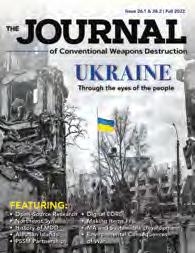
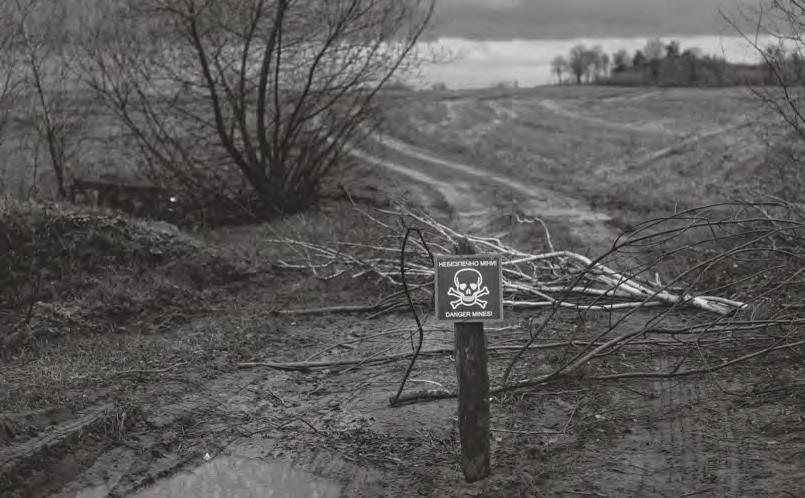
After a one-year hiatus, CISR is again managing the Frasure-Kruzel-Drew Memorial Fellowship program, an opportunity for fourth-year students, graduate students and recent graduates to apply for and serve in the Office of Weapons Removal and Abatement in the U.S. Department of State’s Bureau of Political-Military Affairs. “We just completed a new round of recruitment last fall and have two newly selected fellows in the pipeline to start this summer,” said Suzanne Fiederlein, CISR director. Thirty-five Dukes have served as fellows since 1999.
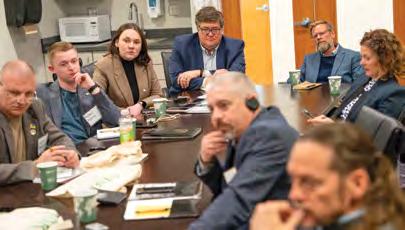
Winter’s end is CISR’s most eventful time of the academic year. In addition to preparing To Walk the Earth in Safety and The Journal
for publication, every spring CISR presents Global Humanitarian Week to expose the campus and the local community to the issues and people working globally in countries affected by war. “Many of our CISR and JMU alumni who have gone on to work in the U.S. government and in international affairs participate in the annual events,” Risser said.
This year, GHW featured keynote speaker Giles Duley, an award-winning
photographer, U.N. advocate for disability and improvised explosive device survivor. He spoke in JMU’s Hall of Presidents about his experiences and the people he has interviewed and photographed over the years, as well as his docuseries, The One-Armed Chef, in which he travels to Ukraine to break bread with citizens who cook for comfort, joy and hope during the war.
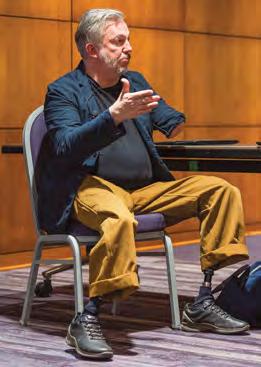
“[Sutton’s photos] show the inhumanity of what people are having to live through. [They] show the utter devastation.”
— HEATHER HOLSINGER , CISR communications and publications manager
JMU is home to students and faculty from around the world, including Russia and Ukraine. For these members of our community, what’s happening in Ukraine is personal.
When asked how the ongoing war is affecting them, they talk of staying up late to follow the news and of losing communication with family members. They worry about their home countries while living thousands of miles away. And they urge the JMU community to stay informed and not remain silent.
“Let’s not say there are two sides to the story. There is a brutal bully, and we need to call it like this. This is Russia that bombs peaceful citizens and that does all this destruction. Let’s be honest and let’s try not to pretend. … It’s awful. For anyone, it may be hard to imagine that a country that has been living its ordinary life suddenly gets under missile strikes and shelling. If you don’t live there, it’s hard to imagine. … People in the U.S. have other interests, and I understand that. But let’s not get indifferent. Let’s not get tired. When someone needs help, people shouldn’t ignore it.”
“Growing up, I lived both in Moscow, Russia, and Odessa, Ukraine, as my family is international. Traveling to Ukraine is very unsafe these days; anything can happen on the road. The beautiful and modern airport in Odessa has been destroyed. We are praying for all the people of Ukraine and all Ukrainian cities to be safe. … The majority of the people living in Russia do not wish for this war; some people are being misinformed by the mass media and misinterpret the invasion as an attempt to protect their own land. … My life and my mom’s life have been affected dramatically. My mom was born in Ukraine, but now she has a Russian passport. She is not welcome in her home country of Ukraine anymore, as any Russian citizen is associated with the enemy and a potential terrorist. We are managing lots of things from overseas, and it is extremely stressful, especially when my grandma [in Ukraine] gets sick. It is critical to be next to your dearest person when she needs you and gets old. … Most of our friends had to leave Ukraine and found refuge across the globe. They are starting their life from scratch, going through colossal challenges and adjustments, learning to live in a new environment, and missing their home country and life before the war tremendously.”
“I remember Feb. 24, 1 a.m., when everybody went to bed, and I was checking the news. It was morning in Ukraine, and they were reporting explosions and rocket attacks. I called my parents in Canada and said, ‘Well, the worst became worse.’ … I have an older brother who serves in the [Ukrainian] military at this moment, and I don’t know much about what he’s doing and where he is, simply because it’s not safe for them to let others know. … I would say this is a genocidal, imperialist war that is a product of the entire history of Russia. On the one hand, you can say, ‘Well, it’s just the last 20 years that led to the war.’ On the other hand, it’s the last 500 or 600 years.”
“As an international student from Russia, I would like to clarify that I stand with Ukraine and I am against the war. I hope that people can separate the Russian government from Russian citizens. Holding Russian nationality does not mean supporting the government. I would like to express my deepest sympathy to the people from Ukraine in this extremely difficult situation. I cannot even imagine what Ukrainians have to go through right now. I hope that they feel the support of those who live so far away but believe in your same ideals. … My family and friends are still in Moscow. We talk on the phone a few times a month, since there are only a few ways to communicate. I find it extremely difficult to maintain a healthy relationship with my family during this time. It really hurts to express my opinion and thoughts knowing that they would judge me. … [In Russia,] it is still illegal to name the Russia-Ukraine war as a war. According to the Russian government, the war is ‘a special military operation.’ … By blocking international news outlets and independent media and declaring journalists and organizations as ‘foreign agents,’ the Russian government is making sure that people only know what the government wants them to know. In my opinion, those actions are violating human rights. … Some Russian banks were removed from the international banking system. As a result, my Russian bank accounts are still frozen, and I do not have access to any of my personal savings.”

>> FROM PAGE 33
In March, CISR also hosted a delegation of Ukrainian mine action operators who met with JMU faculty members, including Daniel Beers, John Hulsey and Ken Rutherford, to offer resources and assistance.
“To see a country experiencing conflict in this day and age is pretty horrifying, I think, to the entire world,” Holsinger said. “It’s part of the CISR mission to support Ukraine and its civilians in healing and recovery once the conflict ends.”
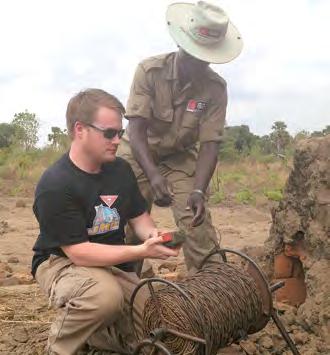
Like Pate, Geary Cox (’06, ’08M, ’19Ph.D.) was introduced to mine action at CISR as an undergraduate English major in need of a summer job. Little did he know that he would become a full-time staff member. “Working on The Journal was surreal — when I started, I barely felt competent copy editing let alone working closely with humanitarian experts from around the world — but it was an incredible experience and underscores what a resource JMU has,” he said.
After eight years at CISR, Cox now resides in Washington, D.C., as a senior conventional weapons destruction advisor at the Department of State. He said the State Department will provide more than $91 million to support train-and-equip projects that strengthen Ukraine’s demining and explosive ordnance disposal capac-
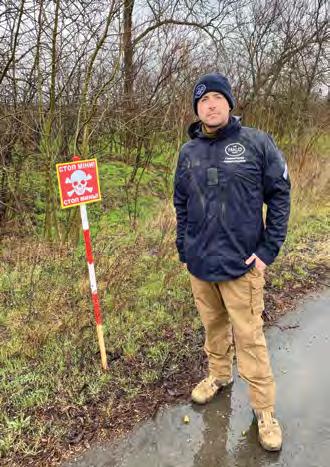
ity, including risk education to teach citizens how to avoid remnants of war — further preventing death and injury.
“It’s devastating to think what Russia’s ongoing occupation of Ukraine will mean for millions of people long into the future,” Cox said. “But I think the mine action community has been quick to recognize the need and offer all kinds of creative assistance. [In January], a Ukrainian team visited Cambodia to exchange information on best practices for clearing explosive items. So you really see the community coming together to support the people of Ukraine.”
Before Ed Lajoie (’11) rose through the field officer ranks to become head of operational compliance at The HALO Trust, one of the largest demining organizations in the world, he was an assistant project manager and research specialist at CISR, planning the Senior Managers’ Course in Conventional Weapons Destruction on campus. Through CISR, he made contact with HALO. “I think it was partially my experience with CISR which helped get me hired at HALO, especially considering I was quite young compared to the typical HALO recruit,” Lajoie said.
In the spring, Lajoie made a third trip to Ukraine with HALO to provide training and guidance to the teams on the ground, and ensure clearance was being conducted safely and efficiently. More than 700 HALO employees work in Ukraine to protect lives and restore livelihoods at risk from landmines and other explosives. “Huge swaths of farmland are contaminated and can’t be safely used for planting in a country long considered one of the world’s breadbaskets,” Lajoie said.
HALO believes in helping wherever and whenever it can. “We won’t leave our staff from Ukraine, who make up the majority of our employees in the country,” Lajoie said. “For them, this is not just a job but a duty, and we are proud to support them in making their country a safer place.”
Ken Rutherford, professor of political science, knows too well the dangers conventional weapons pose to civilians. He lost his legs to a landmine in Somalia, after which he became an international mine-ban activist and served for nearly a decade as CISR’s director. He holds discussions on the Russia-Ukraine conflict in his Global Politics and International Law classes. “The casualties in the war on both sides combined would equal 15 JMU student enrollments in one year. And these are just soldiers,” Rutherford said, according to recently released U.S. intelligence.
In 1985, he visited Ukraine when it was part of the Soviet Union, remembering its strong sense of national pride. As the war in Ukraine stretches into its second year, it’s unclear when the explosions will wane into a ceasefire. “You never underestimate how people are going to fight for their homeland. You can’t measure that in tanks, planes and guns … There’s no place like home,” Rutherford said.
“The casualties in the war on both sides combined would equal 15 JMU student enrollments in one year.”
— KEN RUTHERFORD, professor of political science(Above): In 2012, Geary Cox (’06, ’08M, ’19Ph.D.) experienced his first controlled demolition in a minefield. (Right): Ed Lajoie (’11), head of operational compliance, by a HALO task near Snihurivka, Ukraine EDITOR’S NOTE: Amy Crockett (’10) worked at CISR for 12 years before becoming a content producer and editor for University Marketing and Branding.
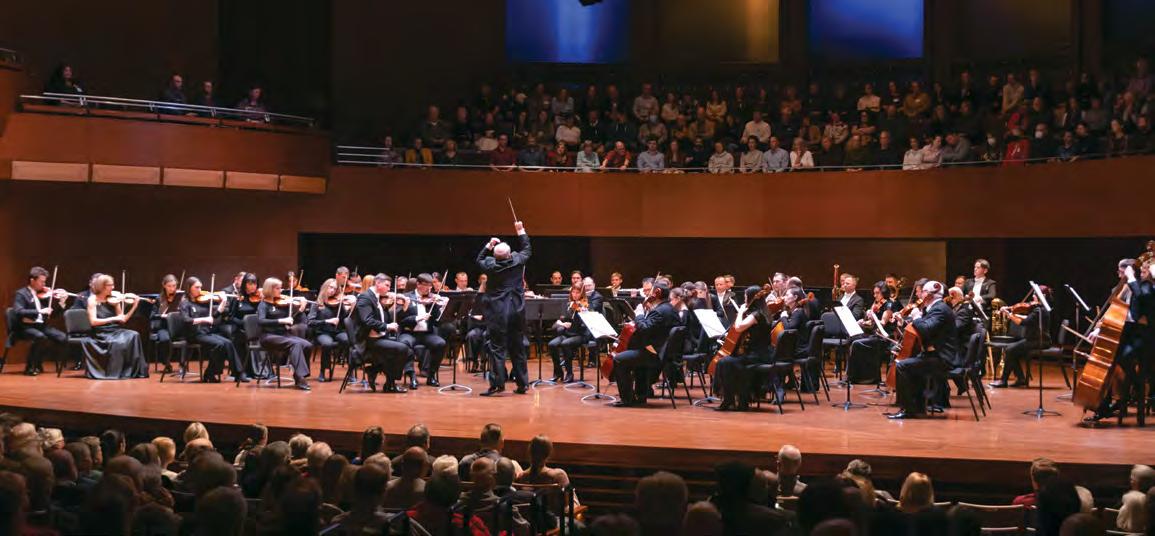
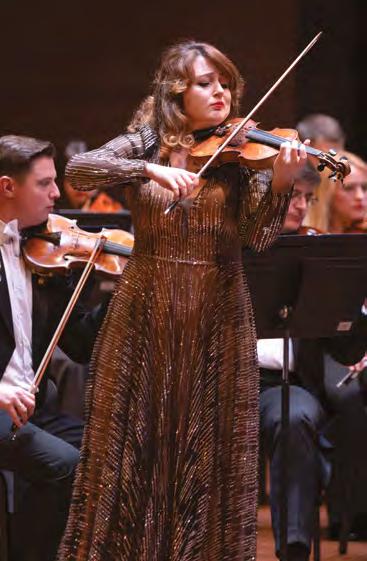 By Sarah Eccleston (’23)
By Sarah Eccleston (’23)
OOn Feb. 3, the Lviv National Philharmonic Orchestra of Ukraine performed at the Forbes Center for the Performing Arts as part of its six-week U.S. tour. The program, which consisted of a broad range of classical and folk compositions — many of them Ukrainian — brought standing ovations for the 68 musicians from western Ukraine.
The orchestra booked the tour long before Russian President Vladimir Putin’s full-scale invasion of the country in February 2022, but the Forbes Center performance took on added significance against the backdrop of the ongoing war, which had claimed more than 8,300 lives as of March and displaced 8.1 million Ukrainian citizens.
Dozens of those refugees were in attendance at the Forbes Center performance. Village to Village, a nonprofit that helps displaced groups from around the world resettle in the Shenandoah Valley, coordinated free tickets for members of the local Ukrainian refugee community.
One of those in attendance was Alex Stupak, a classical music enthusiast, piano teacher and for-
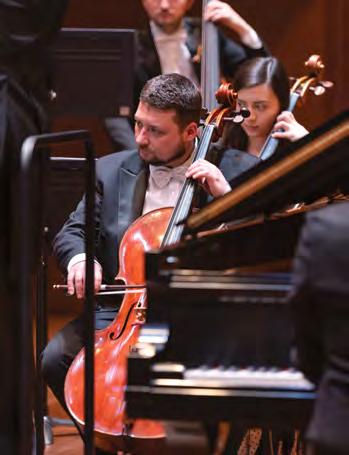
mer Lviv resident. Many of Stupak’s friends are still in Ukraine, where almost daily alarms signal the threat of bombs. Although the danger deters some people, Stupak said, Ukrainians often stay outside, drinking tea or coffee under the night sky. “They don’t fear death.”
Despite their courage, power outages plague much of the country, said violinist Solomomiia Onyskiv. Even in western Ukraine, which borders Poland, Ukrainians only have three to four hours of electricity a day, which could go on at any time, including in the middle of the night while they are asleep.
“We were prepared for this situation because we knew before, we understood, that Russia would be bombarding our activities, our infrastructure,” said cellist Denys Lytuvynenko.
To get through the winter, they used heaters and generators to power and warm their homes.
Although the war has affected western Ukraine, most of the fighting is in eastern Ukraine, closer to Russia. When refugees came flooding out of the east, Lviv families and individuals housed them. “Almost everybody had somebody in their house or helped somehow,” Onyskiv said.
About three weeks after Russia invaded, 2 million Ukrainians were internally displaced, 200,000 of whom temporarily stayed in
Lviv, which previously had a population of 750,000, according to National Public Radio. Onyskiv said the orchestra halted their musical activities for a few months to help eastern Ukrainians.
It was difficult for Lytuvynenko to leave the country because of his circumstances. He has a 7-month-old daughter, and all Ukrainian men between the ages of 18 and 60 are subject to marital law, meaning they can’t leave the country unless they fit into a specific category. “It’s difficult to leave the country,” Lytuvynenko said. “All the time, you need to ask, ‘May I go?’”
Once male orchestra members were approved to leave the country, they began a lengthy journey. Because of the war, Lytuvynenko said, “the sky is not open” — no one
is allowed to fly in or out of Ukraine. The orchestra took a 12-hour bus ride into Warsaw, Poland, about 300 miles away from Lviv. Then they boarded a flight to the U.S., where they performed at a series of venues before reaching the Forbes Center. After leaving Harrisonburg, they performed at Carnegie Hall, the Kennedy Center and Radio City Music Hall.
Although the JMU community was excited to host the ensemble, Theodore Kuchar, the orchestra’s conductor, said not every location they’ve visited shared the same enthusiasm. “Many people simply reacted to us with the understanding that this is a pity tour for Ukraine,” he said.
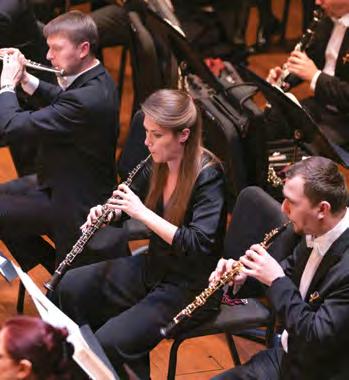
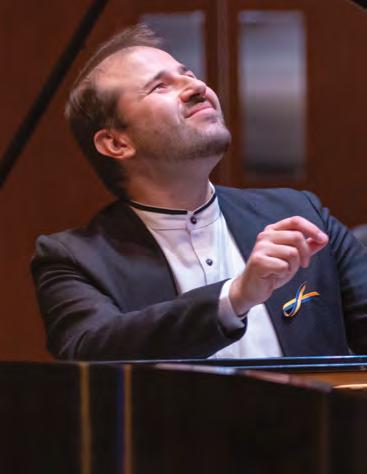
Kuchar has led orchestras in Asia, Australia, Europe, the Middle East, North America and South America. Born and

raised in western Ukraine, he wanted to bring the orchestra from his homeland onto the international stage. Kuchar said it’s a “very fortunate position that we get to be the cultural ambassadors for Ukraine, especially because it’s such a very difficult time for the symphony.”
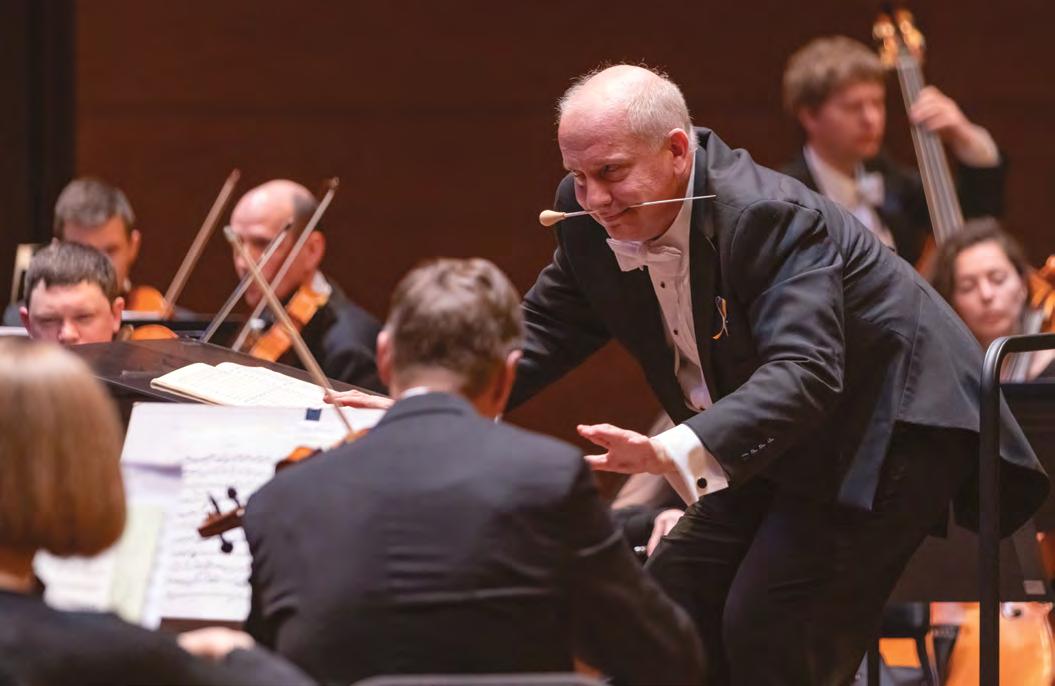
At one point during the performance, Kuchar placed the baton in his mouth and conducted solely with his hands.
Toward the end of the concert, the orchestra performed a traditional Ukrainian folk song. Refugees sitting in the balcony behind the stage waved large Ukrainian flags while the orchestra members below them joined in. The spectators once again sprang to their feet to show support for Ukraine.
“We were prepared for this situation because we knew before, we understood, that Russia would be bombarding our activities, our infrastructure.”
— DENYS LYTUVYNENKO, cellistConductor Theodore Kuchar’s passion was evident during the group’s performance.
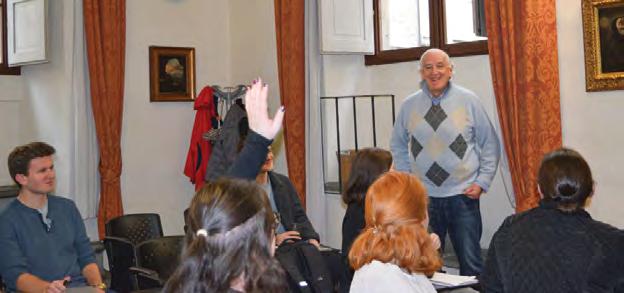
 By Federigo Argentieri
By Federigo Argentieri
IIn the spring semester of last year, while I was teaching my first class about EU foreign policy at JMU, Russia attacked Ukraine. It was Feb. 24, 2022. Consequently, the course had to change drastically, and my teaching became almost entirely focused on following and analyzing the unfolding of this crucial event and its impact on the European continent and beyond.
This unexpected development also gave me the opportunity to put into practice, for the first time in such a complete manner, one of the domains of my scholarly activity, which is a privilege not often granted to a professor who also does research. Such domain is Ukrainian studies, which I began working on at the end of the last century, which has proven particularly useful to help explain the Russian invasion.
Following such developments with a group of great master students, who proved genuinely interested in the unfolding of history before their eyes, was quite the experience. We may have slightly overlooked other parts of the world, but in turn we embraced all possible aspects of the conflict — from remote Soviet antecedents to mutual perceptions, the cultural and linguistic dimension, Czarist-SovietRussian imperial ego and the chances of it being diminished or erased by a multipolar Euro-Atlantic community, cyber war and asymmetric conflict, use and abuse of fake news, and much else.
The learning experience was definitely productive for all of us, as I myself had to test my acquaintance with the European continent, its organizations and the constantly shifting dynamics between countries, regions and identities. I am convinced that the hands-on approach we apply to our teaching in the European Union Policy Studies program, whereby students follow events on the European continent as they unfold, makes the object of their studies less dry and more digestible.
In class, students were able to see the EU in real time as we followed its daily response to the war through videos, journalistic reports, parliamentary sessions and speeches by its leaders. Newly elected Roberta Metsola of Malta, president of the European Parliament, European Commission President Ursula Von der Leyen, European Council President Charles Michel and High Representative of the Union for Foreign Affairs and Security Policy Josep Borrell traveled repeatedly to Kyiv, Ukraine, delivered speeches and came out with declarations, press statements and grand gestures. They conveyed encouragement and solidarity with the Ukrainians, denounced Russian aggression, required investigation of war crimes, and transmitted an image of cohesion and efficiency seldom seen before in what are unprecedented circumstances.
The only term of comparison can be the conflict in the former Yugoslavia in the 1990s. However, the different size of the countries involved, the absence of nuclear weapons and other factors created a rather different situation. In the Yugoslav Wars, the then-newly born EU produced an initial period of great confusion before NATO arrived in 1995 with a strong mandate to streamline action and impose a truce in the tormented Republic of Bosnia and Herzegovina.
By contrast, the train ride from Poland to Kyiv on June 15-16, 2022, by Mario Draghi, former prime minister of Italy; Emmanuel Macron, president of France; and Olaf Scholz, chancellor of Germany, who were eventually joined by Klaus Iohannis, president of Romania, belongs to the iconography of the current conflict and is already recorded in history. Four top executives of significant EU member states joined forces to show their commitment to the Ukrainians, raising bitter sarcasm from
the Kremlin leadership and much applause worldwide. The whole process was capped with unanimous approval on June 17, 2022, of the path ultimately leading to EU membership of not only Ukraine, but also Georgia and Moldova, two other countries long tormented by Russia’s revanchist appetites.
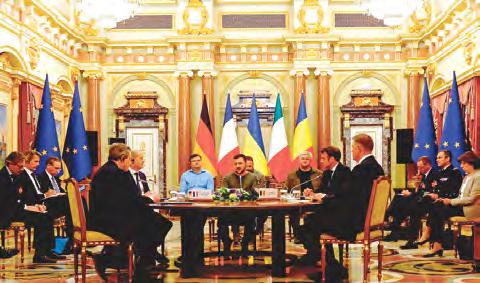
In summary, after more than a year of war in the heart of Europe, the EU has been tested in a radical manner as to its ideals, purposes, objectives, and medium- and
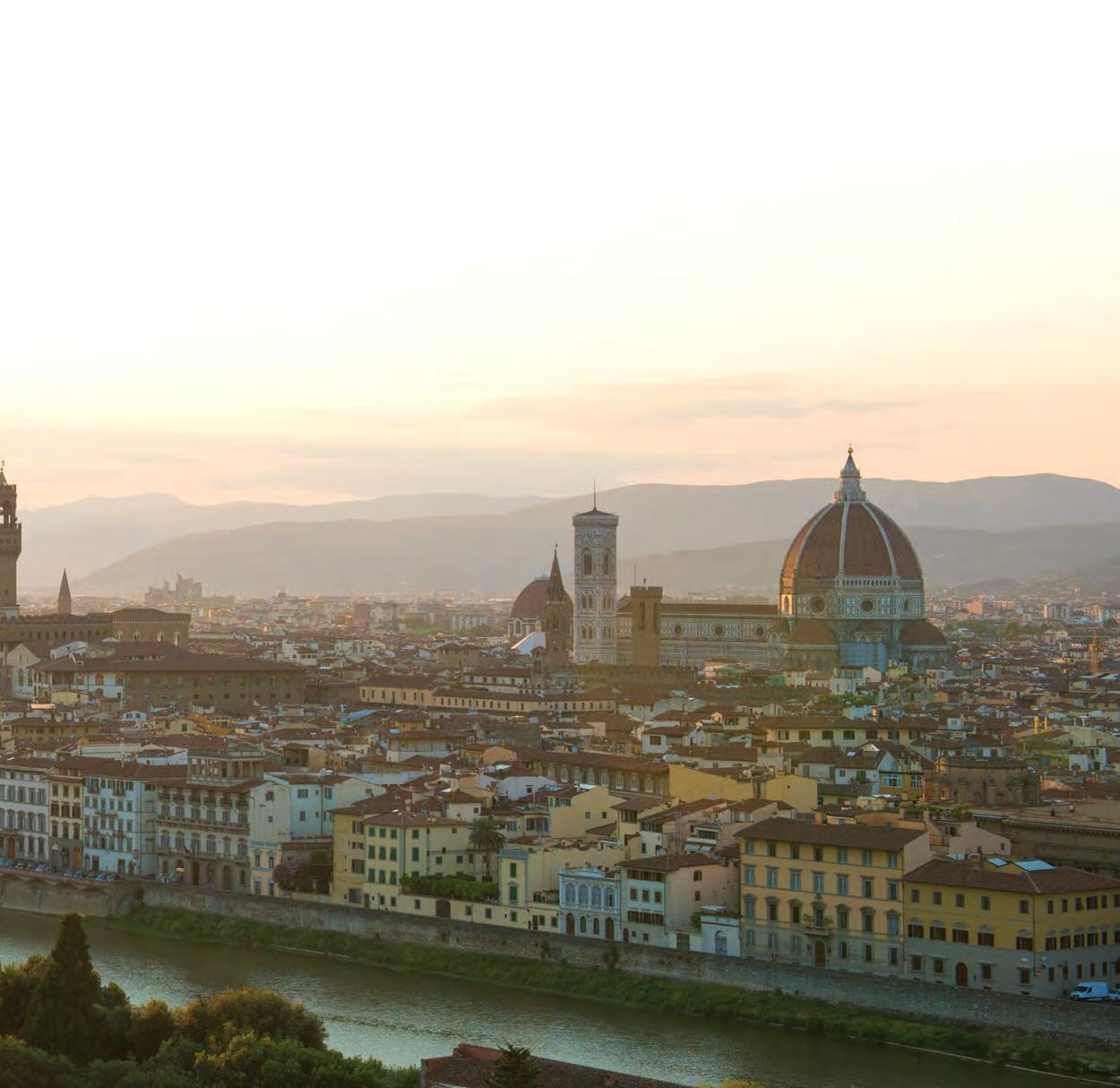
long-term perspectives — and has responded convincingly. Aiding Ukraine to defend itself from an illegitimate criminal aggression has become the foreign policy priority: The outcome of the conflict will no doubt define the future of the continent for a long period of time. Just as World War II paved the ground for the creation of the EU, the Russian war of aggression might trigger its final transformation into a stronger political, diplomatic and military entity.
While I started teaching the EU foreign policy class in the spring semester to a new cohort of graduates, I will continue to use this successful hands-on approach, with the confidence that it will help them make sense of the current tragedies and the institutional developments they may trigger on the European continent. Nothing can compare to studying events happening in Europe as they happen, while living for a year in one of the member states of the EU.
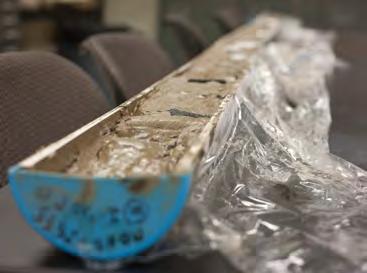
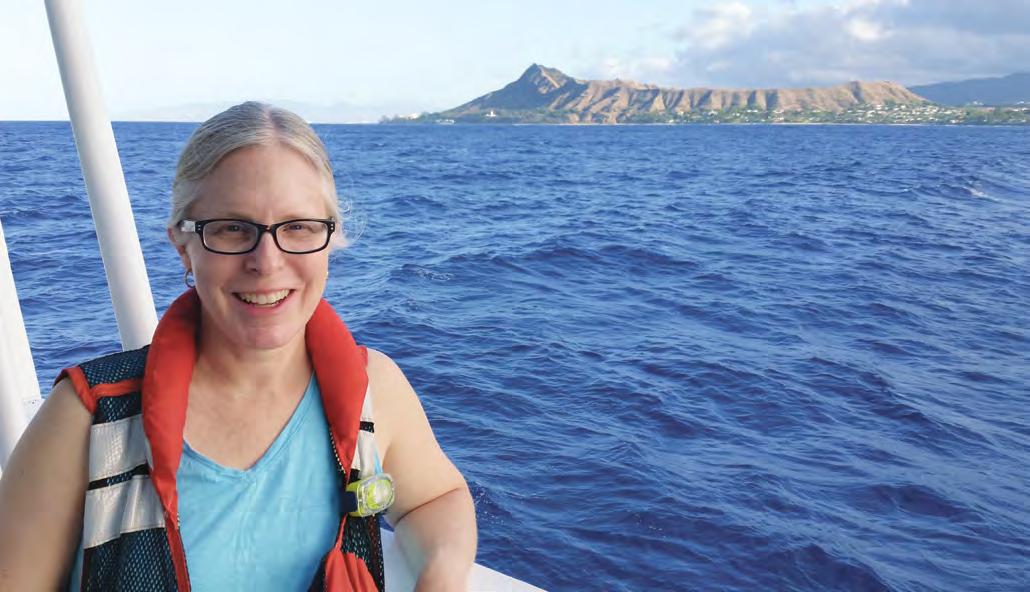 By Jim Heffernan (
By Jim Heffernan (
Kristen St. John’s research primarily focuses on deciphering marine records of iceberg and sea ice-rafted sediments. Before Russia invaded Ukraine last year, she was to serve as the co-chief scientist of an international team studying climate change in the Arctic Ocean. The project was put on hold. Madison spoke with St. John, professor of geology and environmental science, about the expedition and what the delay means for her research long-term.
Madison magazine: What was the nature of your research that was delayed by Russia’s war with Ukraine?
Kristen St. John: I was part of the International Ocean Discovery Program (IODP) Expedition 377: Arctic Ocean Paleoceanography (ArcOP). The purpose was to recover long cores of sediment from the Arctic Ocean seafloor at a location in international waters between the North Pole and Russia in order to get a long, continuous record of past climate change for the last 50 million years. It was a huge undertaking. A scientific ocean drilling
research vessel and two icebreakers were ready to support a team of about 30 scientists from around the world in this research.
Madison: When was it supposed to take place?
St. John: Fifty days in August through September 2022.
Madison: Who made the call to postpone it?
St. John: The European Consortium for Ocean Research Drilling (ECORD) Coun-
cil, which is the European “branch” of IOD.
Madison: How do you feel about the delay?
St. John: It was (and is) tremendously disappointing, but understandable. The unexpected, unprovoked and horrific war by Russia in Ukraine is having ripple effects across the globe — all the way to the Arctic.
HHarrisonburg’s reputation as “The Friendly City” was built on kindness not only toward our friends and neighbors, but also toward strangers in need. As an official Church World Service refugee resettlement community, the city has a longstanding tradition of welcoming people from countries ravaged by war, poverty and economic instability.
The Church World Service Harrisonburg Immigration and Refugee Program has been resettling individuals and families in the city and surrounding areas since 1988.
“We’re dedicated to helping new neighbors integrate and thrive, reaching their full potential as contributing members of the community,” said Emily Bender, CWS Harrisonburg’s associate director of development and communications.
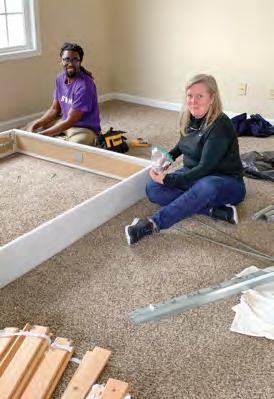
Bender said the region has a lot to offer refugee families. These families tend to do better in communities with access to public transportation, adult English-as-a-second-language classes, a school district that provides support for English language learners and available jobs, she said, adding that the food-processing facilities and distribution centers in the area attract a large immigrant workforce.
“This is also a friendly, welcoming and generous community,” she said.
Part of a faith-based global network, CWS Harrisonburg provides a wide range of services, including initial reception and welcome; basic needs like housing, clothing, food and medical supplies; employment and career training; children and youth programming; mental health and wellness; case management; legal services and emergency response.
To date, CWS Harrisonburg has assisted more than 200 local Ukrainians with finding work, enrolling in English classes, placing their children in public schools, scheduling health care appointments and other needs. The organization has several case managers who are focused exclusively on helping new arrivals from Ukraine.
Bender said the most recent wave of Ukrainians, who have been displaced by the ongoing war in their home country, have unique
needs. “I think one of the things to keep in mind is that they aren’t arriving through the traditional refugee admissions pathways,” she said. They are here on what’s known as humanitarian parole, which allows them to stay in the U.S. for two years.
“Nobody chooses to flee their home when there is war or violence,” Bender said. “But certainly there should be access to permanent protection like the refugee and asylum program for all those who are in need.”
Village to Village, a local nonprofit ministry founded in 2016, works hand in hand with CWS Harrisonburg to ensure people who are displaced feel welcome and have what they need to become contributing members of the community.
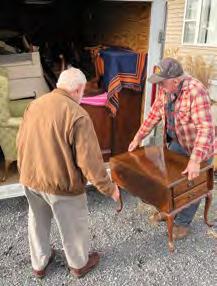
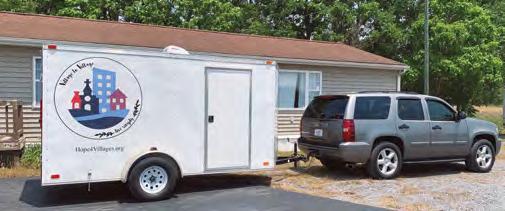
“Our goal [for them] is self-sufficiency,” said Director Heidi Dove. “It’s not to give handouts; it’s not going in and trying to be their savior. It’s teaching them skills, so they can find their way in the community for however long they choose to be here.”
Village to Village started working with CWS five years ago, putting together welcome boxes for refugee families at Christmastime. The organization now collects items from the local community throughout the year — everything from clothes to toys to backpacks to furniture and dishes. Dove said tea kettles are a popular request from refugee
“We’re dedicated to helping new neighbors integrate and thrive, reaching their full potential as contributing members of the community.”
— EMILY BENDER , CWS Harrisonburg’s associate director of development and communications
Native languages spoken in Harrisonburg City Public Schools
Harrisonburg is a welcoming community where individual differences are celebrated, residents are valued and supported, and opportunity is made available to all.
No. 10 Harrisonburg ranking among Virginia cities with the largest Ukrainian communities
72 Number of birth countries represented in Harrisonburg City Public Schools
7 Number of home languages in which HCPS provides communications and translation
16.3% of residents born outside the U.S.
310 residents of Ukrainian ancestry
53,558 city population
11.2% HCPS students who identify as immigrants
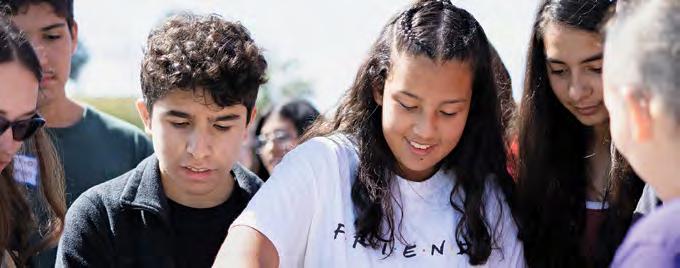
Madison: Were JMU students going to be involved?
St. John: Not in the shipboard phase. However, I would have been bringing sediment core samples back to JMU and would have involved students in that laboratory phase of the research.
Madison: Are there plans to do the research following the war?
St. John: Yes, but when is uncertain. It depends on when it is safe to be in waters near Russia. And being able to contract with icebreakers outside of the Russian fleet. And, it will depend on when the ECORD can dedicate the funding for such an expedition. It is very expensive to do this type of work. We consider it “high risk, high reward” because the climate record at this location is so valuable but challenging given its location.
Madison: What does it mean for your research long term?
St. John: So many research plans have been postponed for the entire international team of scientists who were going to be part of this expedition. And for other scientists who would have benefited from the cores we recovered, who could have sampled them later for a wide range of research projects. In studying the long-term history of climate change, the Arctic is a missing piece of understanding global climate change. It is a real loss. Many of us are shifting our focus for the time being to other areas farther from Russia. I am still focusing on reconstructing past climate from ocean sediment records but from other site locations. And focusing on working with core samples recovered earlier on other expeditions in other locations. Also, after the ArcOP expedition was postponed/ cancelled, I was invited to be the co-chief of a different IODP expedition that focuses on some related questions about past climate, that can be addressed by recovering cores from the ocean floor near Svalbard, Norway. It is IODP Expedition 403: Eastern Fram Strait PaleoArchive, which will take place from early June to early August 2024.
families, as are bicycles, since most families do not have a car to get around town.
During the COVID-19 pandemic, Village to Village began helping with local move-ins. In 2022, they helped more than 100 families relocate to the area. “We go in and make sure the place is clean, we wash all the dishes, we put sheets on the bed so they can come in and be ready to go,” Dove said. “We try to make it feel like home.”
As the organization has grown, it has added new services. Last year, Village to Village hosted a dinner that raised more than $15,000 to help local Ukrainian families with the costs of filing for visas and other paperwork. In September, it began providing monthly refugee meals. “The majority of the people right now are Ukrainian families,” Dove said. “We fix a meal for them. We sit and talk with them. We have activities for the kids. It’s really just a time for them to come together and have community with each other.”
Village to Village has a small staff and relies on volunteers. Dove said the most rewarding part of her job is the relationships she has made with the families and the impact the organization is having on the community.
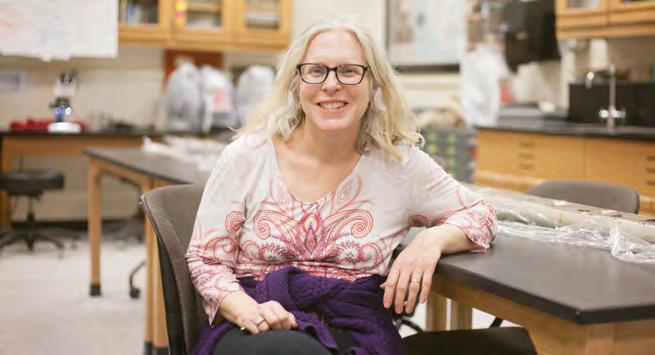
“I’ve seen moms walk out of our warehouse sobbing, because they’re so grateful and they can’t understand why we do what we do. But we just love people and want everyone to feel welcome.”
https://cwsharrisonburg.org https://hope4villages.org
“Our goal [for them] is self-sufficiency. It’s not to give handouts; it’s not going in and trying to be their savior. It’s teaching them skills, so they can find their way in the community.”
— HEIDI DOVE , Village to Village director
“It was (and is) tremendously disappointing, but understandable. The unexpected, unprovoked and horrific war by Russia in Ukraine is having ripple effects across the globe — all the way to the Arctic.”
— KRISTEN ST. JOHN, professor of geology and environmental scienceSt. John became interested in geology in college after initially studying international relations and political science.
Melvin Petty (’84)
In 2006, Petty and his wife, Sandra, cofounded ERP International LLC, a health, science and technology consulting firm with headquarters in Laurel, Maryland.
In executing ERP’s business model, Petty places a high emphasis on diversity, equity and inclusion. He is especially concerned with the inequalities in wealth that exist for African Americans. ERP’s motto is “Be the Best.” The company values bright minds and brilliant solutions. Employing those who are present within their communities and families, and have an impact on society, creates a productive workforce.
Petty is an alumnus of the prestigious Young Presidents’ Organization, a global leadership community of extraordinary chief executives. He supports many charitable organizations, including the Ole School Alumni Scholarship Group, and is an active mentor, spearheading ERP’s opendoor policy for aspiring entrepreneurs. The mentorship program has generated hundreds of millions of dollars in contract opportunities for minorities.
Petty advises others to be flexible. “Don’t stick to one particular thing too long,” he said. “Try a variety of encounters to bring happiness and joy to your world.”
Tim Emry (’99)
As a student, Emry was heavily involved in the Student Government Association and was elected SGA president his senior year. During this time, Emry went through what he described as a “racial awakening.” He noticed that his African American friends were subject to police harassment in Harrisonburg and in their hometowns. Emry’s passion to fight for others led him to pursue a career as a public defender in Charlotte, North Carolina.
Emry opened his own criminal defense practice in 2012. Most recently, he launched a campaign for district attorney of Meck-
lenburg County, North Carolina, challenging the incumbent with a progressive reform platform.
Emry has represented victims in class-action suits involving unprovoked and violent assaults by police during a protest march in the aftermath of the murders of George Floyd and Breonna Taylor.
He has served on the board of directors of Larry King’s Clubhouse, a nonprofit day care facility that operates in the Mecklenburg County Courthouse. He has also been involved in organizations such as the Carolina Youth Coalition and the North Carolina Racial Equity Network.
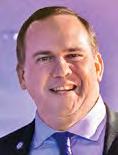
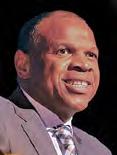
Vanessa Evans-Grevious (’93, ’97M)
Evans-Grevious has been a loyal JMU volunteer and has given back to JMU in many ways. In 2016, the Virginia governor appointed her as rector of the JMU Board of Visitors. At the time, Evans-Grevious was the second woman and first African American to serve in this capacity.
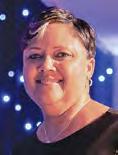
In addition to her service on the board, Evans-Grevious has served as president of the Black Alumni Chapter, member of the JMU Alumni Association Board of Directors , member of the Unleashed Campaign Steering Committee, chair of the Women for Madison Executive Advisory Council, and on numerous other steering committees and in advisory roles.
Having spent more than two decades working in college access, Evans-Grevious has primarily focused on creating pathways for low-income, African American students to not only matriculate into higher education, but to successfully navigate and graduate from those chosen colleges and universities. Her work as vice president of the Ron Brown Scholar Program has focused on one vision — to provide the tools and support to improve the lives of intellectually gifted, community- and public service-minded young people by accelerating their progress into impactful leadership roles and opportunities.
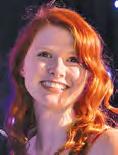
Savanah Howe (’16, ’17M)
Howe describes her work as an occupational therapist at UVA Medical Center as intellectually and emotionally challenging, and incredibly rewarding.
In addition to working at the hospital, Howe teaches in the Occupational Therapy program at JMU, helping shape future occupational therapists by sharing her passion for
“Don’t stick to one particular thing too long. Try a variety of encounters to bring happiness and joy to your world.”
— MELVIN PETTY (’84)
the profession. She works alongside faculty who influenced her as a student in the program.
Last year, she was elected president of the Virginia Occupational Therapy Association, an organization that supports and advocates for occupational therapists at the state level. Her work in academia, patient care and leadership exemplifies her dedication to connecting with and serving others.
Her Madison Experience, especially in leadership programs such as Kijiji, Make Your Mark on Madison and Big Brothers Big Sisters, redefined her understanding of leadership. These programs connected her to the philosophy of servant leadership, and she had the opportunity to develop relationships with peers and faculty who shared her values. She credits these experiences and many others for her energy and drive within her current roles.
Don Rainey (’82)
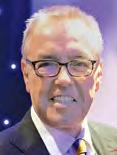
Rainey began his professional career by selling credit terminals to car dealerships and personal computers to businesses. Today, he serves as general partner at Grotech Ventures, a venture capital firm.
In the mid-1990s, Rainey saw the internet’s potential as an entertainment medium and joined a startup funded by ESPN’s founder. Rainey arranged for partnership deals with gaming sites, Universal Studios, the Ford Modeling Agency and other businesses to create entertainment content for future generations.
Rainey crossed over from running startups to funding startups when he joined Intersouth Partners in 1999, a move that would provide him with the tools to assume leadership positions with other companies later in his career. In 2007, he moved to Grotech Ventures, where he has invested in more than 20 companies, including Clarabridge, HelloWallet, Con -
tactually, LivingSocial, PetScreening, XOi Technologies, Krista, Adwerx, Payzer and Passport Inc.
After being invited to participate as a judge in a JMU businesspitch competition in 2000, Rainey worked with the College of Business to fund the competition so financial awards could be provided to students who competed. The Rainey-Shepard CoB 300 Business Plan Competition is now endowed with more than $1 million and provides $30,000 in scholarships annually to participants. “Fortune favors the brave,” he advises. “Be brave. Do things that scare you.”
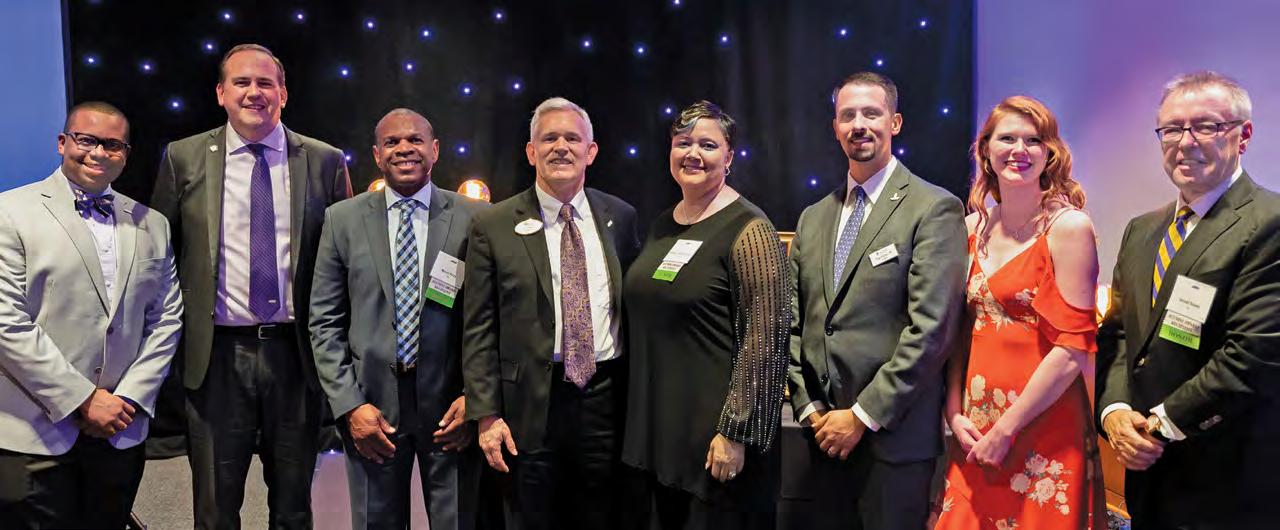
After attending JMU Summer Band Camps during his first year of high school, Williams was infatuated with the music program and began seeing himself as a student at the university.
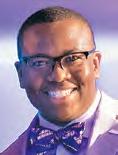
He is known at JMU for his well-rounded musical talents and various leadership positions. Williams began an internship in the Office of the President during his first year. He has since completed a minor; expanded his research focus on the role of Black male educators in the K-12 public education systems in the podcast redefinED; and participated in several leadership seminars, conferences and internships.
As the student representative to the JMU Board of Visitors since 2020, Williams values the opportunity to help make tangible, intentional changes on campus, which is something he hopes to continue throughout his professional life.
Williams plans to pursue a career in higher education administration to inspire, impact and influence the lives of students who are furthering their education at the postsecondary level. He also plans to use his experiences to empower and support minority students from underrepresented areas.
“Fortune favors the brave. Be brave. Do things that scare you.”
— DON RAINEY (’82)(L-R): Xaiver Williams (’23); Tim Emry (’99); Melvin Petty (’84); JMU President Jonathan R. Alger; Vanessa Evans-Grevious (’93, ’97M); Tripp Hughes (’09), president of the JMU Alumni Association; Savanah Howe (’16, ’17M) and Don Rainey (’82)
The most exciting time in my life after graduating from high school was my acceptance to Madison College in the fall of 1945. Like many freshmen, I entered college not knowing what to expect, but it did not take long for me to decide what path to follow in preparing for my future.
My now husband, George Cary Bailey, and I had been students at Suffolk High School in Suffolk, Virginia. I heard his name mentioned a time or two in school, but I didn’t know him well, as he was probably two years ahead of me and was drafted in 1943 to fight in World War II. We met after he returned home
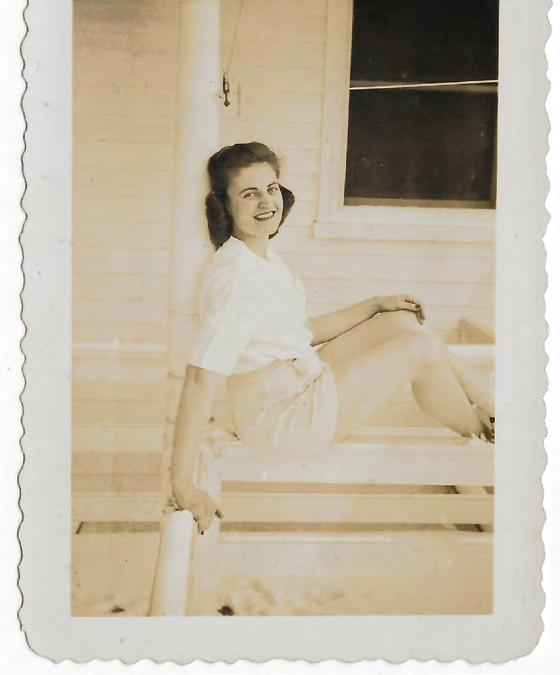
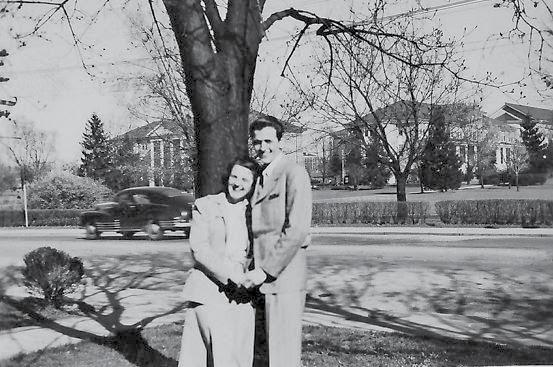
was a student at Madison College. George’s cousin was a friend of mine — she introduced us during one of my summer breaks, and we started dating.
When I returned to col lege, he would occa s ionally visit me. He had always been crazy about planes and was taking flying lessons, so it was not too surprising when he showed up one day in a plane and buzzed my dormitory. Naturally, all the girls in the dorm got a big kick out of this and were hanging out the windows and waving. I was only hoping that he would go away fast before he got caught or something awful happened!
That was the beginning of our romantic adventure. We were married July 2, 1949.
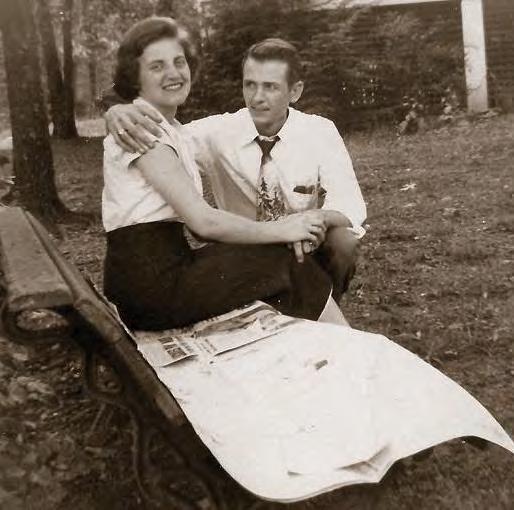
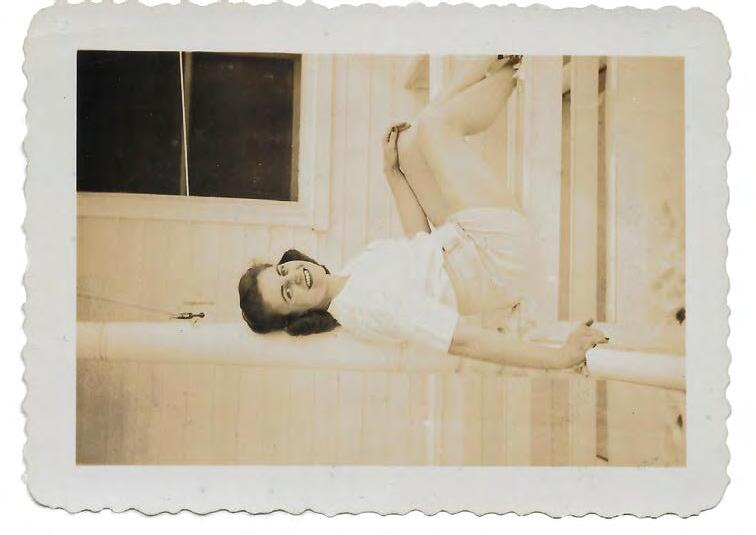
EDITOR’S NOTE: Johanna Lee Shallcross and George Cary Bailey have been married 73 years at the time of this writing. During her time at Madison College, Shallcross studied shorthand, typing, business and bookkeeping, and enjoyed taking voice lessons from Edythe Schneider, assistant professor of music. Shallcross also held scholarship jobs each semester. She credits these jobs with helping her learn responsibility.
She noted, “I worked one year for Mr. [Raus A.] Hanson, [former] professor of geography; two years for Dr. [Henry A.] Gifford, [former] dean of the college; and in my senior year, I waited tables in the senior dining hall. I was fortunate to pay a good portion of my expenses all four years, which made my parents very happy. I graduated on June 6, 1949, with a Bachelor of Science in Education.”
At Madison, Shallcross was a member of Alpha Sigma Tau and lived in Lincoln House on South Main Street before the Forbes Center for the Performing Arts was built on site.
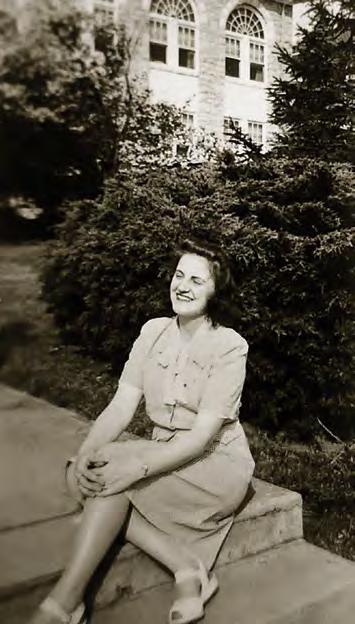
She led the way for other Dukes in her family, including son Darrell Bailey (’86), granddaughter Allison (Bailey) Moses (’15), grandson Joshua Bailey (’18) and granddaughter-in-law Stephanie (Shenk) Bailey (’09).
Spring is upon us! What a wonderful time of year here on campus. The hope and promise of seeing the trees in the Edith J. Carrier Arboretum come back to life, the Quad overcome with students throwing Frisbees and taking selfies, celebrating our Bluestone 50th Reunion (congrats, Class of 1973!), and welcoming our newest graduates into the JMU Alumni Association — there is no shortage of activity. The season is a time for reflection and a reminder to celebrate our shared connections. The Madison Experience truly lasts a lifetime because our ties as Dukes are real and deep-rooted. The bonds might change and evolve, but the relationships we make during our time on campus will shape who we become after leaving our beloved alma mater. This spring, the JMUAA celebrates a worthy milestone in creating opportunities for students and alumni to make unique and enduring connections. In May, we will conclude our second cohort with the Black Alumni Chapter Mentor Collective program. The BAC Mentor Collective enhances the Madison Experience by linking students one-on-one with an alumni mentor who is part of the BAC.
This program is built on the foundation of what it means to be a Duke — bleeding purple and opening the door for the next generation. Over the past two years, the program has matched 188 undergraduate students with 97 alumni mentors (many alumni prefer to mentor multiple students at a time), resulting in nearly 950 unique conversations. The topics of these discussions can range from getting to know one another, to addressing academic challenges and networking opportunities, to sharing resumé and interviewing best practices.
As we near the end of the program’s second year, I’m excited to share that it continues to exceed goals and expectations. Perhaps more importantly, we’re creating lasting connections between students and alumni. Students receive high-touch support from alumni who have professional experience and life’s wisdom, and can relate to the Madison Experience with personalization and authenticity.
As we welcome the Class of 2023 into the JMUAA, I’m reminded of the opportunity to create lasting connections through our shared Madison community. It can be easy to overlook this moment with the distractions of life. However, I encourage you to pause and take time to reconnect. Find that old classmate, update your contact information with the university to make sure you don’t miss out on upcoming events in your region, reach out to your local chapter (or preferred affinity chapter) — whatever will enhance your Madison Experience. Whether you’re just leaving campus or celebrating your 50th class reunion, take time to reconnect.
To learn more about the JMU BAC Mentor Collective, visit https://j.mu/mentor.
CarrieCombs (’07,
’09M), Senior Director, Alumni Relations and Volunteer Engagement, Executive Director, JMU Alumni Association
A season to reconnect
The Madison Experience truly lasts a lifetime because our ties as Dukes are real and deep-rooted.
Kathy Soule (’78) and her husband, Bob, embarked on a six-month road trip across the United States in their Tesla Model Y last year to prove that such a journey is possible in an all-electric vehicle, and they encourage others to take steps toward more eco-friendly decisions.

Before purchasing their Tesla in 2020, the Soules owned a 2010 Nissan Leaf, which they described as an “around the town” vehicle compared to the Tesla, which has a 315-mile range.
The couple had many reasons for the trip, not the least of which was Bob’s retirement. Having visited 51 national parks, they also hoped to raise money for the National Park Foundation supporting the National Park System.
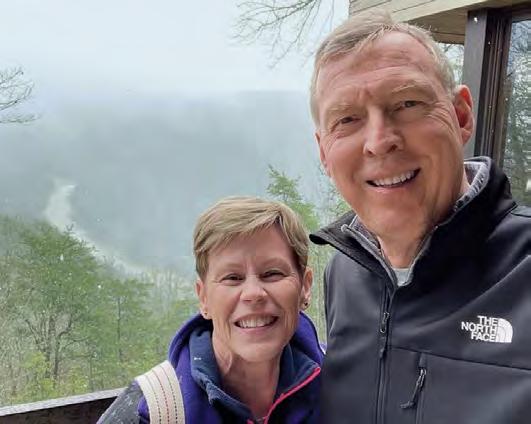
Prior to the trip, the Soules planned pit stops to ensure they could charge their car as needed. They preferred venues that supplied Tesla Supercharger stations but had to make adjustments along the way.
During a typical day on the trip, the couple began by hiking around the many national parks they visited. If the pair came across litter along a trail, they would pick it up and hold it in their car until they could dispose of it. At the end of each day, they would plan and create posts for their Instagram page and website, chronicling their journey as well as showing why solar power is key to a more sustainable planet.
The trip was meant to spread a message. Fossil fuels are one of the largest sources of air pollution from human activity and
are mainly used in gas-powered vehicles, making cars the secondleading cause of pollution in the U.S. The Soules believe EVs can make a positive environmental impact on the world.
“Everyone who buys a new gas-powered car today will likely have it on the road for another 10 to 20 years, putting out the exhaust, hurting the environment and creating more global warming,” Kathy said. “That is why we think it’s so important to inform as many people as possible about electric cars and as quick as possible. The fewer people who are buying new gas-powered cars, the better off the earth will be.”
Some argue that the infrastructure to support zero emissions isn’t available or even sustainable. However, the Soules make the point that transitioning to clean energy will not only benefit the one who makes the change, but also the planet.
“People think that if we make the change, it’s going to require us to give up our lifestyle, give up our freedom or our way of life. This is just not true,” Kathy said. “Technology is here now to stop this problem. … We can have all the stuff we have today, but we can have them run off electricity run by renewable sources.”
Off the road, the Soules have different ecofriendly initiatives throughout their home, like green-powered electricity. The couple takes part in environmental groups, such as the Natural Resources Defense Council, and their website, RunningOnSouler, informs others of the importance of greenpowered electricity.
“The fewer people who are buying new gas-powered cars, the better off the earth will be.”
— KATHY SOULE (’78)Kathy Soule (’78), above, charges her all-electric Tesla Model Y, which she and her husband, Bob, right, took on a six-month, crosscountry road trip to prove to themselves and others that gaspowered cars aren’t needed for the long haul.
On Jan. 6, Abby Zwerner (’19, ’20M) was seriously injured when a 6-year-old student shot her while she was teaching in her classroom at Richneck Elementary School in Newport News, Virginia. The child brought the weapon from home in his bookbag. Sadly, this narrative has become commonplace in the news. The shooting was the first U.S. school shooting of 2023 but the third incident of gun violence in the Newport News Public Schools in 17 months. It is also one of 16 U.S. school shootings since 1970 perpetrated by a child younger than 10 years old.
For the members of the Williamsburg Alumni Chapter, comprised primarily of teachers, this shooting wasn’t just another statistic; the narrative hit close to home.
“I’ve never met Abby, but I’m a JMU Education major,” said Heather Cline (’93), a kindergarten teacher of 30 years and alumni chapter member. “Many of my friends are JMU Education majors. My daughter is a JMU Education major. I have mentored many JMU Education majors. What happened to Abby could have happened to any one of us. In a situation that is so negative, I wanted to help bring something positive to the children in our community in her honor.”
From a desire to turn a negative into a positive, Abby’s Book Club was born.
The concept was simple. Participants could purchase books from an Amazon registry and have them shipped to a central location for the alumni chapter to distribute to area schools. Once the wish list was created and shared, books started flooding in.
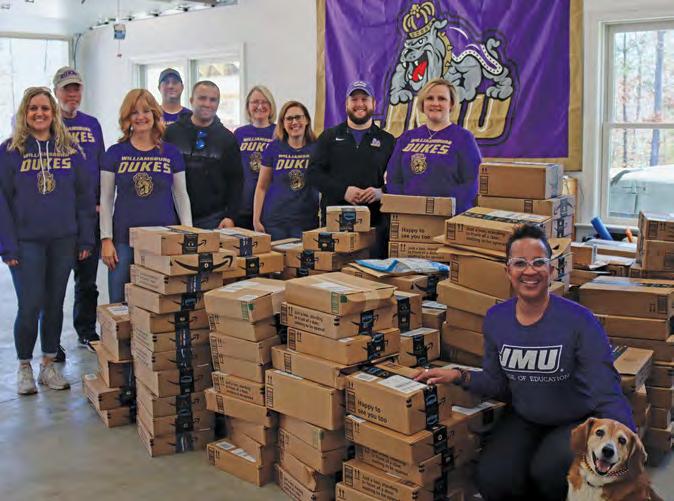
Curated by the chapter and fellow teachers, Abby’s Book Club includes titles such as The Color Monster, One Drop of Kindness, Don’t Feed the Worry Bug and, for JMU fans, The World Needs More Purple People.
Centered around the themes of kindness, empathy and compassion, these books can help children better navigate their world and understand others who are different. The Williamsburg Dukes hope the books donated through Abby’s Book Club will serve as tools teachers can use in their classrooms to promote social-emotional learning for years to come.
On March 4, chapter members unpacked and sorted the donated books. As part of the process, they affixed a sticker inside the cover of each book that read, “Abby’s Book Club: Kindness is a gift everyone can afford to give. Organized by the Williamsburg Dukes.”
Carmen Jones (’05, ’06M), chapter president and special education teacher of 17 years, hopes that Abby’s Book Club will have a long legacy.
“The goal of Abby’s Book Club was to find a way to put a positive impact on the community after such a horrible situation, and we didn’t want it to just be a one-time thing. Books last a lifetime,” Jones said. “And years down the road, students may not know what Abby’s Book Club is, but the books will still serve as a resource. And hopefully it will be a book a child makes a connection to, helps them realize their feelings are valid and gives them tools to help them handle their emotions appropriately.”
Abby’s Book Club has distributed a total of 615 books to 48 schools in the local and surrounding area. Books were donated from 250-plus individuals living across 14 states.
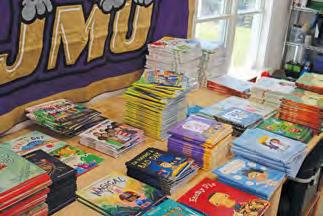
Emily Warden graduated just six years ago with a Bachelor of Arts degree and a concentration in Metals and Jewelry. Now, at 27, she is the founder of Emily Warden Designs with a flagship jewelry store in Richmond, Virginia, and a debut on the 2023 Forbes 30 Under 30 Art & Style list with fellow artists and creatives, including celebrity entrepreneur Hailey Bieber.
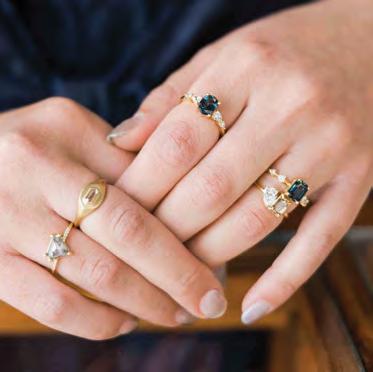
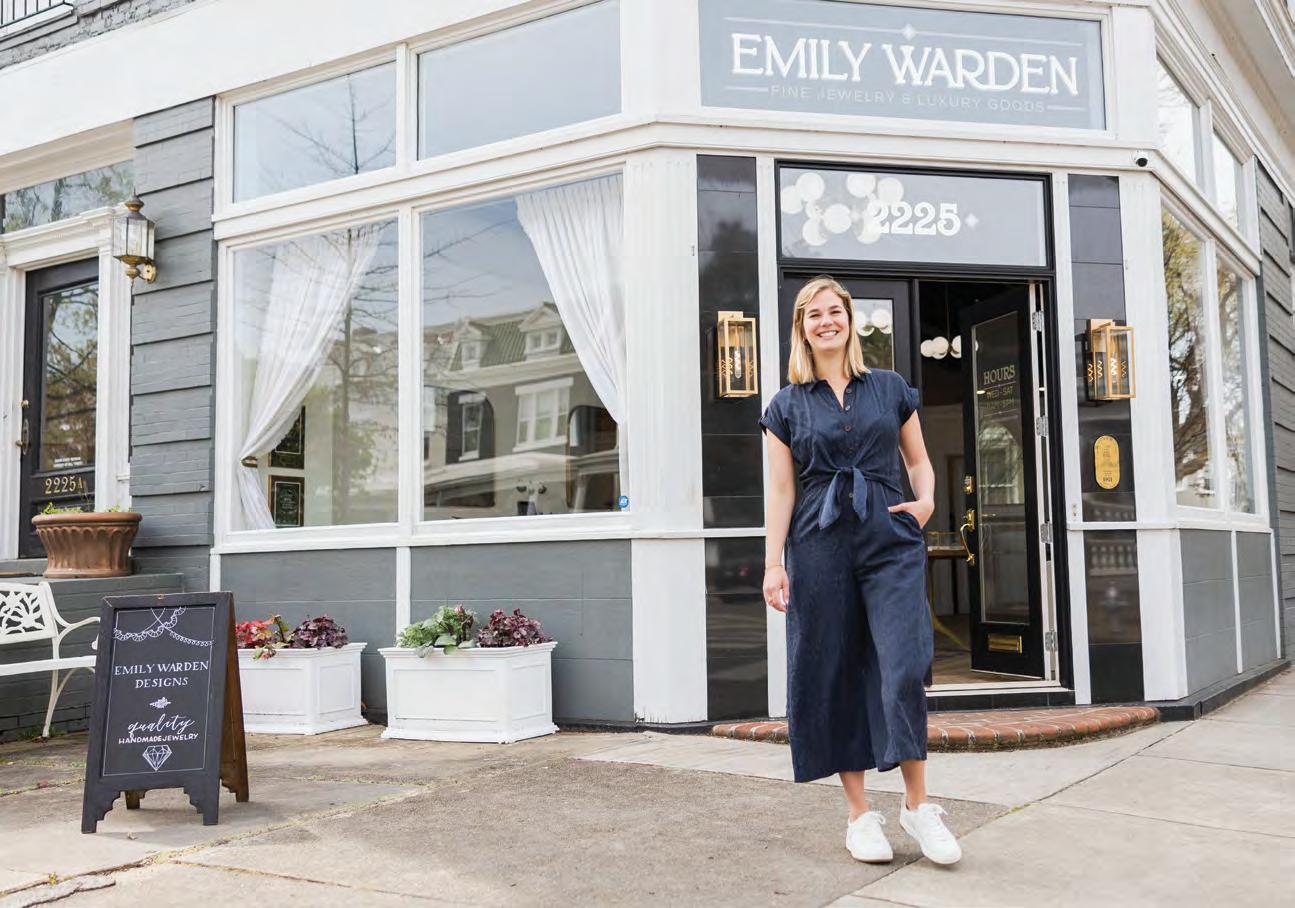
“It felt surreal,” Warden recalled upon learning of the recognition. “I applied through a pretty
BY CAMERYN NORRIS (’22)lengthy process and had no idea how far I would make it, but it felt very affirming when I found out!”
The Forbes designation came on the heels of Warden’s decision to relocate the business from Richmond’s Fan district to an expanded storefront in neighboring Hanover County last year, with a beautiful new showroom for her collections as well as a studio.
“For the past few years, my goal was to move into a bigger studio [and] storefront space to accommodate my growing team and inventory,”
Warden said. “We finally achieved that goal last [year] and have been settling into the new space.”
Warden’s experience as a Metals and Jewelry student in the School of Art, Design and Art History helped kickstart her career. “A lot of my jewelry journey started in my metals class at JMU,” Warden said. She referenced SADAH’s learning environment as key to her work ethic, which in turn led to her success. “I enjoyed not only what I was doing, but the space and environment JMU provided,” she said.
SADAH professors Mark Rooker and Allyson Mellberg Taylor served as Warden’s mentors.
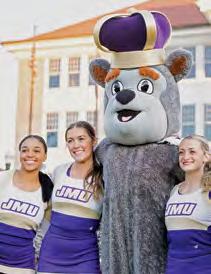
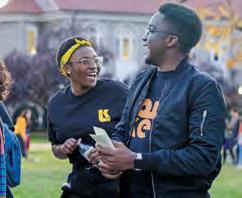
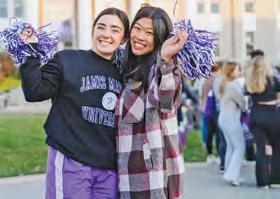
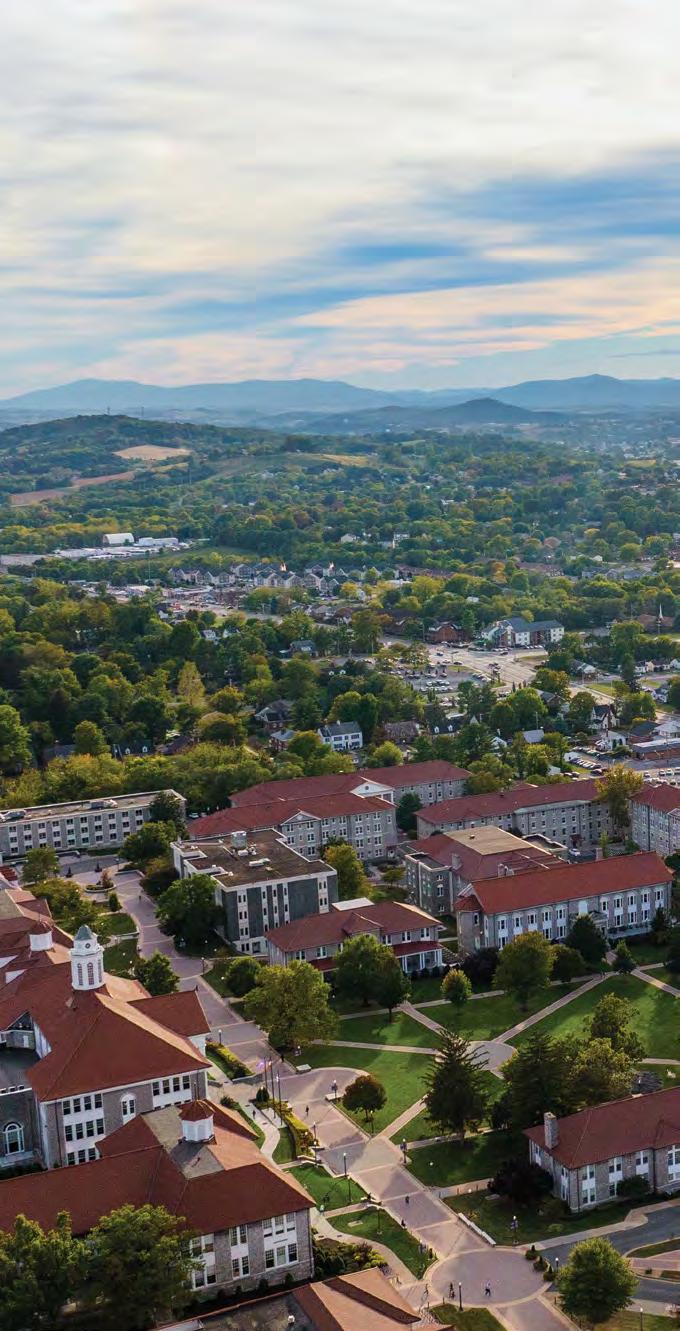
“Right from the start, she seemed to have a vision for her future and a plan for how to achieve it, coupled with a very high aptitude for metals,” said Rooker, Metals and Jewelry department head.
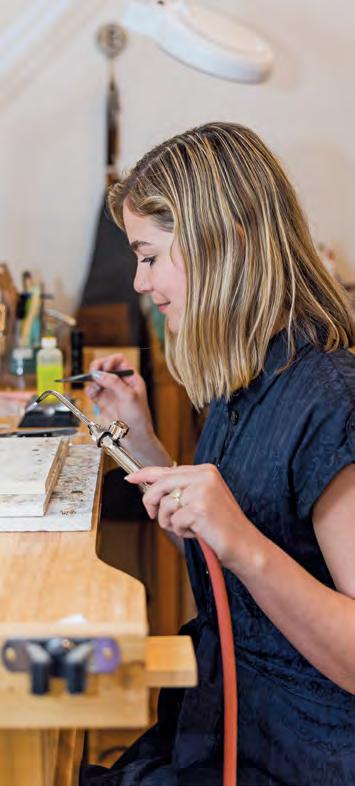
Warden plans to further develop her jewelry line. “My goals for the future would be to continue to nurture the brand I’ve created,” she said. “[I want to] create unique experiences for people who choose to work with us.”
SAVE
OCT. 27-29, 2023
Independent release; https://tinyurl.com/yc83fsp3
There is an ancient Japanese art called “Kintsugi,” where broken teaware is mended by applying lacquer mixed with gold. The newly re-bonded fragments embody the idea of “beauty through brokenness.” The cracks are highlighted, not hidden, and the newly restored piece is considered even more beautiful and valuable than the original teaware. The art, the mending and the healing represent rebirth.
Baltimore, Maryland-based singer-songwriter Brody Bond’s
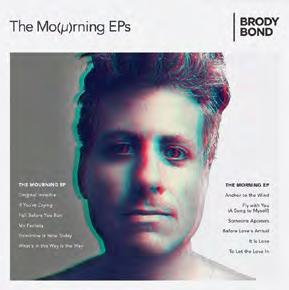
The Mo(µ)rning EPs tell this type of rebirth story. The resulting concept album, comprised of two conjoined EPs — the darkerthemed Mourning and the uplifting Morning — are about encountering the disordering and reordering of our lives. Joy comes in the morning, as the saying goes, but the discovery of this project is that joy also comes in the mourning.
At JMU, Bond was a Communication Studies major and a Music minor, and a member of The Madison Project a capella group.
https://weekonearth.com
The Week on Earth is a weekly podcast on climate change and the state of the planet. Irreverent, informative and witty, it probes the human-centered elements of climate change: our inaction, skepticism and fear, and our brazen and determined efforts to fix the things we break. Each episode features interviews and dives into deep questions — Why are we wiping our butts with old-growth forests? Why is nobody talking about climate change? Is recycling broken? — as well as up-to-the-minute environmental news from around the globe. But this is not NPR. This is two brothers asking questions — sometimes fighting, sometimes laughing — but always trying to save the planet.
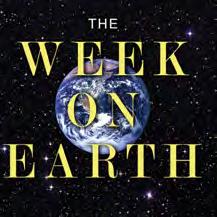
Co-host Chris Stemp, a Finance major, raises bees and chickens on a farm out side Leesburg, Virginia, while working in corporate leadership development. The Week on Earth posts new shows every Monday across all podcast platforms.
Blackstone Publishing
ISBN-13: 979-8200831166
The hurricane of 1900, the United States’ worst natural disaster, left the island city of Galveston, Texas, in ruins. Thousands perished, including all 93 children at the Sisters of the Incarnate Word orphanage — except 6-year-old Hester, who miraculously survived. Oleander City is the tale of this little girl and the volatile collision between the American Red Cross, the Ku Klux Klan and one of the most famous boxing matches in American history. The bout, organized to raise money for the recovery effort, featured the enigmatic veteran “Chrysanthemum Joe” Choynski, the most successful Jewish boxer in America, and Jack Johnson, a young hometown hero known as “the Galveston Giant.” The storied battle forged a bond between the two fighters and put Johnson on the path to becoming one of the greatest heavyweight boxers of all time.
Meanwhile, Clara Barton and the Red Cross minister to the sick and hungry as mounted vigilantes use the chaotic situation to settle old scores. After witnessing a terrible crime, Hester finds sanctuary with the ladies of the Red Cross in a heart-rending convergence of these historic figures.
Based on a true story, Oleander City is Bondurant’s fourth novel. He lives in Oxford, Mississippi, where he is the director of the Master of Fine Arts program at the University of Mississippi.
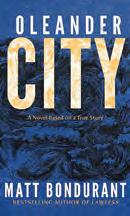
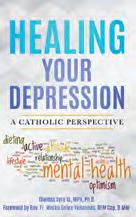 BY THOMAS SYRE SR.
BY THOMAS SYRE SR.
Independently published
ISBN-13: 979-8361877911
Let’s make clinical depression a burden of your past. This book combines Catholic faith practices with personal actions for healing. It is a timely, post-pandemic, educational and easy-to-read book for those suffering from depression, written by a Catholic health science researcher with a Foreword by a Capuchin priest and friar. Topics include daily prayer; how the body, mind and spirit affect depression; research-based, suggested changes in thinking and behaviors; therapist selection and partnering; select therapeutic modalities used in counseling; psychotropic medicine; journaling activities; and quality-of-life and happiness issues. The reader learns about the most effective use of the nation’s mental health care system for recovery.
Syre, a career university educator with a Master of Public Health and a doctorate in Philosophy, taught in JMU’s undergraduate Health Services Administration program from August 1992 to December 2005 and was recognized for his research and publishing as a Madison Scholar. He served on the Faculty Senate, was a Faculty First-Year Advisor, and assisted with faculty recruitment for the new Occupational Therapy and Physician’s Assistant programs.
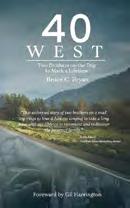 BY BRUCE C. BRYAN (’87)
BY BRUCE C. BRYAN (’87)
ISBN-13: 978-1098389864
40 West is an autobiographical journey in some ways and a collection of essays about life and that journey in others. It’s two brothers making a reflective and intentional trip to honor and celebrate their late father. Along the way, we learn about them, the man they called Dad and the world around us. Tears, laughter and thought-provoking messages are peppered throughout. It’s nostalgic, forward-looking and fun — all at the same time.
Bryan wrote the book during the COVID-19 pandemic, and was a Telecommunication and Political Science double major.
 BY AMANDA PRESGRAVES (’16)
New Degree Press
BY AMANDA PRESGRAVES (’16)
New Degree Press
ISBN-13: 979-8885049733
With energy and ideas running rampant from an early age, Presgraves leaned heavily on athletics and food entrepreneurial outlets for discovering, accepting and owning her whole self. Her journey is reflected through her ambitious and committed pursuits, as she integrates her professional foodsystem and design-thinking perspectives, and intimately weaves them with the mind-body wisdom she gained as a professional USA triathlete and an ultraendurance, off-road athlete.
In the heart of the Shenandoah Valley of Virginia, where the freshest food is in abundance and the magnificent mountains are at reach, Presgraves prioritizes outdoor adventures with her elevating community. It’s in engaging with these elements that her writing debut, The NonRecipe Book, emerged.
Presgraves approaches life like designing NonRecipe, believing that how we nourish ourselves can start with our plates and extend far beyond. A Kinesiology major and founder of the Fueled food truck, she continues to stay involved with JMU as vice president of the Swimming and Diving Alumni Association and as a frequent speaker on campus. “To this day, I’m deeply grateful for the relationships and experiences JMU fostered,” she said.
Edwin Mellen Press
ISBN: 978-1495508439
Yaklich studies legendary conductor Eugene Ormandy’s performing version of Russian pianist/composer

Sergei Rachmaninoff’s Symphony No. 1. He also explores the relationship between the two musicians, professionally and personally.
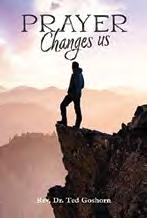 BY TED GOSHORN (’09M)
BY TED GOSHORN (’09M)
South Carolina United Methodist Advocate

ISBN-13: 979-8985149579
Many of us are accustomed to hearing how prayer changes God’s mind or life’s circumstances. But what about how prayer changes us?
Answering that question forms the nexus of Ted Goshorn’s book, Prayer Changes Us. Goshorn, an ordained United Methodist pastor, takes readers on a journey of self-discovery, finding the transformative impact of regular prayer practice and teaching how to incorporate prayer into the rhythms of life. Part 1 addresses how to pray, expanding the scope to include styles of prayer like repetition and praying scripture. Part 2 focuses on the impact of prayer on the soul, exploring the ways it makes us better disciples and brings us deeper into our relationship with God.
The book includes helpful resources on establishing a rhythm of prayer, including descriptions and how-to guides on types of prayer, Methodism founder John Wesley’s self-examination questions, and daily guides for praying the Psalms or all of scripture throughout the year.
Learn how you can better understand the heart of God through deep, focused, habitual prayer that changes us.
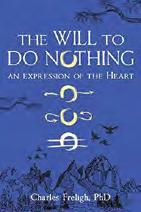 BY CHARLES FRELIGH (’08)
BY CHARLES FRELIGH (’08)
Second Arrow Well-Being
ISBN-13: 979-8986733715
The Will to Do Nothing combines understanding from psychology, philosophy, spirituality and Freligh’s own life to explore the ancient art of doing nothing. “This sort of non-doing is required in order to let yourself feel what you feel, and to allow the present moment and authentic action to happen through you, ultimately out of your control,” he said. The Will to Do Nothing examines a way of living that is real, internally at peace, authentic and fully alive.
Freligh earned his doctorate in clinical psychology and has experi e nce working therapeutically with individuals and groups, as well as consulting for organizations. His work is rooted in the healing impact of presence.
Thirty years ago, fraternity and sorority members gathered at Newman Lake to watch the boat races, one of many featured outdoor events during Greek Week in the spring.
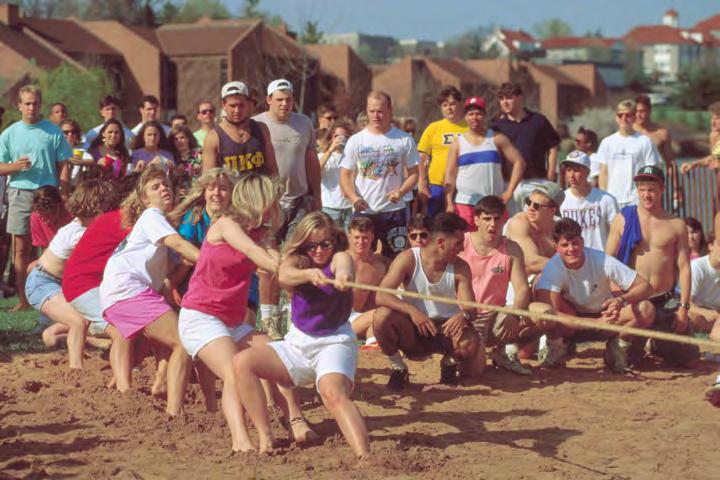
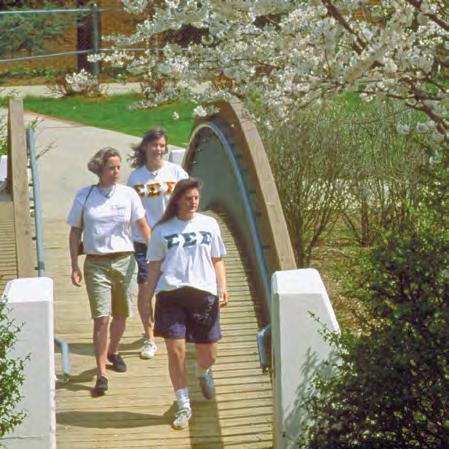
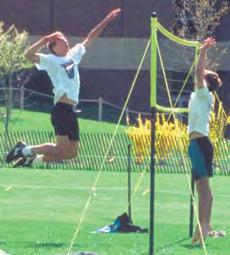
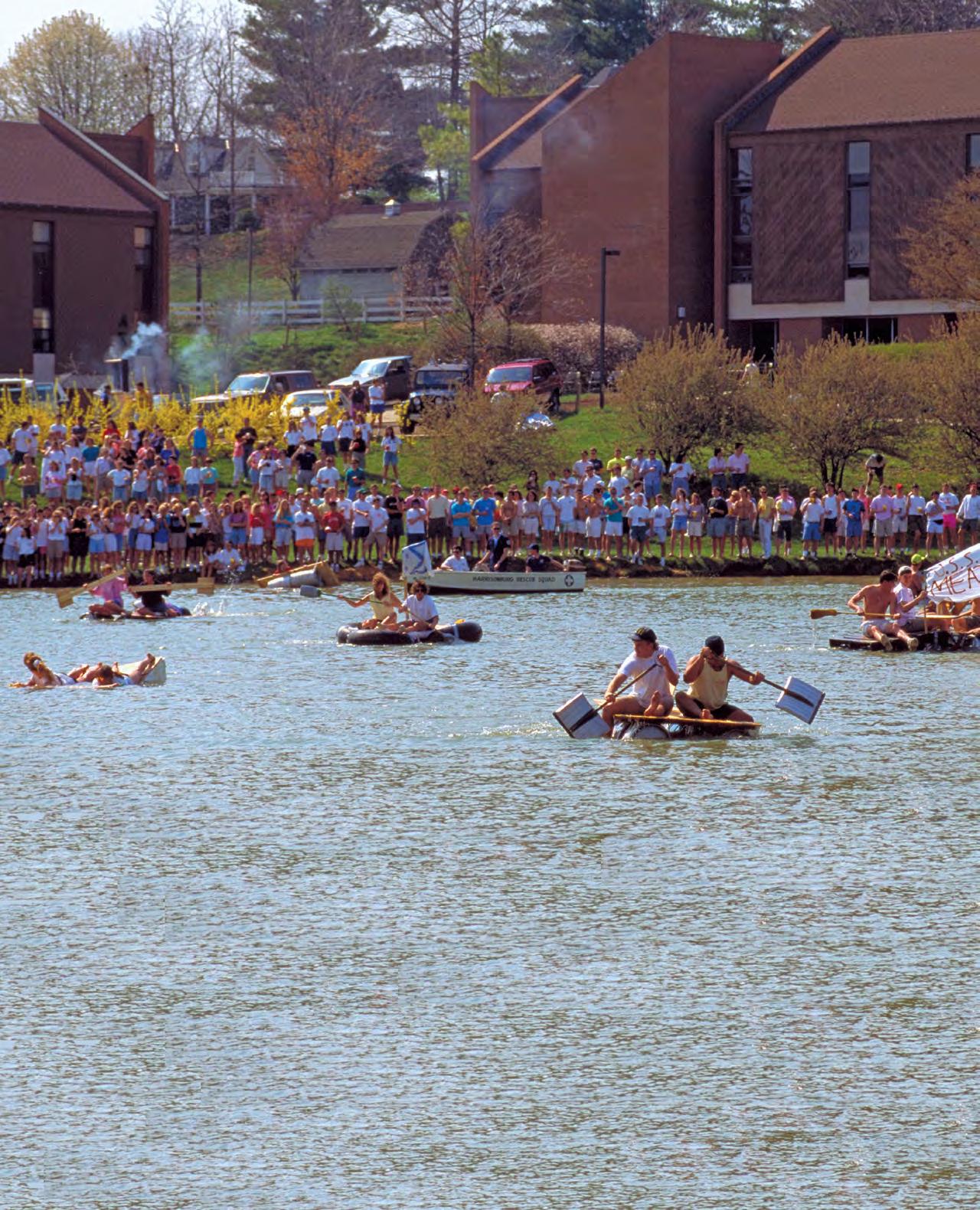
Sarah Mae (Ferland) Jones, of Hagerstown, Maryland, died Aug. 29, exactly one month shy of her 95th birthday. After graduation, Jones taught art in the Alexandria, Virginia, public schools. She also taught in Washington County, Maryland. Jones was last employed as an employment specialist in the Maryland Job Service, retiring in 1991. Born in Charlottesville, Virginia, she is survived by her daughters, son Robert Darren Jones (’86), two grandsons and two greatgrandsons.
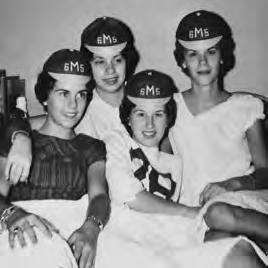
64
Vicki McQuinn Malsz and her husband of 58 years, Bob, are happily retired from the CIA. Malsz, the least athletic JMU student ever, is now a certified gym rat with a passion for yoga at the age of 80. She lives in Reston, Virginia, during the week and spends weekends with Bob on their farm on the Shenandoah River.
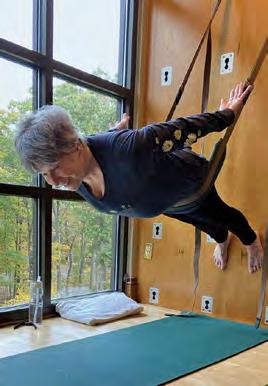
Diane Lunsford Levy Graf died June 10, 2021, after a long illness. She graduated with a Bachelor of Science degree and had a magnificent life with three children and three grandchildren who reside in Denmark. Diane taught elementary school in Virginia and then followed her husband, George Graf, overseas in 1990 when he was transferred with the U.S. Army. They lived overseas for 16 years. Diane received awards from the Army for volunteer work, including adopting and resourcing orphanages in Ethiopia.
80
Lori Mowen (’80) and Sue Cumpston (’82) recently traveled to Antarctica. “We have been to the most beautiful place in the world — our final continent — and JMU was represented,” Cumpston said.
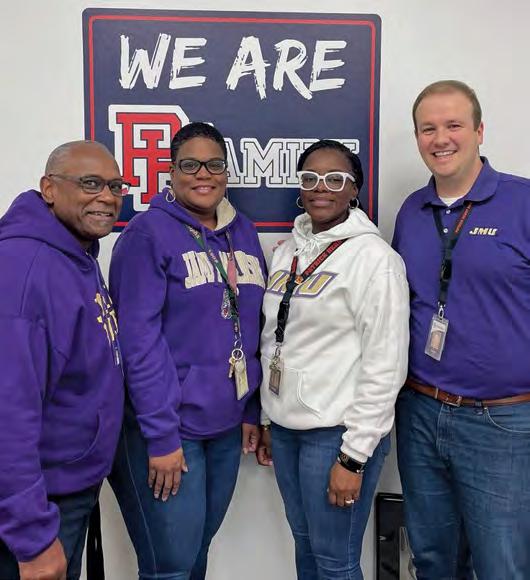
“Go Dukes!”
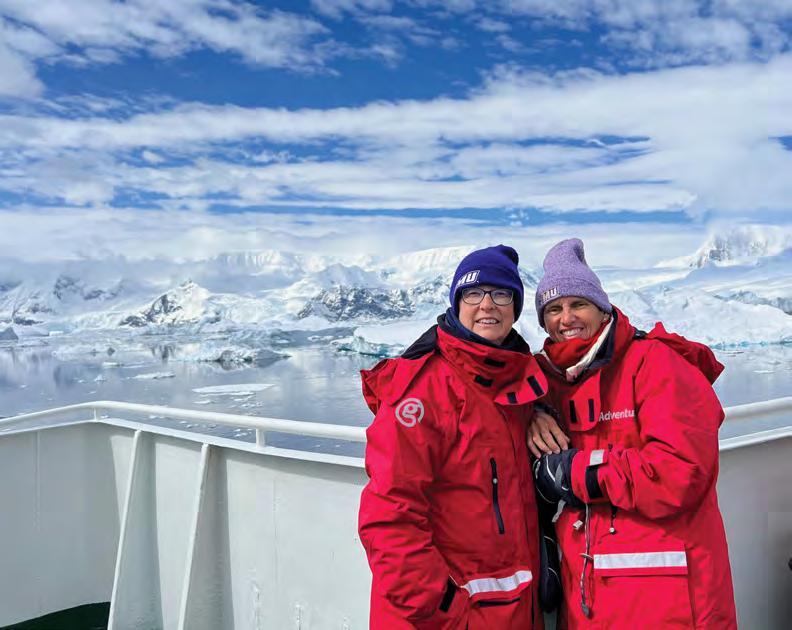
(L-R): Sharon Pearson Drotos (’82), Joanne Redford Sherlock (’82), Leanne Farrar Hanger (’82), Emily Keeley Siegrist (’83), Betty Rouse Moriarty (’82) and Nancy Hott Terrell (’83) met as residents of Chappelear Hall their freshman year. The lifelong friends returned to the area for a reunion Sept. 30-Oct. 3. The group toured campus and enjoyed seeing the familiar and the new.
82
Hank Heath, an Accounting major and Sigma Nu brother, started a GoFundMe site after Hurricane Fiona battered the Dominican Republic in September. To date, he has raised more than $20,000 to help the locals of Las Terrenas rebuild their homes and businesses. The founder and president of On Site Financial, Heath has been living in Las Terrenas for the last five years. ■ Paul Mor ina and other alumni organized a JMU Wrestling reunion on Nov. 12 at Hotel Madison and Shenandoah Valley Conference Center. Although the wrestl i ng program was dropped in 2000, a
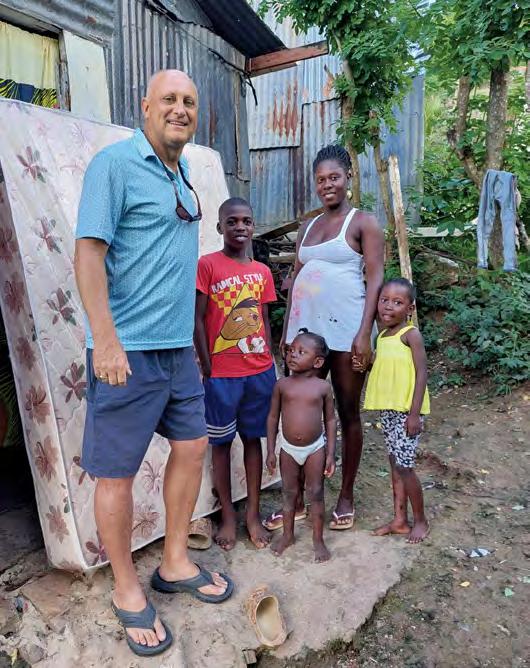
significant number of wrestl i ng alumni attended.
88
Paul Brown was promoted to executive producer of CSPAN Television Networks. He oversees the TV editorial staff and the editorial decisionmaking and programming of CSPAN’s three television networks. ■ Elaine Ward was chosen for the 2022 Power 100 List sponsored by Diversity Woman Media.

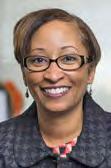
John Robert “Bobby” Hanson, 86, of Staunton, Virginia, died Oct. 26. For more than 50 years, he was a JMU math professor and retired as dean of math and science in 2017. Hanson graduated from Washington and Lee University and received his doctorate in Mathematics from Virginia Tech. He was an active member of the Valley of Virginia Council of Teachers of Mathematics, where he served on the board.

89
Brian Kurlander, an awardwinning actor and writer, completed a strenuous nineday trek up to Mount Everest’s South Base Camp in Nepal on Oct. 14.
CONTINUED ON PAGE 59 >>>
John Barkley Rosser Jr., 74, of Harrisonburg, died Jan. 10. Rosser joined JMU as professor of economics in 1977. He was a prolific author, researcher and journal editor in the fields of mathematical and behavioral economics, as well as a pioneer of catastrophe theory and chaos theory. Highly devoted to his community, Rosser was involved with the Daily News-Record and the Harrisonburg Unitarian Universalists. He will be remembered as someone who loved to share his passion for — and encyclopedic knowledge of — music, travel, food, poetry and J.R.R. Tolkien with those around him.

For more information about the faculty emeriti organization, contact Jennifer Sommers, assistant director of parent and faculty emeriti relations, at sommerjl@jmu.edu or by phone at 540-568-5255.
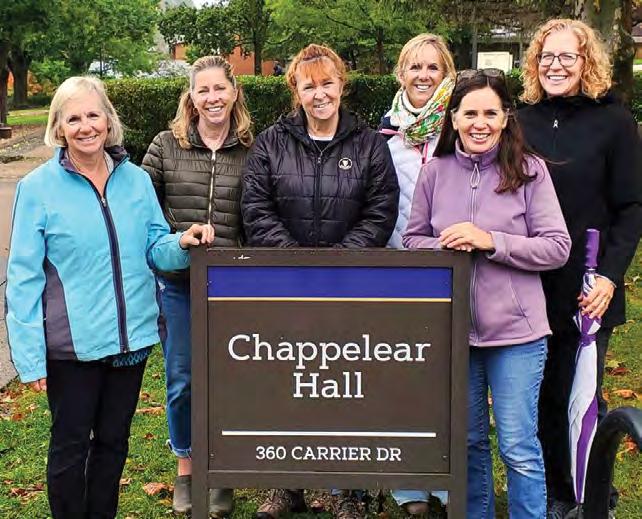
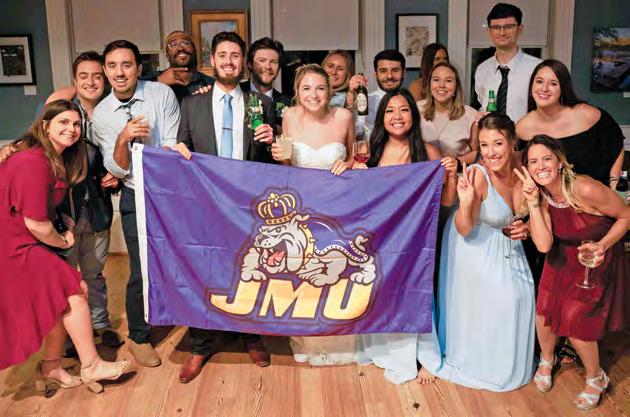
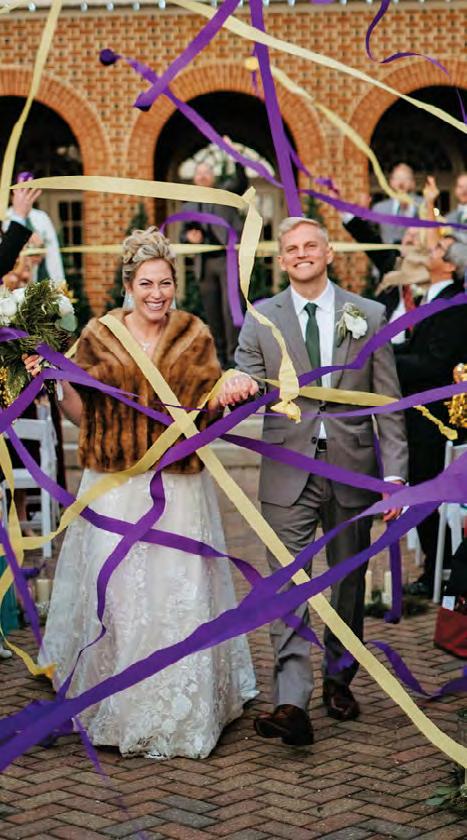

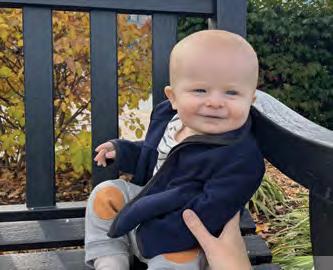
all of our alumni friends present to help us celebrate,” Richardson said.
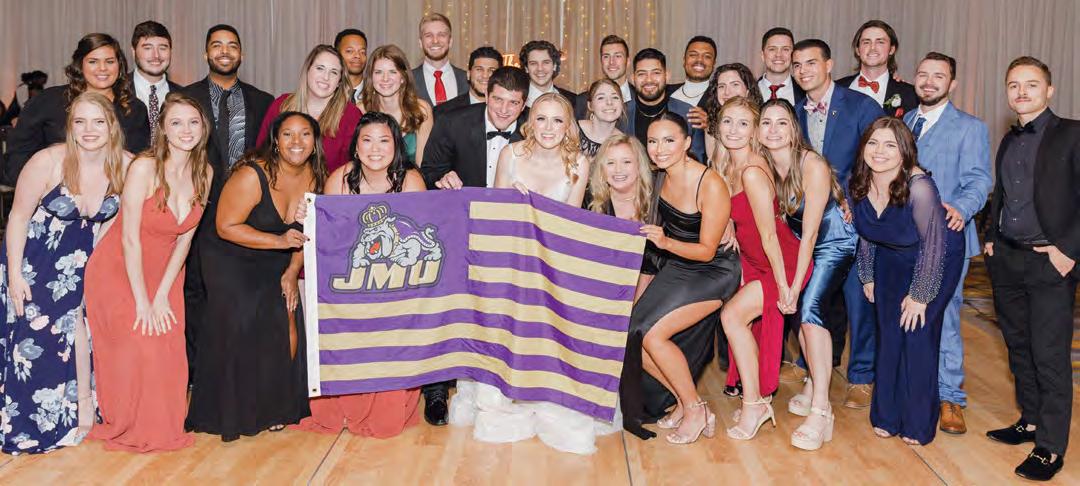
board,
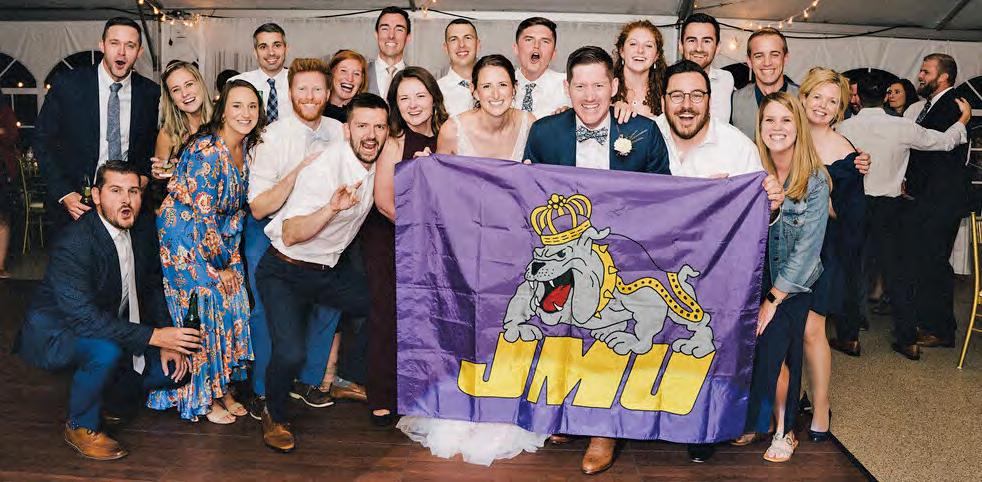
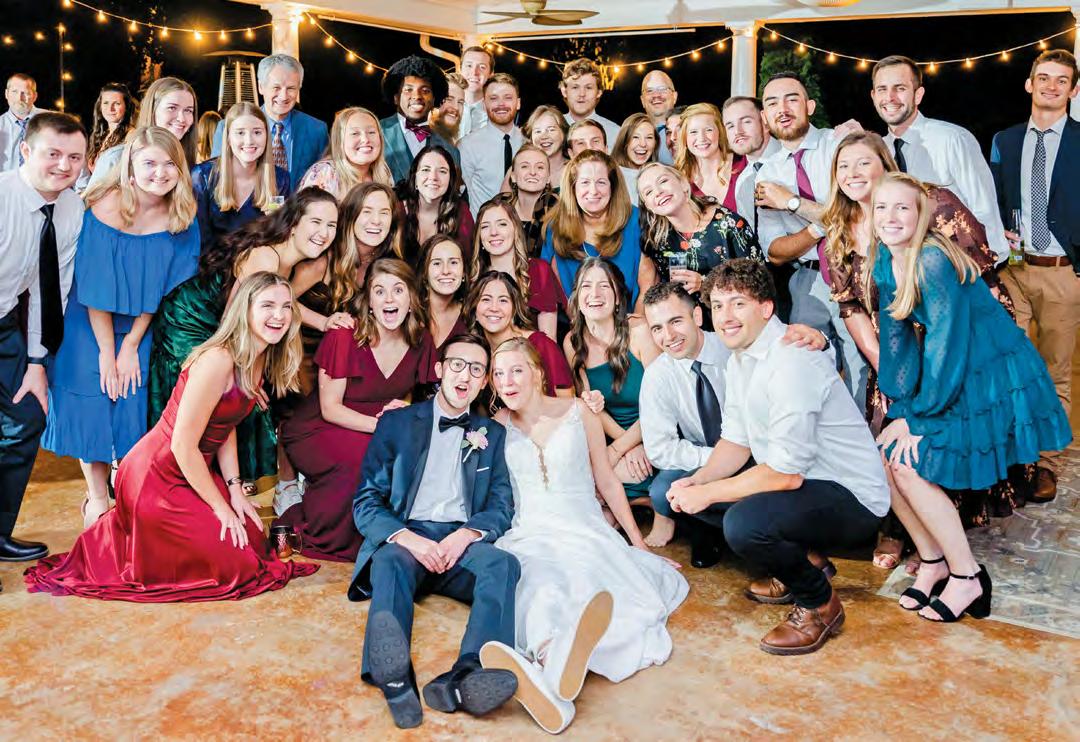 6 Courtney Peckham (’13, ’14M) and Matthew Higgins (’13) were joined by fellow Dukes on their wedding day, Oct. 8. They met freshman year in Dingledine Hall and have always been a part of the JMU community. Peckham serves on the College of Education advisory
6 Courtney Peckham (’13, ’14M) and Matthew Higgins (’13) were joined by fellow Dukes on their wedding day, Oct. 8. They met freshman year in Dingledine Hall and have always been a part of the JMU community. Peckham serves on the College of Education advisory
Known as the “POSSE” at JMU, these 1994 graduates have reunited every other year since 2012, but waited an extra year this time because of the COVID-19 pandemic. They highly recommend that young grads, even if they lose touch for a few years, find your people again and reconnect — you won’t regret it. (Back row, L-R): Jen “Gracy” Gracyalny Loyer, Chrissie “Fris” Smith Strahley, Randi Gische Laurenco, Julie Bragg, Michelle Bean Habayeb; (front row, L-R): Linda Butler Wachter, Kate Ouellette Finamore, Leigh Anne Bailey Adusei
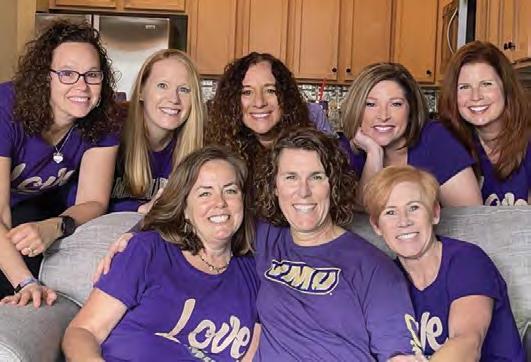
Brian Kurlander (’89) triumphantly reached Mount Everest’s South Base Camp, which sits at 17,598 feet. (Inset): During his trek, Kurlander marveled at the breathtaking peaks and clear blue skies of Dingboche, a Sherpa village.
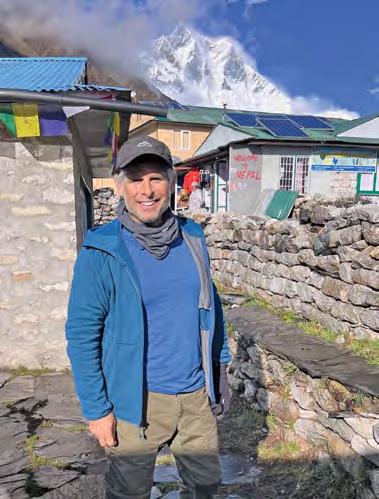
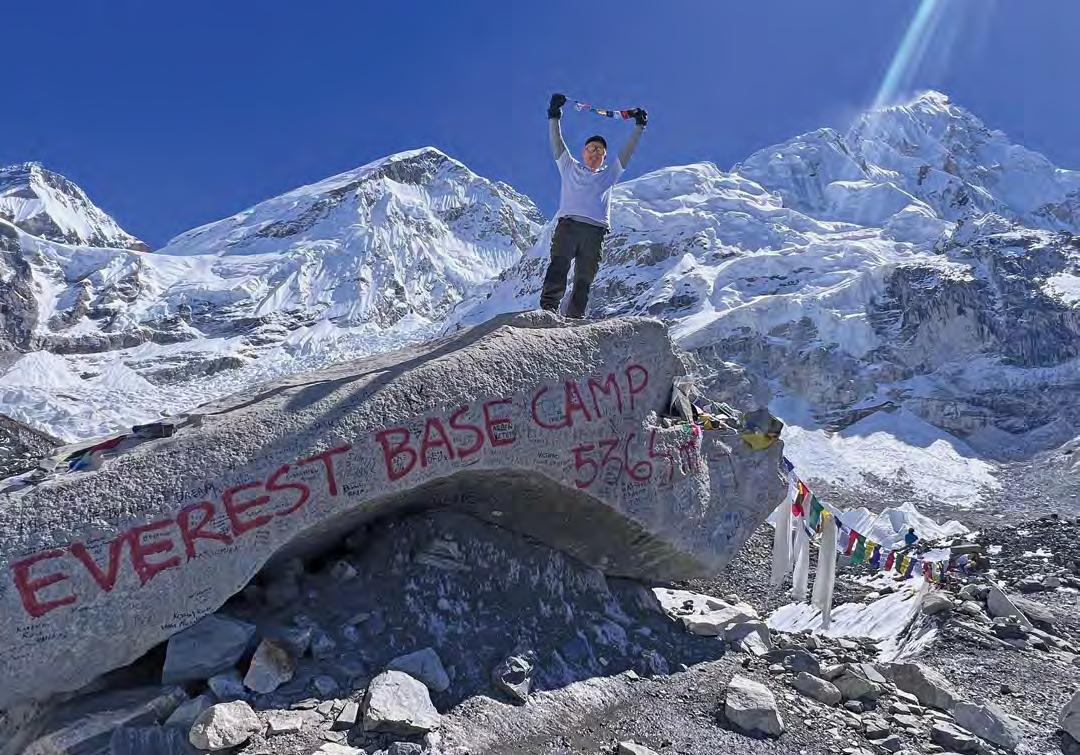
96 Laura (Ewing) Cooke celebrated 25 years in November at Nine Yards Media, an integrated media company in Alexandria, Virginia. A partner in the firm since 2004, Cooke leads strategic communications efforts for top t ier government, commercial and nongovernmental organizations.

99 Marcus Herndon was named principal at
Gensler in Charlotte, North Carolina. He specializes in interior design for professional service firms, working on more than 6 million square feet of projects across the globe. Herndon is a National Council for Interior Design Qualificationcertified interior designer, a LEEDaccredited professional and a member of the International Interior Design Association. He serves as a studio director for the Char
lotte office, leading the interior design practice in all markets.
01Susan Yeargin, April Donnelly (’98) and Stacey Hartsook (’01) completed the Colonial Relay, running 208 miles from Charlottesville to Williamsburg, Virginia. They were three of 12 female runners on the Sole Sisters: Virginia is for Runners team.
02Brett J. Miller, an attorney, was named to Michigan Lawyers Weekly’s “Leaders in the Law” Class of 2022. Based in Butzel’s Detroit office, Miller is chair of the firm’s Employment Practices Liability Insurance SubPractice. He focuses on employment and labor law as well as fair housing litigation. He frequently defends clients in state and federal discrimination, harassment, retaliation and classaction lawsuits.
He also defends clients in administrative charges before numerous governmental agencies. In addition, Miller devotes his practice to representing clients in traditional labor matters, such as grievance arbitrations and collective bargaining. He is a frequent speaker on labor and employment topics and has written numerous articles on all aspects of employment law.
M iller was named a Rising Star in 2009, 2010, 2013, 2014, 2016 and 2017 by Super Lawyers. Rising Stars are attorneys who are 40 years old or younger, or those who have practiced for 10 years or less. Two and a half percent of Michigan lawyers are named to this list every year. Moreover, he was recognized as a Michigan Lawyers Weekly “Up & Coming Lawyer” in 2015 and a Top Lawyer by DBusiness Magazine in 2014.
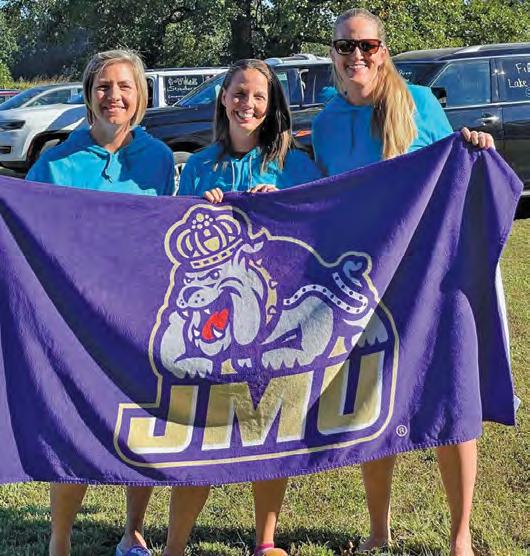
University of South Carolina, Jan. 20, Columbia, SC
Della Watkins (’82) attended the inauguration of Michael D. Amiridis on behalf of JMU. Watkins conveyed that it was a lovely event, and she enjoyed it very much. Catholic University of America, Nov. 11, Washington, D.C. Bob Wood (’78) took part in the procession for Peter K. Kilpatrick at the Basilica of the National Shrine of the Immaculate Conception. “It was fabulous, and I had a great time,” Wood said.
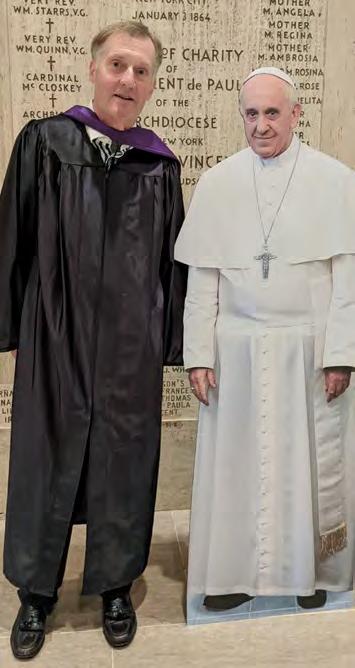
Rice University, Oct 21, Houston, TX
Meg Gentle (’96) attended the inauguration of Reginald DesRoches, the eighth president of Rice University, where she received her master’s, in Houston, Texas. She wrote: “We had a beautiful sunny day, the speeches were inspiring and I was honored to represent both organizations!”
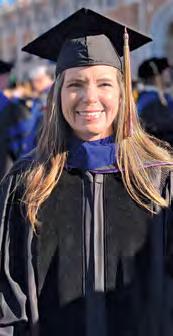
Old Dominion University, Oct. 21, Norfolk, VA
John Lynch (’91), a JMU parent and member of the JMU Board of Visitors, represented at the inauguration of Brian O. Hemphill, the ninth president of Old Dominion University in Norfolk, Virginia.
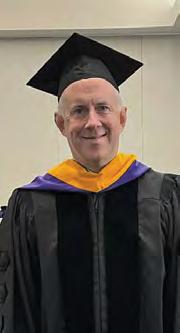
03 Courtney Thompson, president and CEO of the Greater Augusta Regional Chamber of Commerce, was selected to participate in the seventh cohort of the U.S. Chamber of Commerce Foundation’s premier business leadership program. The Business Leads Fellowship Program trains and equips leaders from state and local chambers of commerce, economic development agencies, and trade associations, with resources, access to experts and a network of peers to build their
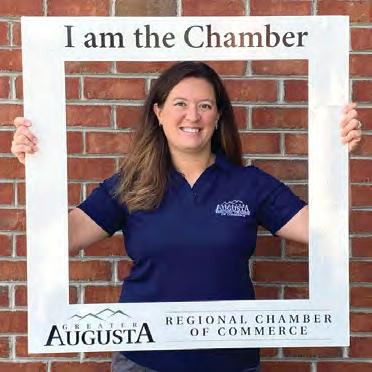
capacity to address the most pressing education and workforce challenges.
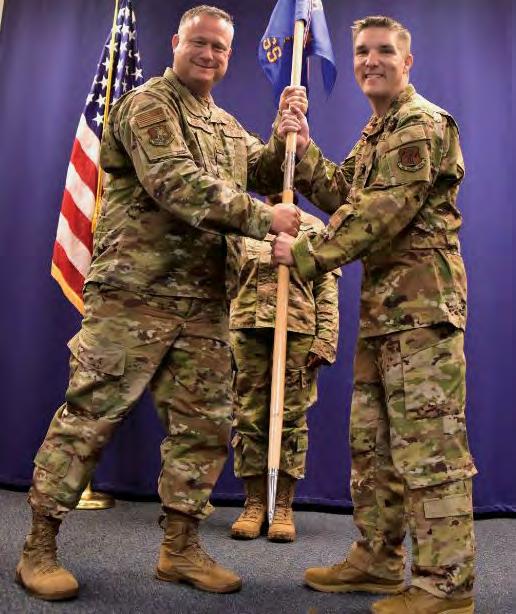
The Staff Emeriti Association just completed its eighth year as a JMU-approved organization! SEA is sponsored by the Office of Human Resources, with director Chuck Flick providing funding and staffing support. We greatly appreciate our HR connection, especially the support given by the director, his assistant, Amanda Thomas, and Julie Byers, the benefits specialist. Kathy Sarver, director of Planned Giving, serves as our liaison to the Development Office. Sarver regularly attends the SEA Steering Committee meetings and membership events. We are grateful for her advice and support.
As 2022 drew to a close and the new year began, our Steering Committee kept busy setting up luncheons and events. These included a guided tour of Paul Jennings Hall, JMU’s newest residence hall, by Holmes Browne, associate director of business operations in the Office of Residence Life, and a tour of the College of Business Learning Complex, led by CoB Dean Michael Busing and Kristen Herring, building manager.
In November, Virginia “Ginny” Soenksen, director of the Madison Art Collection and Lisanby Museum, provided a tour and curator commentary on the Japanese art exhibition on display in the gallery. To end the year, a festive holiday luncheon was held in December at CrossKeys Vineyards, which was attended by 46 members and guests.
T he sixmonth program, consisting of inp erson and virtual meetings, covers the
The SEA returned to campus in January with a tour of The Union led by director David Barnes. The tour ended at The Pantry, where Jeremy Hawkins, assistant director of Off-Campus Life, delivered an enlightening presentation on student food insecurity. The SEA is appreciative of the JMU employees who gave their time and expertise leading our tour events.
The Steering Committee’s goals for 2023 include a focus on membership development through increased communication, engaging the membership in new activities, and efforts to maintain awareness of the SEA on campus and in the community.
We are also excited to announce a new volunteer activity. The SEA will support The Pantry in the form of monetary donations and needed supplies. This project will be promoted at all SEA events, through informational emails to the membership and on SEA’s website.
Enthusiasm is strong for the continued development of the JMU Staff Emeriti Association in 2023!
(L-R): SEA members visit the Lisanby Museum and attend a tour of The Union, led by Dave Barnes.
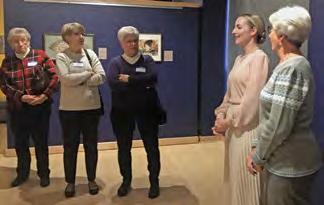
For more information about the Staff Emeriti Association and upcoming events, visit https://jmu.edu/staffemeriti or email staffemeriti@jmu.edu.
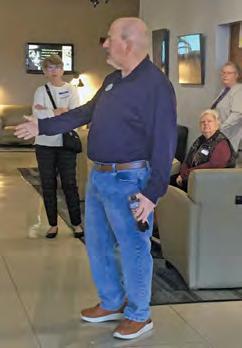
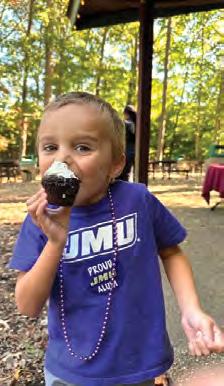
Dear Washington Semester donors,
Thank you so much for your contributions, which have allowed me to participate in the Washington Semester this spring. I am a rising senior majoring in Political Science and International Affairs, and I am thrilled about the knowledge and experiences I will gain through this program. Here is a little bit of context about me — I love to travel. Last summer I studied abroad in Israel and Palestine, which was an experience I will cherish forever. I can’t wait to go back and hope to see much more of the world in the coming years. I am ambitious about my future and hope to make a difference in the world in any way I can. I am a member of JMU’s policy debate team, a musician, a community activist and a dedicated student. Throughout my college career, I’ve always had a job while being a full-time student. I have been financially independent since leaving for college, which has been a huge weight to carry on my shoulders. I was worried about being able to support myself while in D.C., as I will likely not have the availability to work a job while interning and being a student, but this scholarship will make a massive difference in my ability to feel monetarily secure moving forward. It will help cover my living expenses while in Washington, which makes this award incredibly important for me. It will allow me to get the most out of my time in Washington and focus on setting up a launching pad for my career after graduating. It has lifted some of the weight off my shoulders, and I couldn’t be more grateful. Thank you all so much.
Best,
Abby Harlow (’24)Dear Mr. Lusk,
I would like to start off by thanking you for making this scholarship possible. My twin sister and I attend JMU out of state, which places a financial burden on my family. But scholarships like this one are what makes it all the more likely that we will be financially able to continue our education here. Just in my first semester, I have developed a sense of school pride that I have never felt before. I can tell through the multitude of resources, activities, majors, etc., that this university is truly all about the success of its students. So far, I have taken advantage of a small amount of what this school offers by being a part of the Marching Royal Dukes, attending dance classes, joining the Pre-Occupational Therapy Association and the Honors College, and most recently I signed up to participate in Empowerment3 starting next semester. I look forward to everything else I may become a part of, and the life lessons and leadership skills that I will learn. One of my main goals for attending this university was to become a pediatric occupational therapist. I think JMU is the perfect place to pursue this aspiration, and I have learned a lot about this career just by being in the Pre-OT Association. I know the academic journey to reach this goal will not be easy, but rewards like this scholarship that I receive for my hard work and dedication will keep me motivated to move forward. Once again, thank you for this opportunity, and I will always be grateful for the impact it will have on the rest of my JMU experience.
Sincerely,
Megan Cropper (’26)(L-R): Lt.
is a
entire talent pipeline, including early c hildhood education, K12, postsecondary education and workforce development.
“I am very excited to participate in this fellowship program, and bring back innovative and meaningful ideas we can use in our community to address the education and workforce issues we’re currently facing,” Thompson said. ■ Lt. Col. Jeffrey Cretz, a Media Arts and Design major, recently assumed command of the Delaware Air National Guard’s 166th Operations Support Squadron, which supports an airlift squadron that flies eight C 130H aircraft conducting tactical airdrop, tactical airland and aeromedical evacuation missions. 06 Kimberly A. Koves, a Political Science major, was named a shareholder in 2021 of the Guerra King law firm in Tampa, Florida. Koves focuses on complex commercial disputes, with an emphasis on the representation of financial services institutions and profession
als in federal and state court, Financial Industry Regulatory Authority and American Arbitration Association arbitration, and regulatory proceedings. She has been recognized as a Rising Star in securities litigation by Florida Super Lawyers since 2016. She is an associate member of the C.H. Ferguson M.E. White American Inn of Court and serves on the board of the Federal Bar Association, Tampa Bay Chapter, as co chair of the Membership Committee. Koves is also active in other local bar associations, including the Hillsborough County Bar Association and the Hillsborough Association for Women Lawyers, and is attorney ad litem through Crossroads for Florida Kids.
Lt. Erin Stehle, a 12year veteran of the Harrisonburg Fire Department, earned the designation of fire officer conferred by the Commission on Professional Credentialing, a division of the Center for Public Safety Excellence. She received her designation in March at the Center for Public Safety Excel
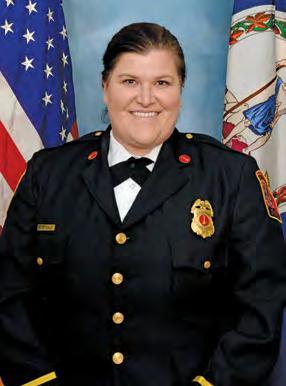
lence Conference in Orlando, Florida. Stehle, who majored in Health Sciences, is known widely in Harrisonburg for her work with people of all ages on community risk reduction.
13
Carol Smith, a graduate of the Physician Assistant Studies program, represented JMU in Antarctica for a week last November. Seeing the penguins and glaciers were highlights of her trip.
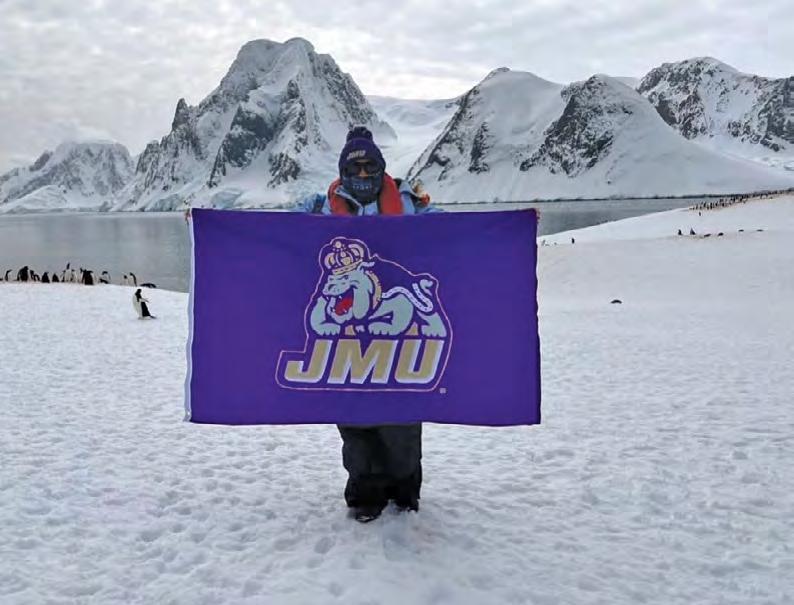
14
Addy Morrison, a Media Arts and Design major, won an Emmy in September for Outstanding Promotional Announcement for her work with National Geographic on the documentary “9/11: One Day in America.”
17 Cassidy E. Jackson, a Chemistry major, joined the Institute for Defense Analyses in Alexandria, Virginia, in November as a research staff member in the Operational Evaluation Division of IDA’s Systems and Analyses Center.
20 Jordan Tautges, a Health Sciences major, was appointed to the Fairfax County Commission for Women in May 2022. The commission empowers and promotes equality for women and girls in Fairfax County, Virginia.
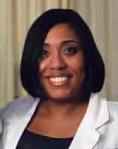
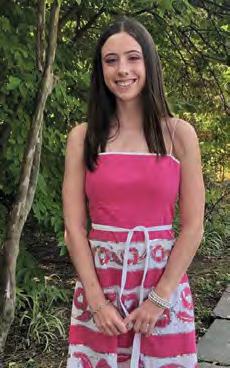
(Clockwise): Carol Smith (’13) (inset) visited Antarctica; Jordan Tautges (’20); Dukes celebrated Hawaiian Day at Nansemond-Suffolk Academy in Suffolk, Virginia. (Back row, L-R): Kimberly Work (’03), Jessica Porter (’15, ’16M), Lauren McGhee (’97), Daina Larson (’21P) and Ann Davies (’82); (Front row, L-R): Carrie (Anderson) Barbier (’04), Emily Mistr (’05, ’06M) and Beth Miller (’90, ’22P)
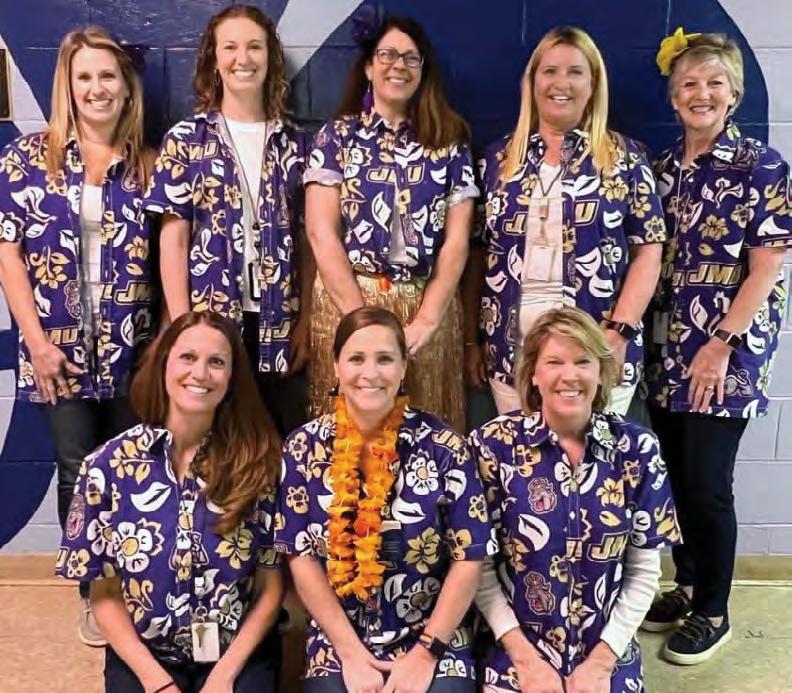
Get exclusive benefits at Hotel Madison, and stay on campus like you used to. Sign up in the top menu of hotelmadison.com for full details and to start receiving these benefits:

n 12% off from our Standard Daily Rate
n 10% discount at Montpelier Restaurant and grace+main coffee shop (excludes alcohol)
n Priority access to JMU and/or Hotel Madison-sponsored events held at the hotel
Football weekends
The place to be with live music and walkable to the stadium!
Reserve the Quills lobby bar for your next gathering. Great for reunions! Neapolitan pizza now available, too.
Check our website for the list of performances.
Keep your eye out for future issues of Madison magazine with dates and details of additional events such as our upcoming concert series. Follow us on Facebook and Instagram!
■ Free membership
■ More than 50 alumni chapters located worldwide

■ Networking resources
■ Reunion and Homecoming programming
■ Exclusive alumni-only communications
154,218 Total living alumni
68% of all Dukes need some kind of assistance to attend JMU. The Women for Madison Amethyst Circle mobilizes collective giving to award $1 million in needbased scholarships every two years. JOIN US!
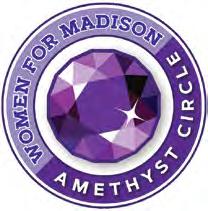
30% of JMU applicants are from low-income families. The Women for Madison Amethyst Circle mobilizes collective giving to award $1 million in need-based scholarships every two years. JOIN US!
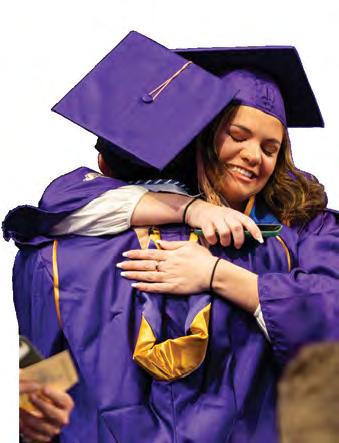
A Washington, D.C., restaurant kitchen worker asked for time off for prenatal medical appointments, then called out because of morning sickness. Her boss illegally fired her for these absences. The Latina mother turned to First Shift Justice Project, which helped her negotiate a settlement with the employer for back pay and damages.
“People don’t know how to stand up for themselves and pursue their rights, and employers are violating the law with impunity,” said Laura Brown (’93), a Political Science and Public Administration major who co-founded the nonprofit nine years ago. Her mission, as always, is to give others a hand up in the workplace.
Inspiration came in part from her involvement with JMU Catholic Campus Ministry, her classes with Modern Catholicism professor William O’Meara and classes with Bob Holton (’73, ’89M), former assistant town manager of nearby Bridgewater, Virginia. Holton believed in unglamorous public service. “That’s the kind of thing that really affects people and has meaning,” Brown said.
First Shift Justice Project has advised nearly 4,500 low-wage workers, focusing on caregivers and working mothers, in its quest to provide legal services and advocacy to prevent job loss and maintain workers’ and their families’ health.
Brown’s first job after Madison was with the Jesuit Volunteer Corps, teaching school in East Los Angeles. Several nonprofit stints led to a degree from Santa Clara University School of Law, after which she learned Spanish in Bolivia, worked with labor unions in D.C., joined the D.C. Employment Justice Center and ultimately co-founded First Shift.
A year ago, “in recognition of outstanding dedication to civil rights, equality and justice,” Brown accepted the Employment Lawyer of the Year award from the Metropolitan Washington Employment Lawyers Association.
Supporters mention Brown’s leadership in the passage of the D.C. Domestic Workers Bill of Rights, the joy she took at First Shift’s “Dance Like a Mother” fundraiser and how her Spanish comes in handy with Latin American immigrants. Brown simply explained, “We’re here to help people who fall through the net.”
Ellen Ryan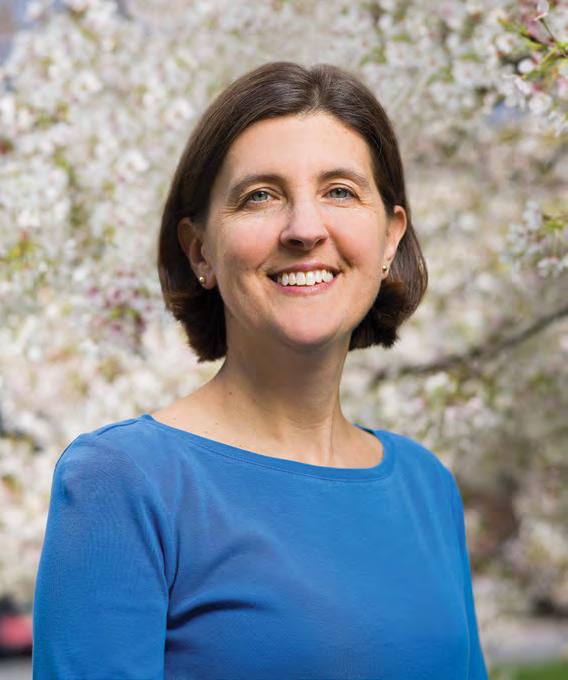
“We’re here to help people who fall through the net.”
— LAURA BROWN (’93)